




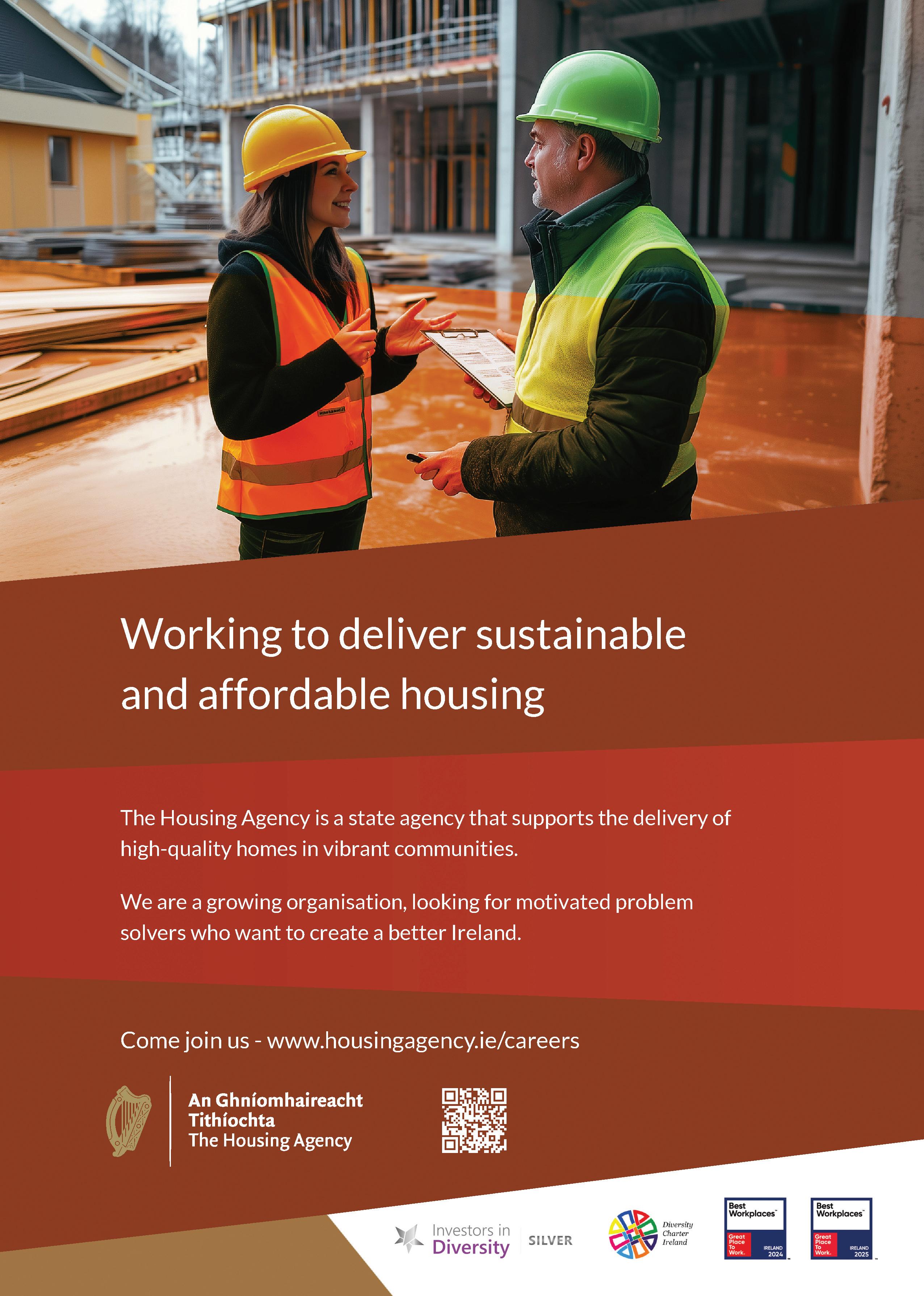














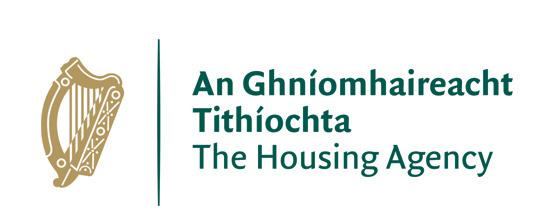

2026 Croke Park, Dublin





eolas Magazine is organising its 11th annual Housing Ireland Conference, which will examine the key challenges facing Ireland’s housing policymakers and senior practitioners across the sector. The conference will take place in March 2026 in Croke Park, Dublin.
Sponsorship and exhibition opportunities
There are a number of opportunities for interested organisations to become involved with this conference as sponsors or exhibitors. This is an excellent way for organisations to raise their profile with a key audience of senior decision-makers from across the housing sector in Ireland. For further information on how your organisation can benefit, contact Sam Tobin on 01 661 3755 or email sam.tobin@eolasmagazine.ie


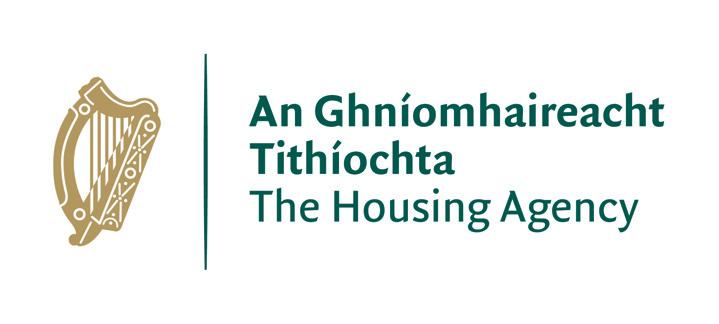
The housing sector in Ireland, like elsewhere, is facing a series of complex challenges around delivery. A growing population, an expanding economy, changing housing requirements to cater for smaller household sizes, and an ageing population are all driving increased demand.
Increasing housing supply and improving affordability are key priorities for The Housing Agency. We do this through partnering with our key stakeholders to provide our expertise, support, and resources.
The Agency is supporting cost rental housing through the Cost Rental Equity Loan (CREL) and the Secure Tenancy Affordable Rental (STAR) schemes. We are assisting local authorities through the Land Acquisition Fund to deliver social housing and to bring vacant and derelict sites back into use through advice on compulsory purchase. These initiatives are having a positive impact on the ground.
Ambitious targets have, quite rightly, been set for new homes and those working in the sector are striving to reach these goals. Nevertheless, challenges remain.
The viability of delivering apartments for owner occupiers is a particular challenge and is something we see through our work on the Croí Cónaithe (Cities) scheme. Apartment schemes have larger structural elements, such as lifts or underground parking, which can push up the cost of construction and make schemes, that have already been granted planning permission, unviable.
Most unbuilt homes on extant planning permission in our main cities are apartments. However, through CCC, we are bridging the viability gap and progress is being made. We are unlocking existing planning permissions and the first apartments to be delivered under the scheme are now coming to the market.
Related to the challenge of viability, is that of affordability, particularly delivering homes for those on incomes just above the social housing income eligibility threshold. New affordable homes are being delivered through the local authority Affordable Purchase Scheme, and the First Home Scheme. Local authorities, approved housing bodies, and the Land Development Agency are delivering affordable purchase and rental homes. Delivering new build affordable homes, in particular apartments, requires state support.
A third, and inter-connected, challenge is the availability of zoned and serviced land. Local authorities have warned that without the right land in the right locations, delivery targets are at risk. It is hoped the Revised National Planning Framework will boost the availability of zoned land for residential purposes.
Tackling our housing challenges requires a concerted effort with all stakeholders playing their part. At The Housing Agency, we are committed to meeting these challenges and helping to build a sustainable housing future for Ireland.
Martin Whelan Chief Executive The Housing Agency

As Minister for Housing, my aim is to get building the homes we need for people – places for people to grow up, grow old, and build community. It is essential for all of us as a society, now and into the future, and I am treating it as an emergency, writes Minister for Housing, Local Government and Heritage, James Browne TD.



“The Housing Commission, the ESRI, the OECD, and the IMF have all identified the current rent control system as an impediment to the supply of new private rental accommodation.”
Minister for Housing, Local Government and Heritage, James Browne TD
The question of supply, and how we invigorate it, is complex, multifaceted and requires crossgovernment mechanisms as a response. There are strands, many simultaneous, that are part of the housing jigsaw. In the last few weeks [June 2025], I have made significant moves towards getting our sector moving.
One piece of that jigsaw is our rental sector.
The private rental sector is a crucial part of our housing mix across the country, particularly in our urban centres. The sector has seen substantial growth in recent years, in fact the Residential Tenancies Board report that private tenancy numbers rose by 7.6 per cent annually to 240,964 in Q4 2024, while private landlord numbers rose by 4.5 per cent annually to 105,594.
However, the system has not been optimal –for renters or potential new landlords. Investment market reports indicate that very little private investment of scale has gone into

the development of new build homes for the private rental sector since mid-2022. I have heard and understood the challenges – and changes that needed to be made –from affordability pressures for tenants to a dwindling supply of rental accommodation.
In response, I have delivered an ambitious package of rental sector reforms and significant improvements in both regulations and incentives to attract investment to boost the supply of new apartments for our rental market across the country.
The major reforms announced on 10 June 2025 are now underpinned by the newly published Residential Tenancies (Amendment) Bill 2025 approved by government on 17 June. The Bill reflects a rebalancing of priorities to strengthen protections for renters while simultaneously encouraging private investment, particularly apartment development.

A cornerstone of the reform package is the nationwide extension of rent controls. Previously, rent pressure zones (RPZs) –which capped annual rent increases at 2 per cent or the level of inflation (whichever was lower) – applied to around 83 per cent of tenancies. As of 20 June 2025, RPZ restrictions now apply across the entire country, providing all renters with the same degree of protection.
This move follows The Housing Agency’s review of RPZs, which found that the uneven application of rent controls created uncertainty for tenants and a disincentive for investment. The Housing Commission, the ESRI, the OECD, and the IMF have all identified the current rent control system as an impediment to the supply of new private rental accommodation.
Simplifying the regulation will provide certainty, clarity, and encourage investment. In order to stimulate investment and keep existing landlords in the market, resetting of rents to market value for new tenancies will

be allowed as part of the reform of rent controls. Resetting rents will only be allowed when a tenant leaves voluntarily, breaches their obligations, or the dwelling no longer suits the tenant’s needs. It will not be allowed for ‘no fault evictions’.
Critically, the Government has reaffirmed that the cap on rent increases at 2 per cent will remain in place even during periods of high inflation.
From 1 March 2026, larger landlords –defined as those owning four or more tenancies –will no longer be permitted to terminate a tenancy without grounds where the tenant has complied with their obligations. This is an effective phasing out of ‘no fault evictions’.
For smaller landlords (those with three or fewer tenancies), new rolling six-year tenancies will be introduced. During each sixyear term, termination will only be permitted in limited and clearly defined circumstances
“We have committed to achieving a stable and predictable policy to attract and retain the private investment needed to meet our housing targets.”
such as personal hardship, requirement of the property for a close family member, or serious issues with the tenancy.
At the end of each six-year cycle, grounds for ending a tenancy will include sale, substantial renovation, change of use, or family use – echoing provisions in existing legislation but with tighter conditions.
These measures are designed to enhance the security of tenure while still offering landlords necessary flexibility.
The changes are backed by the Residential Tenancies (Amendment) Bill 2025, which was approved by government on 17 June 2025 for urgent enactment. The legislation extends existing RPZs and ensures all tenancies are covered by rent increase restrictions until 28 February 2026, before the broader reforms come into effect from 1 March 2026.
Our latest reforms mark a significant evolution in the country’s approach to rental policy, addressing longstanding concerns around tenant security and supply. By pairing increased protections with investment incentives, the reforms aim to stabilise the sector and represent meaningful steps towards a more balanced and resilient rental market – one that works for both tenants and landlords in the long term.

Supply: Supporting broader housing delivery
While regulatory reform is critical, protections for renters must be matched by greater investment and increased housing supply. Increasing the supply of private rental accommodation is crucial in supporting the Government’s overall housing targets and addressing affordability in the private rental sector.
Investment market reports indicate that very little private investment of scale has gone into the development of new build homes for the private rental sector since mid-2022. Numerous market and expert reports have all identified the current rent control system as an impediment to the supply of new private rental accommodation.
Therefore, we have committed to achieving a stable and predictable policy to attract and retain the private investment needed to meet our housing targets. Given the nature of investment decisions and large-scale residential development, increased supply of much needed apartments for the private rental sector will follow, but it will take time for this supply to become a reality.
Looking ahead, I will publish a new national housing plan in the coming months to consolidate these supplyside initiatives and a roadmap to scale up the next phase of housing delivery.


chair, Gerry McDonogh, contextualises the legacy and impact of cooperative housing in Ireland, and its untapped potential to helping solve the housing crisis.







“Cooperatives do not merely build homes, they build futures.”
Gerry McDonogh, Chairperson, Co-operative Housing Ireland
Underpinned by a legacy of almost two centuries, Ireland’s modern cooperative housing model gathered momentum from the 1950s into the 1970s and 1980s. Amid prevailing housing shortages, local authorities provided low-cost land and accessible loans to empower working- and middle-class families to build and own homes collectively.
“This was a lifeline for those who fell outside both public housing eligibility and the affordability of the private market,” McDonogh observes.
In fact, by the 1970s, a total of 5 per cent of all homes built in the State were delivered by co-operatives. As well as establishing itself as a third branch of delivery – alongside private and public –formal support structures emerged, one of which was the National Association of Building Cooperatives (NABCo), now known as Co-operative Housing Ireland.
NABCo sought to coordinate cooperative housing across the country, advocate for supportive policies, and provide technical and administrative support. In a strategic pivot, during the 1990s and early 2000s, Co-operative Housing Ireland consolidated smaller co-operatives to scale its operations and provide long-term, affordable social rental housing.
“Today, Co-operative Housing Ireland is a leading approved housing body, providing over 6,000 social-rented homes,” its Chair outlines, adding: “Our mission is to provide homes cooperatively, work in partnership to create vibrant and sustainable communities, advocate for the delivery housing cooperatively, and support cooperative and community-led housing initiatives.”
A distinct characteristic of Co-operative Housing Ireland’s work is member democracy. This means that member tenants are not “passive recipients of housing” but are active members of local co-operatives.

“Cooperative housing models elsewhere in Europe can provide the legal, financial, and planning frameworks that nurture cooperative growth.”
“They contribute to governance, participate in decision-making, and help shape the character of their communities,” explains McDonogh.
“This democratic ethos remains a cornerstone of Co-operative Housing Ireland’s identity.”
Providing more than ‘bricks and mortar’, as relayed by McDonogh, the raison d’être of housing cooperatives in Ireland is to “offer security of tenure, affordability, and social capital through participation and mutual support” while “fostering a culture of care and stewardship”.
“Many of Co-operative Housing Ireland’s member tenants emphasise the transformative opportunities opened to them following their move into cooperative housing. For example, the transition to stable, high-quality homes has opened doors to employment, education, and better health outcomes, emphasising the fundamental link between housing and personal and community development.”
However, after reaching its apex in the 1970s, cooperative housing has declined to its nadir and now represents less than 1 per cent of total housing delivery. This decline, the CHI Chair notes, is linked to policy trends, changes in the lending practices of banks and building societies, and an increased reliance on market-led solutions.
Amid the housing crisis, the cost of housing has increased by 115 per cent in a decade according to Society of Chartered Surveyors Ireland (SCSI) figures. As such, homeownership has again become “unattainable for a significant number of households”.
In this context, McDonogh believes that the potential for a resurgence in cooperative housing is “very real” and that it “should be central” to meeting needs across social, cost rental, and homeownership sectors. In addition to supporting the Housing Commission’s recommendation that 20 per cent of national housing stock be social and affordable rental homes, the co-operative model would also deliver greater affordability for homeowners.
“While Co-operative Housing Ireland’s focus has been on the delivery of social-rental history shows
us the potential of the model to provide affordable homes across all tenure types.
“The Report of The Housing Commission highlights the role of AHBs, such as Co-operative Housing Ireland, as critical partners in building an inclusive, sustainable housing system.
“Co-operative Housing Ireland’s ability to deliver long-term affordability, stability, and tenant participation makes us uniquely suited to the State’s current housing environment,” he says.
Simultaneously, McDonogh identifies a renewed interest in the Community Land Trust (CLT) model whereby land is held in perpetual community ownership, decoupling it from market value.
“This model often complements cooperative housing, securing multigenerational affordability and aligning closely with values of collective ownership and stewardship. With appropriate incentives and support, cooperative housing could again play a transformative role in meeting the country’s housing demand,” he observes.
Identifying Switzerland, Germany, and the Netherlands as exemplars of housing systems with significant elements of cooperative and community-led housing, the CHI Chair suggests that there are transferable lessons for Ireland.
“Cooperative housing models elsewhere in Europe can provide the legal, financial, and planning frameworks that nurture cooperative growth,” he says.
“In Zurich, for example, almost one-third of all homes are cooperatively owned or managed. This is underpinned by robust municipal policies and access to affordable finance. Meanwhile, Germany’s Baugruppen demonstrate how resident-led development can yield high-quality, sustainable, and inclusive housing.”
Reflecting its commitment to environmental responsibility and a recognition that sustainable homes contribute to enhance quality of life, sustainability is now at the core of Co-operative Housing Ireland’s work.
Launched in 2022, the Improving Warmth and Wellbeing programme, Co-operative Housing Ireland’s flagship initiative, aims to deep energy




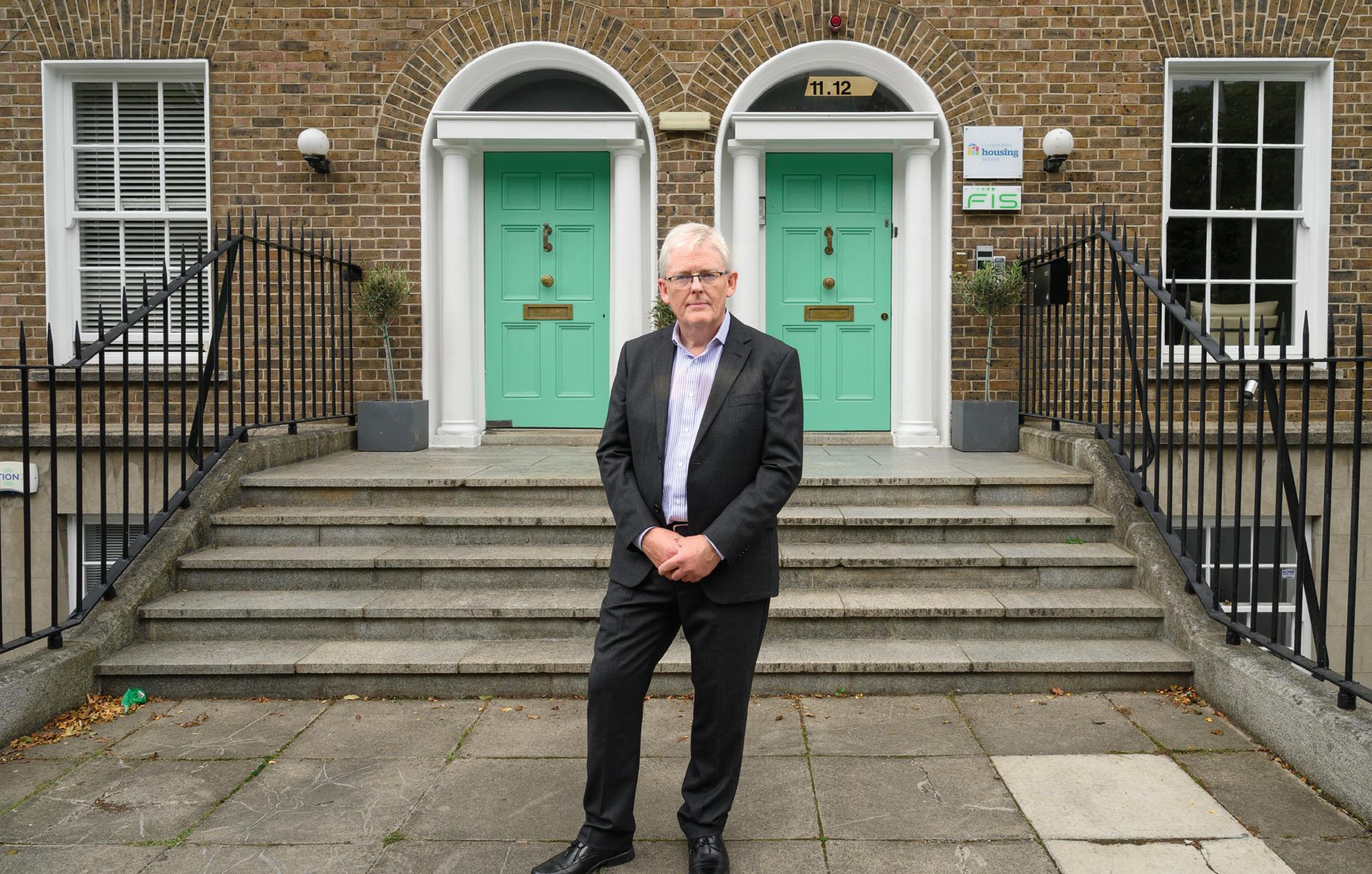
retrofit 216 homes up to a minimum BER A3 rating.
“Delivered in partnership with the Sustainable Energy Authority of Ireland (SEAI), Improving Warmth and Wellbeing programme is about more than kilowatt-hours. Rather, it is about affording wellbeing and dignity to households impacted by fuel poverty. Households comprising older people and children have reported immediate improvements in comfort, health, and wellbeing,” McDonogh emphasises.
Co-operative Housing Ireland recognises member tenants as partners, not just beneficiaries. As such, a key tenet of its retrofitting initiative is tenant engagement that seeks to actively involve residents from the beginning of the process to its completion, whether via pre-works consultation, workshops on energy use and new technologies, or aftercare and support services.
“This model has ensured that retrofits are both technically and socially successful and our work has been recognised through several industry awards, including the Striving for Sustainability Award (2025), the Net Zero in Housing Award (2023), and Retrofitting Project of the Year (2022),” the Chair notes.

Co-operative Housing Ireland’s advocacy work ranges from highlighting the need for increased funding in the not-for-profit housing sector to address current and legacy funding shortfalls, to outlining a legislative and policy framework to unlock the benefits of cooperative and community led housing.
However, while McDonogh emphasises the success of those working to promote the housing cooperative model as demonstrated by the inclusion cooperative and community land trusts in the Affordable Housing Act 2021, he acknowledges: “We are still waiting for the necessary policies to make this a reality.”

In summary, the Co-operative Housing Ireland Chair reiterates that while the cooperative model has a legacy of housing delivering Ireland, its potential remains untapped.
“Rooted in values of community, democracy, sustainability, and solidarity, the cooperative model offers a solution to the housing crisis that meets both material and social needs.
“Now is the opportunity to replicate successes of the past. With strong State backing, clear legislative support, and equitable access to finance and land, cooperatives can once again reach their potential. Cooperatives do not merely build homes, they build futures. In this time of crisis, that is exactly what Ireland needs.”
A native of Galway city, Gerry McDonogh is the chairperson of the CHI Board. He is a chartered accountant and experienced finance professional having spent his early career working with PwC and subsequently spent 28 years with Musgrave Group in senior finance leadership positions before retiring in 2021. He has extensive experience in financial risk management, corporate governance and regulatory compliance. McDonogh is the Chairperson of Elevate Credit Union, a not-for-profit regulated financial institution and lives in Cork with his family.



The 2025 Programme for Government (PfG), Securing Ireland’s Future, sets out an approach to housing emphasising the importance of increasing supply, improving affordability, and expanding public housing provision. With the specifics of the next iteration of the Government’s housing plan as yet to be published, Ciarán Galway and Joshua Murray reflect on the challenging context of the housing crisis.
The Government has committed to maintaining housing as the central policy priority, with a broad suite of measures aimed at boosting completions, improving rental affordability, and accelerating public housing delivery.
The core ambition of the Government’s housing policy is the delivery of 303,000 new homes by 2030, a target first outlined by the revised National Planning Framework. To reach this goal, annual average delivery is required to rise incrementally from a target of 41,000 in 2025 to 60,000 by 2030, inclusive.
Key commitments in the 2025 PfG include:
• introducing a new, all-of-government national housing plan to succeed Housing for All, underpinned by a multiannual funding commitment;

• increasing construction capacity to build 303,000 new homes by the end of 2030 as per the revised housing targets;
• investing in a new Towns and Cities Infrastructure Investment Fund;
• further capitalising and enhancing the powers of the LDA;
• retaining and revising the Help to Buy scheme out to 2030;
• expanding the First Home scheme out to 2030;
• “working towards” ending homelessness by 2030; and
• building an average 12,000 new social homes per annum;


“Only a radical reset of housing policy... will deliver at scale the affordable homes that workers and families so desperately need.”
Sinn Féin housing spokesperson, Eoin Ó Broin TD
The Government has also outlined plans to review the long-term housing targets and associated demand projections. Housing Ireland Magazine understands that a successor strategy to Housing for All is scheduled to be published by September 2025 at the earliest.
Despite the Government’s stated focus on increasing supply, delivery levels in recent years continue to fall short of what is needed to meet these targets. The gap between policy ambitions and on-the-ground construction figures remains a significant challenge.
According to the Central Statistics Office (CSO), 30,330 homes were completed in 2024, representing a 6.7 per cent decrease on the 2023 figure of 32,695 completions. The reduction was most notable in apartment deliveries, which fell by 24.1 per cent in 2024 compared to the previous year.
While the original Housing for All target for 2024 was 33,450 homes, this figure was not met, with only 30,330 new dwelling completions recorded by the CSO. In addition, the delivery level was well below the figure of 40,000 new units that was repeatedly referenced by senior government ministers during the 2024 general election campaign.
Now, the Central Bank has forecast housing completions of approximately 32,500 homes in 2025, significantly below the initial government target of 41,000 homes for the year. The new Minister for Housing, James Browne TD, has since described the 41,000 figure as “unrealistic”, and an updated annual target has yet to be confirmed.
The most recent annual dwelling completion figures show that housing output has remained relatively consistent since 2021, but consistently short of the levels now considered necessary to address both existing housing needs and future population growth.
Total dwelling completions in the last five years were as follows:
• 2024: 30,330 completions (against an overall target of 33,450).
• 2023: 32,695 completions (against an overall target of 29,000).
• 2022: 29,851 completions (against an overall target of 24,600).
• 2021: 20,433 completions.
• 2020: 20,676 completions.
Figures released in April 2025 confirmed that the previous government failed to once meet its social housing delivery targets.
In the last three years, government has missed its own targets (9,000 in 2022, 11,820 in 2023, and 12,930 in 2024) for social housing delivery.
In 2024, 10,595 social homes were delivered. This figure comprises 7,871 new builds, 1,501 acquisitions, and 1,223 delivered via leasing programmes. In spite of a Housing for All target of 9,300 new build social homes, new build delivery was 15 per cent below this and actually decreased by 3 per cent in 2024 when compared with 2023.
Meanwhile, an additional 1,117 households qualified for social housing support (net need) in 2024 when compared with 2023, bringing the total number of qualified households to 58,824.
In response to the Social Housing Construction Projects Status Report for Q4 2024, published 23 April 2025, Social Democrats’ housing spokesperson, Rory Hearne TD, insisted: “Today’s social housing figures make a mockery of the Government’s claims that it is doing everything it can to solve this worsening crisis.”
In 2023, 11,939 social homes were delivered. This figure incorporates new build units (8,110), acquisitions (1,830), and leasing programmes (1,999). However, as per Housing for All, the projected new build social housing target for 2023 was 9,100, while the overall target was 11,820 social homes (excluding RAS and HAP).
Similarly, in 2022, a total of 10,263 social homes were delivered, of which 7,433 were new builds, 951 were acquisitions, and 1,870 were leased. This total also fell below Housing for All’s target of 9,000 new build social units for 2022, and the overall target of 13,130 social units (excluding RAS and HAP).


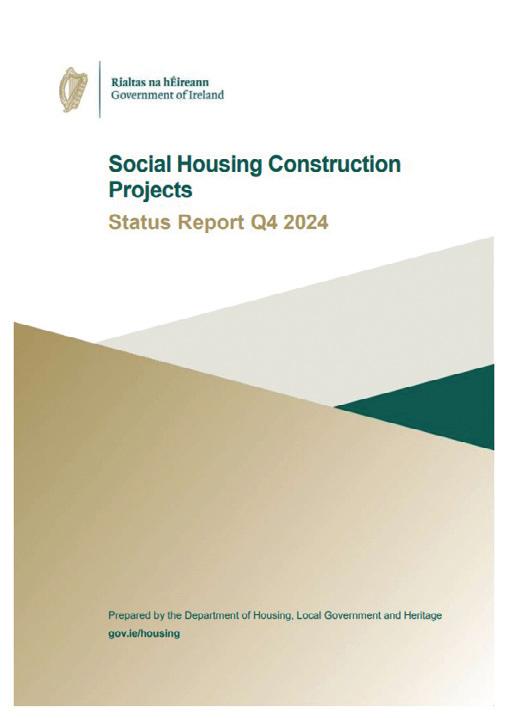
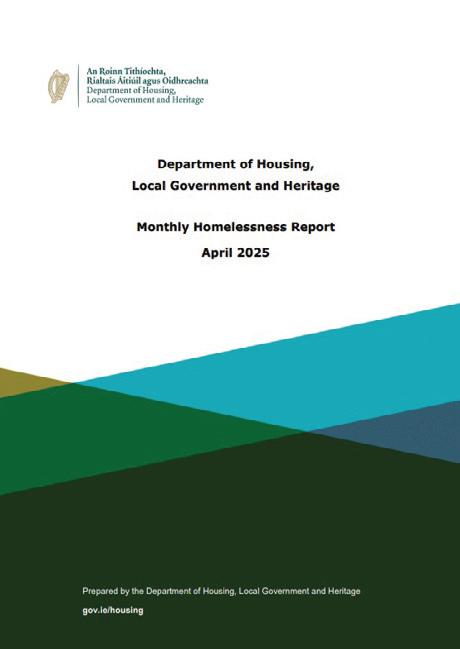

McDonald TD, speaking in Leaders’ Questions in the Dáil on 5 February 2025, described the Government’s projection of 40,000 homes as an attempt to mislead the public.
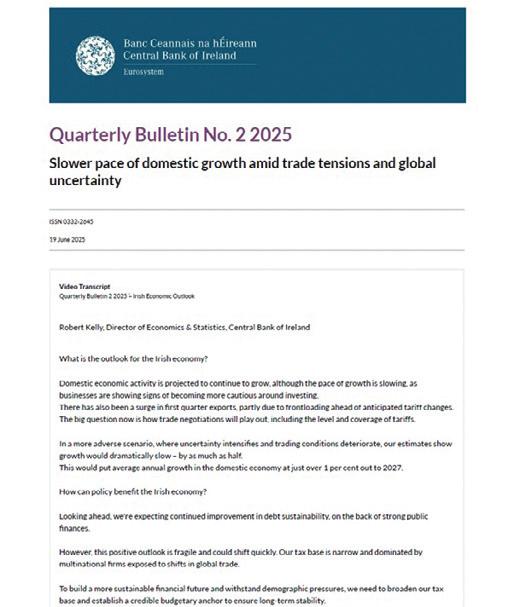

“Report after report proves this government lacks the political will to get to grips with the housing crisis.”
The 2024 general election campaign –the end of which saw Fianna Fáil and Fine Gael returned to office – saw housing remain a significant topic of debate. However, the introduction of immigration into national discourse, alongside the repeated citation of dubious dwelling completion delivery projections by senior government ministers, meant that the verbosity with which housing was debated in the 2020 campaign was not repeated in 2024.
On 25 August 2024, then Taoiseach Simon Harris TD said: “This year [2024], we will exceed our housing targets with almost 40,000 homes built.”
On 24 October 2024, then-Housing Minister Darragh O’Brien TD responded to a question addressed to him in the Dáil by Sinn Féin’s Eoin Ó Broin TD saying: “I still confidently predict – the Deputy and his colleagues in Sinn Féin will be disappointed – that it will be in the high 30,000s to low 40,000s this year.” The official Housing for All target at that point was 33,450 homes.
On 11 November 2024, O’Brien posted on X (Twitter): “Housing delivery has
risen from 20,000 in 2020 approaching 40,000 homes this year.” On the following day, then-Finance Minister Jack Chambers TD stated in a television debate: “This year we’ll have over 35,000 homes being built.”
However, on 6 November 2024, an internal Department of Finance briefing, Monthly Housing Update November 2024, circulated to Minister Chambers, indicated that housing completions for the year were expected to be similar to or slightly lower than the 32,695 completions achieved in 2023. The document, later released under the Freedom of Information Act, said that completions were broadly aligned with the Central Bank’s revised forecasts.
The general election was held on 29 November 2024, with the two main parties in the then-triparty coalition returned to office just two seats short of an overall majority in the Dáil.
When the CSO released its final dwelling completions data for 2024 in January 2025, it confirmed that only 30,330 homes had been completed in the year, significantly below the figures cited during the election campaign.
Following the publication of the final figures, Sinn Féin leader Mary Lou
Taoiseach Micheál Martin TD responded that the statements made during the campaign were based on “a genuine belief that we were heading for the high thirty-thousands”. He said: “There was no attempt to mislead anybody in that regard. We got the figure wrong in terms of what we thought might happen. The target was 33,000 [sic]. We thought it would be much higher than that. I regret that.”
Tánaiste Simon Harris TD was asked on RTÉ’s Claire Byrne Live on 7 February 2025 whether the 40,000-figure had “misled the public”. He said: “You can only mislead people if you provide information to the public that you know to be untrue.” He acknowledged, however, that the figure should not have been provided to the coalition leaders in August 2024: “I think that is true that they should not have given the figure.”
Harris added that the projection had been provided in good faith, based on projections and analysis from Deutsche Bank, EY, and Cairn Homes.
Appointed as Minister for Housing, Local Government and Heritage in late January 2025, James Browne TD’s first public address to the housing sector occurred at the Housing Ireland conference in March 2025.
Commenting on the decrease in new home completions in 2024, the Minister said that while it was “certainly disappointing”, he remains “optimistic that the building blocks we have put in place will bear fruit”.
“All of our efforts must now focus on building on the platform provided by Housing for All to achieve the target set out in the PfG, of delivering more than 300,000 new homes by 2030,” he added.
In his address, Browne emphasised the scale of the housing challenge and asserted that “a radical step change in housing supply is required”. Qualifying this with remarks about the progress made since the launch of Housing for All, he stresses the introduction of “considerable levels of collaboration and joined-up thinking across key government departments, and with our delivery partners and sectoral stakeholders”.

As per the PfG, government has committed to publishing “a new, all of government national housing plan” as a successor to Housing for All, underpinned by a multiannual funding commitment.
While the new plan is promised to be “radical and realistic”, and aims to “get more homes built”, government has pledged its commitment to continue placing “special emphasis on supporting home ownership”.
Meanwhile, speaking with Housing Ireland Magazine and reflecting on the Report of The Housing Commission one year on from its publication in May 2024, new CEO of The Housing Agency, Martin Whelan reveals that “many of the tenets underpinning the report are already factored into the new housing plan”.
“The Housing Agency has carried out an analysis of 23 priority recommendations contained within the report – as prioritised by the Department of Housing, Local Government and Heritage – and we have provided a perspective on those and will continue this engagement,” he says.
“It is an iterative process. It is not the case that the execution or implementation of these priority recommendations is waiting some finite date in the future. Our analysis is now complete and is very much part of the policy formulation process in relation to the new plan.”
Initially anticipated to be published in July 2025, the Government’s updated housing plan, will not be published before September 2029.
Speaking about the Report of The Housing Commission, Minister Browne acknowledged that while “there is much to be considered” and that implementation could be complex, “I can confidently say we are scoping and progressing many of the actions”. While some actions are committed to in the PfG, the Minister indicates that others are “informing our thinking on the stepchange needed to build on Housing for All”.
This new plan, the Minister says, will “provide policy stability and clarity on where we are going and what we are trying to achieve”.
“The plan will be underpinned by multiannual funding to provide certainty and our steadfast commitment to delivery,” he affirms.
“Social housing figures make a mockery of the Government’s claims that it is doing everything it can to solve this worsening crisis.”
The 2025 PfG continues to emphasise housing supply as the central priority, and the Government has reaffirmed its commitment to the 303,000-home target by 2030. However, sectoral experts, including the Central Bank, continue to forecast housing completions well below the levels required to meet this target within the planned timeframe.
In fact, the Central Bank has projected just 32,500 new build completions by the end of 2025.
When examining Government’s preferred metric for tracking residential construction – commencement notices – it becomes clear that challenges are mounting. According to the latest CSO figures, in each month of 2025 to date (up to and including May at the time of print), there has been a significant decrease in the total number of residential units commenced when compared with 2024. Commencements decreased by:
• 65 per cent in January 2025 compared with January 2024;
• 73 per cent in February 2025 compared with February 2024;
• 85 per cent in March 2025 compared with March 2024;
• 95 per cent in April 2025 compared with April 2024; and
• 53 per cent in May 2025 compared with May 2024.
Excluding May 2020 given the Covid-19 pandemic, the commencements figure for May 2025 (1,024) is the lowest number of commencements since 2015.
Deputy Hearne remarked: “While commencement data is not directly indicative of how many homes will be built, it gives a clear picture of the pipeline of home construction for the coming years. The data we are seeing today is truly terrifying and points to a complete collapse in house commencements.”
Initially, responding to a written question from the Labour Party’s Conor Sheehan TD in May 2025, Minister Browne insists: “The dip in the number of commencement notices lodged in the first three months this year was not unexpected given the extraordinary quantum of notices lodged in 2023 and 2024.”
In late June, however, speaking on Newstalk, the Minister conceded that “the challenge we have this year is we are coming off a much lower base from last year than was expected” and “looking at all of the different predictions, which are fairly consistent, I think 41,000 is not realistic for this year”.
Sinn Féin’s housing spokesperson, Deputy Eoin Ó Broin asserts: “The housing crisis is deepening by the day. House prices, rents, and homelessness are rising with no let-up in sight. Housing targets, including social and affordable targets, are being missed... Only a radical reset of housing policy, as set out by The Housing Commission and Sinn Féin’s alternative housing plan, A Home Of Your Own, will deliver at scale the affordable homes that workers and families so desperately need.”
While Labour housing spokesperson, Deputy Sheehan insists: “Report after report proves this government lacks the political will to get to grips with the housing crisis... This crisis is not inevitable. It is the direct result of bad political choices, year after year. We need a complete overhaul of Ireland’s broken housing system.”
It is hard to disagree with the opposition’s assessments. Against almost every metric – not least record homelessness – it is now apparent that the current government is facing a potentially existential challenge amid the ever-deepening housing crisis.
Martin Whelan CEO of The Housing Agency: Making a tangible contribution

Agency in March 2025, Martin Whelan sits down with Housing Ireland Magazine to reflect on his initial observations of the housing sector and his current priorities.

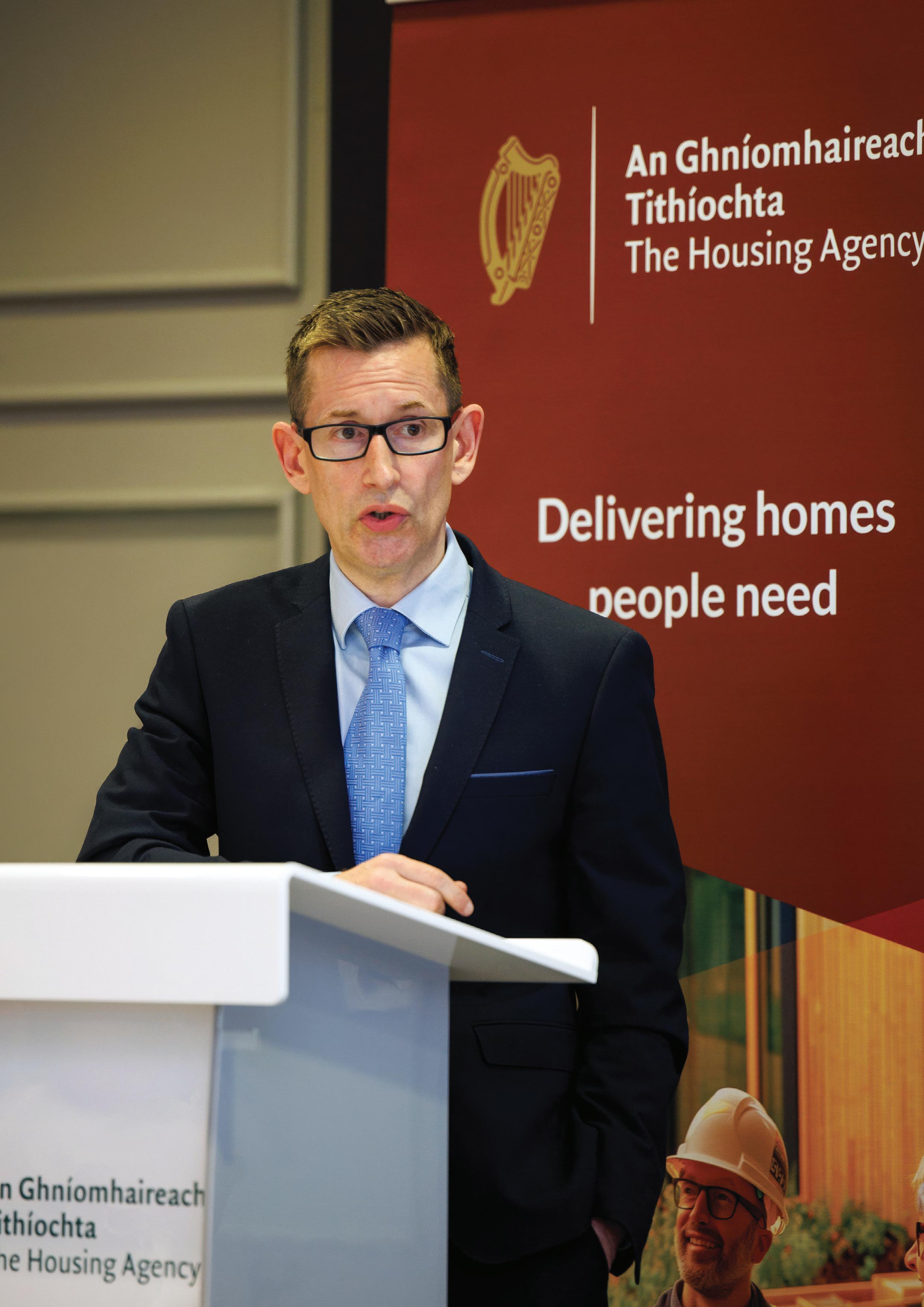

Attending The Housing Agency’s annual housing practitioners’ conference in April 2025, Whelan was immediately struck by two observations. Firstly, the prevailing interconnectedness of stakeholders across the housing system, and secondly, the extent to which an ethos of genuine collaboration exists.
“The Housing Agency’s model is embedded in that collaboration,” the CEO observes, adding: “Engagement is crucial. The Agency exists to collaborate, support, and inform. That will remain a key feature of our approach, and we will continue to act as an important conduit within the overall system.”
Describing the the culture of the Agency as “mission-led” and “outcome-orientated”, Whelan emphasises: “Among my colleagues, there is an overarching focus on making a tangible contribution to resolving the housing crisis. That is a powerful asset. It is also a culture I have observed more generally across the sector.”
In recent years, The Housing Agency has grown significantly, consolidating its presence in the housing system, both in terms of policy development and relevant programme delivery.
Remarking on his priorities for the Agency, Whelan emphasises “the need to ensure that The Housing Agency is optimally positioned from an organisational perspective to embrace the next stage of its evolution”.
Currently, the Agency is delivering an extensive programme of applied research. Most recently, this has spotlit Limerick City and County Council’s model to tackle dereliction while separate research looked at the coordination of delivery of key enabling infrastructure in Cherrywood, south County Dublin.
In terms of broader housing policy, The Housing Agency recently completed and published the Summary of Social Housing Assessments for 2024 and contributed to the Government’s review of rent pressure zones, recently publishing the Review of Rent Pressure Zones Report
Simultaneously, Whelan’s organisation is undertaking “a significant body of work in relation to delivery of significant numbers of new cost rental homes” – including via the Cost Rental Equity Loan scheme (CREL) and the Secure Tenancy and Affordable Rental scheme (STAR) – as well as delivering the Croí Cónaithe (Cities) scheme to bridge the viability gap and enable apartment construction for sale to owneroccupier households.
“These schemes are being delivered at a time when private sector investment in residential

“Among my colleagues, there is an overarching focus on making a tangible contribution to resolving the housing crisis...”
Martin Whelan, Chief Executive Officer of The Housing Agency
development has declined,” he asserts, adding: “We are helping to activate extant housing that would not otherwise be delivered.”
Focused on the continued delivery of these schemes, The Housing Agency engages with the Department of Housing, Local Government and Heritage on a daily basis, “sharing our perspectives and insights from the execution of those schemes, determining what works, what could work better, where there are opportunities, and where there are challenges”.
Perhaps most significantly, a major focus for the Agency currently is supporting the Government’s development of a new national housing plan to succeed Housing for All and gearing up to drive any new relevant initiatives that emerge from that plan.
Reflecting on the Report of The Housing Commission one year on from its publication in May 2024, Whelan reveals that “many of the tenets underpinning the report are already factored into the new housing plan”.

“The Housing Agency has carried out an analysis of 23 priority recommendations contained within the report – as prioritised by the Department of Housing, Local Government and Heritage – and we have provided a perspective on those and will continue this engagement,” he says.
“It is an iterative process. It is not the case that the execution or implementation of these priority recommendations is waiting some finite date in the future. Our analysis is now complete and is very much part of the policy formulation process in relation to the new plan.”
Discussing the prevailing factors fuelling the housing crisis, Whelan identifies the availability of zoned serviced land as a “long-term fundamental challenge”. “We understand that local authorities are struggling to find appropriate zoned and serviced land, to deliver in the here and now,” he says.
Meanwhile, given the planning policy and climate policy context in which housing is delivered, multi-unit developments in the urban landscape are set to play an increasing role in the wider system. However, the viability of apartment development remains a

significant challenge. “We observe this continued challenge in the delivery of Croí Cónaithe,” Whelan says.
Increased housing supply is a means to an end, but it is not an end in and of itself for The Housing Agency. “Rather, supply is an enabler of a more accessible, affordable, and sustainable housing system,” the Agency’s CEO insists.
These are multifaceted challenges, and all arms of the State are involved in resolving them. Asserting that government deserves credit for its successful introduction of cost rental as a new tenure in Ireland, and for driving affordable purchase initiatives, Whelan observes: “The State has stepped into the breach when private sector investment stepped away. Particularly in the apartment space, the State has sought to address some of the more fundamental challenges we face around viability, affordability, and activating housing supply.”
However, The Housing Agency’s CEO acknowledges that the housing system does not operate in a vacuum and macro headwinds – not least the interest rate environment, the flow of institutional capital, and geopolitical events – continue to have a detrimental impact.
Describing the strategic vision of the board as per The Housing Agency’s recentlypublished statement of strategy as “a compelling starting point for me as the new CEO”, Whelan outlines: “Our focus on organisational excellence is accentuated in the statement of strategy and I will help to drive that, consolidating what has been achieved to date.”
Asked to summarise his ambition for The Housing Agency, Whelan is succinct: “Our ambition is simple: we want to deliver.” Pledging to continue driving the schemes within the Agency’s remit and delivering homes for people through various forms of tenure, he maintains that “in supporting some of the most vulnerable cohorts of people in the housing system, social inclusion and sustainability will remain a priority”.
“In summary, organisational excellence, continued delivery, and leveraging our partnerships are important objectives for me and they are shared by the board and the wider organisation,” he concludes.


An Coimisiún Pleanála, the State’s new national planning body, has been established following the commencement of Part 17 of the Planning and Development Act 2024.
Formerly known as An Bord Pleanála, the national planning body became know as An Coimisiún Pleanála on 18 June 2025.
Insisting that the re-establishment is more than “simply renaming an existing body”, Housing Minister James Browne TD asserts that it was “a comprehensive organisational restructuring that will result in a modernised planning body”.
“In anticipation of this development, my Department worked with An Bord Pleánala to ensure the transformed planning body is properly resourced in preparation for organisational change,” the Minister outlines.
The new structure will comprise three pillars:
1. the governing board to oversee the governance function;
2. the planning commissioners; and
3. the corporate structure.
Former HSE CEO Paul Reid was appointed as the Chairperson of the governing board of An Coimisiún Pleanála. In this role, Reid will be tasked with governance and
performance of the organisation, including meeting statutory targets for decisions on all planning cases.
The six other board members are:
1. Peter Dennehy, former Chief Officer of the Pre-Hospital Emergency Care Council (PHECC);
2. Anne Graham, former CEO of the National Transport Authority (NTA);
3. Mary Keane, former Director General of the Law Society of Ireland and current Pre-Hospital Emergency Care Council member with Tailte Éireann;
4. Penelope Kenny, former Chair of An Bord Pleanála’s audit and risk committee;
5. Peter Madden, senior business executive roles, notably Arnotts and Sammon Contracting; and
6. Michael Moriarty, former board member of the Rotunda Hospital.
Responsible for all decision-making in relation to appeals, applications, referrals, and requests, the former members of the An Bord Pleanála
board are now the planning commissioners of An Coimisiún Pleanála.
The last chairperson of An Bord Pleanála, Peter Mullan, is now the CEO of An Coimisiún Pleanála, leading “a strengthened management team and a revised organisational structure to undertake all organisational and technical functions to support core decision-making roles”.
In a written response to a question from Sinn Féin housing spokesperson, Eoin Ó Broin TD, in June 2025, Minister Browne revealed that there are now more people working at the Board “than at any time previously”. As of 30 April 2025, a total of 291 people were working at the national planning body, representing an increase of 50 per cent when compared with 2021. Similarly, Exchequer funding received by An Coimisiún Pleanála has increased by 35 per cent from €30.1 million in 2023 to €40.6 million in 2025.
Commenting on the re-establishment, Minister of State for Local Government and Planning at the Department of Housing, Local Government and Heritage John Cummins TD says: “Today marks another milestone in the reform of our planning system... The revised planning authority represents a shift in how we deliver timely decisions for housing and infrastructure across our country.
“At its core, its transformation will streamline processes, deliver faster decision-making, and offer a clearer and more consistent framework.”

Attended by practitioners from across the housing system, Oaklee hosted a round table discussion to consider how best to address the challenges of delivering mixed tenure projects.
What is the current extent of – and need for – mixed tenure housing in the State?
Sharon Cosgrove
Mixed tenure has been a part of national housing policy since the 1980s. We know from mistakes in the past that there is a need for mixed tenure because it delivers better communities, better social cohesion, more sustainable communities, and better outcomes for people, especially those from low-income backgrounds. The need is well-established; The Housing Commission has recommended that 20 per cent of the State’s housing stock be social and affordable units. While
the knowledge already exists, we must now maintain the vision and commitment to create stronger, more integrated communities through mixed tenure developments.
Paul Carroll
There is a significant need for housing delivery across all tenure types. Fingal County Council is delivering several large, mixed tenure schemes. As a local authority, we are acutely aware of the challenges that come with any one form of tenure dominating housing delivery, and these are challenges which take many years to unwind. We need to ensure that sustainable communities are being constructed and that the necessary investment is being made.
Round table discussion hosted by

Evin McCarthy
From the commercial developer perspective, mixed tenure is critical for the viability and de-risking of projects. Developments do not commence until the exit is identified, and without the underpinning of large-scale social and affordable cost rental purchasers, we cannot have a diverse and commercially viable delivery model.
Gemma McRann
We need more housing in Ireland across all tenures. From a capital funding perspective, we have seen in the UK that a social, affordable, and shared ownership funding framework can unlock other forms of private development in a market where housing is not being delivered.
Paul O’Neill
I agree that we need more delivery across all tenures, but we run the risk of limiting delivery by being too stringent in the parameters we set. Take cost
rental for example. We know the model works but the constraints around achieving minimum reductions against market rents or meeting certain income deciles does make it challenging, and this is reflected in the fact that we have not delivered at the scale we aspire to.
Martin Whelan
There is a significant need for mixed tenure. Mixed tenure is a cornerstone for the creation of sustainable and inclusive communities. There is understandably a focus on the goal of increasing supply, but this should be seen as a means to an end, rather than an end in itself – a critical means to the achievement of more sustainable communities and well-designed mixed tenure is a critical component in this process. Mixed tenure is also a key aspect of delivering larger schemes. This is illustrated by the significant momentum that cost rental has attracted as a new tenure – it is playing a key role in providing homes that people need whilst unlocking housing supply more generally.
Evin McCarthy
The foremost challenge being experienced at present is the slowdown in public funding approvals. This is impacting on delivery of houses and schemes where the developer has already overcome the significant planning and infrastructure challenges. It has led to developments being mothballed following completion of enabling works, or preventing commencement at all, pushing delivery times out by months against a backdrop of cost inflation. We must address this, or delivery and viability will continue to be challenged.
Sharon Cosgrove
There is interdependence between cost rental and social tenures in Oaklee’s development programme. Some local authorities stipulate that delivery on housing tenure must be on a 50:50 basis for social and cost rental. Others have a 70:30 delivery 4


Paul Carroll
As Director of Housing and Community Development since 2023, Paul Carroll is responsible for all aspects of housing and community development across Fingal County Council, working with elected members, community stakeholders, and industry partners to support the ongoing sustainable growth of the county. Paul is a member of various sectoral groups including the County and City Management Association (CCMA) Housing Committee and the Government Construction Contracts Committee. Paul joined Fingal County Council in 2018 as Senior Engineer in the Planning and Strategic Infrastructure Department, prior to which he worked as an engineer and project manager in several local authority, central government, and private sector organisations.


Sharon Cosgrove
Sharon Cosgrove has been CEO of Oaklee since 2016, during which time she has led significant change and growth in the organisation. Sharon held several previous senior roles in the NGO sector including CEO of the Asthma Society of Ireland and Sonas Housing. Sharon is a founding member and sits on the board of the Housing Alliance and has driven innovation in Oaklee, through delivery of Acorn Housing’s SPV and the Comhar Consortium, the first social housing PPP bundle in Ireland. Sharon is committed to delivering Oaklee’s Corporate Strategy 2023-25 and delivering more homes through strong partnerships and strengthening communication and engagement with stakeholders.
Evin McCarthy
As RDJ's Head of Real Estate, Evin McCarthy specialises in property development and investment, spanning both residential and commercial sectors. He advises a diverse range of clients, including developers, financial institutions, government agencies, and investors. Evin is recognised as one of the preeminent advisors in large-scale residential developments advising both developer clients and AHBs on the development and sale of mixed tenure residential developments, with a particular emphasis on private rental sector and public housing (social and cost rental) developments. He previously spent four years as Senior Legal Advisor in the National Asset Management Agency (NAMA).


Gemma McRann
Gemma McRann is a Senior Vice President in Macquarie Capital’s Infrastructure and Energy Capital team based in Dublin. In the UK, she helped deliver projects such as the Silvertown Tunnel PPP under the River Thames and Macquarie Capital’s first investment in the senior living sector. Gemma leads Macquarie Capital’s Irish investments in the social housing sector and is also part of the social and economic infrastructure team which invests across transport and social accommodation sectors including PPPs.
Paul O’Neill
Paul O’Neill is Co-Head of KPMG Ireland’s infrastructure advisory team. A chartered accountant with 25 years’ experience advising on the funding of large-scale capital projects across the public and private sector with experience in project structuring, business cases, delivery options analysis, and long-term contract delivery and management, PPPs. Paul joined KPMG in July 2022 having previously been head of financial advisory with the National Development Finance Agency (part of the National Treasury Management Agency) responsible for providing financial advice across the public sector.
Martin Whelan

Martin Whelan joined the Housing Agency in April 2025 as CEO. He held prior senior leadership positions at the National Treasury Management Agency (NTMA), where he worked across the NTMA’s core international funding, investment, corporate financial advisory, project execution, and claims and risk management mandates, and affiliate businesses including Home Building Finance Ireland and Strategic Banking Corporation of Ireland. Martin has also held senior roles at the Ireland Strategic Investment Fund (ISIF), National Asset Management Agency (NAMA), and in management and business consultancy.

requirement. Local authorities have demonstrated good leadership in outlining the need, but after the approval process for AHB delivery –both internally and externally – the constraints are that there might be money left in one pot for social, but not in another for cost rental. There is a need for approval and funding processes to align which reflect the fact that it is one mixed tenure project which is being delivered.
Martin Whelan
The complexity of different funding streams and approval processes is a challenge. So too, in the current environment, is the pressure on capital streams to do more. An example of this
“Successful mixed tenure projects are greater than housing alone.”
Sharon Cosgrove
is the funding pressures around cost rental, reflecting both the success of this initiative and the scale of the challenge that needs to be addressed. A further challenge is trying to achieve mixed tenure developments beyond the outer rings of cities. The vision is there, but the funding to make it happen is a challenge.
Paul O’Neill
Outside of planning and approvals, one of the main challenges is trying to get investors’ buy-in that we have a credible pipeline of investable projects. Investors know Ireland is a good place to do business, but we will not get their attention with one off projects. The vision and process for cost rental is

now established, but the capital for delivery needs a credible pipeline to mobilise for.
Gemma McRann
Commercial viability and funding have been key barriers for housebuilders to delivering new housing at scale. From a private capital perspective, there is an appetite to support housing delivery in Ireland. In Ireland, PPPs and other revenue support models – whether leases, rent backstops, or other models – have facilitated private funding in the past to enter the market to increase supply.
Paul Carroll
Broadly, housing delivery is being
“As a local authority, we are acutely aware of the challenges that come with any one form of tenure dominating housing delivery.”
Paul Carroll
inhibited by infrastructure shortfalls, especially with roads, water, and energy. I have seen this most particularly in north Dublin, but also in other parts of the country. The lack of zoned service land has been a significant barrier. The zoning is now being addressed by legislation, but the servicing of that land will remain a challenge. It is positive that this is being addressed, but it will remain a barrier in the short term as it will increase the lead-in time required for the delivery of projects.
Martin Whelan
Good design helps to create communities which people want to, and can afford to, live. Communities that will last. Experience shows that design should be tenure blind as much as possible.
Paul O’Neill
A tenure blind approach is key. Enhanced standardisation can drive efficiency also. Similarly, longer-term estate management is particularly important. As with PPPs, this long-term management is a key benefit in that it maintains the housing stock to a defined standard while importantly preserving community cohesion.
Sharon Cosgrove
Design is critical. Successful mixed tenure projects are greater than housing alone. Placemaking is vital to the creation of new and sustainable communities, supported by tenant engagement initiatives. Similarly, management is crucial. There is no point in delivering new housing stock unless it is professionally managed and maintained. In mixed tenure communities, there are often vulnerable people with specific needs, so good estate management and tenancy management are essential in ensuring that supports can be accessed. Oaklee has social housing stock that is dispersed within private developments, and similarly we have apartment blocks of clustered social housing in private developments. Either approach works, but it is critical that supports and services from other agencies are also in place to support vulnerable tenants and help create safe vibrant communities.

“The State’s support for mixed tenure is unlocking developments that would otherwise not be viable.”
Martin Whelan
Martin Whelan
Good management is critically important. We are fortunate in this regard that larger AHBs, for example, have been able to extend their considerable experience in managing social housing tenancies successfully to mixed-tenure communities. Capacity is a challenge though. As the number of social and affordable homes increases so too does the need for housing professionals in local authorities and AHBs to support good estate management and tenant services. The Housing Agency has been leading out with an industry consortium to development a new social and affordable housing apprenticeship to help address this skills shortage, with the first enrolment of new apprentices due next year.
Evin McCarthy
Tenure blind is a commendable objective, but it can be difficult to implement in practice where a tension emerges between design and management. For example, the potential for segregation of facilities between separate elements of the developments due to cost constraints on AHBs. Within the legal framework, the Multi-Unit Developments Act 2011 is now 14 years old, and was enacted at a time when large-scale AHB homeownership did not exist. The Act does not account for such
constructs from a technical perspective and needs to be reviewed to align with the realities of mixed tenure developments.
Paul Carroll
Design is obviously key. As such, there is a responsibility on us to deliver. We can spend years putting plans in place and promising X, Y, and Z, but too often we have lost momentum. This can create challenges if plans for social and community infrastructure are not delivered. Management is a key aspect for Fingal County Council where we now have over 7,000 units with a trajectory of 10,000. From both an asset and tenant management perspective, we must adopt a more structured and professional approach. Work is ongoing across the public sector to establish new systems to do so. Local authorities are having to consolidate their skills and experience to respond to the pressure of delivery.
To what extent does tenure mixing underpin the economic viability of commercial housing development?
Gemma McRann
Whether through current mechanisms or private funding, social and affordable 4


“From the commercial developer perspective, mixed tenure is critical for the viability and derisking of projects.” Evin McCarthy

“Tenure mixing brings public and private finance together from a collaboration perspective, diversifying revenue streams and unlocking market security.”
Paul O’Neill
underwrites can potentially unlock wider development and become part of the solution to scale housing delivery. What private capital needs is a route to scale and visibility of inflation-linked cashflows. For example in the UK, recent announcements that social and affordable rents will increase by CPI +1
per cent for 10 years will help to support further partnerships with housing associations and housebuilders – we have seen private funders underwrite the social, affordable, and shared ownership housing to help deliver a few thousand units per year. There is no reason that a similar model

cannot be applied to Ireland to unlock wider housing development, alongside existing models such as PPPs, LDA, and AHB delivery.
Paul O’Neill
Tenure mixing brings public and private finance together from a collaboration perspective, diversifying revenue streams and unlocking market security. I would argue that greater focus needs to be on the enabling infrastructure to get construction sites up and running in the first instance, bringing in the utilities to achieve joined up thinking. There are plenty of proven funding models available, including PPPs and wider leasing initiatives. The funding will follow if we have well defined, structured projects.
Evin McCarthy
There are two elements. Firstly, the diversification of income streams and scale of typical transactions provides significant hedging against risk. Secondly, there are also clear benefits with having an AHB like Oaklee as a cornerstone of a housing development. Some the private developers are very successfully delivering at scale across each of the tenures. For example, the Balmoston mixed tenure housing scheme being delivered at Donabate by Fingal County Council and Glenveagh, is multiannual with an income stream over several years whilst delivering considerable numbers of social and affordable homes. The forward funding model is also greatly beneficial as site value is realised up front which can then be recycled into development costs. However, attracting private capital into such models can be difficult. There is a danger of overengineering solutions. If the challenge is the viability gap and schemes to address it are complicated – and have low levels of take up as a result – is there scope for examining more straightforward initiatives, for example in relation to VAT rates?
Martin Whelan
It can be very advantageous depending on the development. In many instances, the State’s support for mixed tenure is unlocking developments that would otherwise not be viable, or viable to deliver in the short term. We have seen in the past and currently the role of Part V in underpinning viability, and we now see this across a range of other social, affordable and cost rental funding programmes. To give a sense of this through The Housing Agency’s work, through the Cost Rental Equity Loan
scheme, some 2,242 cost rental homes have been delivered by AHBs and a further 4,023 homes are in train; the LDA has delivered over 1,000 cost rental homes with a significant pipeline of new delivery under the Secure Tenancy Affordable Rental scheme – a scheme that is being reviewed to extend it to private sector partners; and contracts have been signed in respect of over 1,000 Croí Cónaithe apartments, a scheme that aims at bridging the viability gap for apartments for sale. These homes are being delivered as part of wider mixed tenure communities and illustrate the role of mixed tenure in underpinning feasibility right now in the housing delivery system.
Paul Carroll
Tenure mixing is underpinning the economic viability of housing altogether.
From a Fingal County Council perspective, we have challenging targets under Housing for All, and new targets on the way. It enables us to achieve scale, delivering mixed tenure across sites such as Balmoston and Church Fields, meaning that we are not spreading ourselves across several smaller sites. Instead, we can amalgamate delivery, provide the enabling infrastructure, and make investments that might not be justifiable otherwise.
How can the dynamic between local authorities, AHBs, housing developers, policymakers, and other stakeholders be leveraged to accelerate the delivery of mixed tenure housing?
Martin Whelan
One of the most noteworthy features of the last decade of delivery has been the breaking down of barriers and the increase in collaboration. Because of the scale of the challenge we face, there is no alternative to enhanced collaboration. We are collectively trying to address what is the biggest shared challenge that faces Ireland today – the housing challenge – and we can only do that by working across traditional boundaries.
Sharon Cosgrove
Across the sector, teams from different agencies and organisations are collaborating in a positive manner, but

“Social and affordable underwrites can potentially unlock wider development and become part of the solution to scale housing delivery.” Gemma McRann
there is room for enhancement. Through PPPs, for example, we have a shared endeavour in which all the different stakeholders are playing their part in a collaborative manner rather than viewing each other’s organisations as being in competition. We must continue to make these relationships work and enhance the collaboration taking place currently.
Gemma McRann
We each have the different component parts of the broad solution for the sector, and we have observed leadership being shown by the AHBs. We have developers and contractors who have a lot of experience in delivering housing in Ireland. We have models which have worked in the past, including private capital collaborating with AHBs, local authorities through PPPs and other models. These models can be adapted to ensure long-term ownership of social and affordable housing by the Government while providing the initial supporting framework to make these schemes viable and scalable.
Paul O’Neill
While it is positive that there is a strong level of collaboration across the sector, we have a lot of different organisations that are responsible for its delivery, so
the key to success is ensuring that there is a simple message which underpins the decisions we make. We also must ensure that the local authorities and AHBs are properly resourced to be able to play their part in leading the delivery of these projects.
Paul Carroll
International capital is now firmly a topic of conversation in the sector, and we are in a position where we are informed about the capital streams available for us to enable delivery. Local authorities must lead on vision and outline the needs of the local population. We need the collaboration because the expertise which enables delivery is in the private sector.
Evin McCarthy
The relationships and collaboration are important and must continue, but we cannot underestimate the scale of the challenge. Cooperation sprouts the seeds of innovation and the level of joined up thinking is a positive development. We have reason to be positive because we know that we can attract international capital. The key is ensuring that we are continuing in our cross-sectoral collaboration which will ensure that we have a message which is attractive to investors.


Bent Madsen, President of Housing Europe, outlines the key features of Denmark’s nonprofit social housing system, known locally as ‘almene boliger’, which translates to ‘common housing’.
Madsen emphasises that the approach to social housing in Denmark is not a traditional social housing, but rather a system designed for broad accessibility and community development. “It is called ‘almene boliger’ – meaning ‘common housing’ – because everybody can live in it,” Madsen says.
“We deliberately create mixed neighbourhoods. It is not just for low-income households; it is for students, elderly people, families, and workers.”
Denmark’s nonprofit housing makes up 20 per cent of the country’s total housing stock, comprising approximately 500,000 homes. Of these, nearly 100,000 are reserved for elderly residents, including care homes, while around 50,000 are designated for young people.
Access is managed through a waiting-list system, though wait times vary drastically. “In Copenhagen, you might wait years, but in rural areas, you could move in almost immediately.”


“It is not about profit. It is about people.”
Housing Europe President Bent Madsen on the philosophy underpinning social housing in Denmark
A key feature is the municipal assignment system, where one in every four vacant homes is allocated by local authorities for social purposes. “This could mean housing the homeless, newly divorced couples, or key workers,” Madsen notes. “During the Covid-19 pandemic, half of Copenhagen’s vacancies went to frontline workers facing housing pressure.”
The system also allows for flexible assignment, adjusting tenant criteria to support balanced communities. “In a struggling area, we might require new tenants to be employed. In another, we will prioritise families to stabilise the neighbourhood,” he says.
Nonprofit housing in Denmark is financed through a mix of municipal support (10 per cent upfront) and mortgage loans; the same market used for private homeownership. “We do not rely on banks. It is the mortgage system that funds us, just like any Danish homeowner,” Madsen explains.
The real innovation, however, is the Danish National Building Fund, a collective pool fed by repaid loans.
“After between 30 and 40 years, mortgages are paid off, but the homes remain nonprofit forever,” he says, adding: “Two-thirds of the savings go into a national revolving fund, the rest stays local.”
This fund, he states, finances renovations, accessibility upgrades, and health services: “We are not just maintaining buildings; we are investing in communities. Right now, we are testing small clinics in housing areas to keep elderly residents out of hospitals.”
Nearly 200,000 residents live in areas with ‘social master plans’. Madsen explains that social master plans are “holistic strategies that combine education, employment, and health interventions”. The Housing Europe President says that these comprehensive data systems allow for precise targeting of services.
“We know where you live, work, how your kids perform in school, even your health history,” Madsen says. “We use this anonymously to identify needs. Surprisingly, part-time jobs for teens improve school performance more than tutoring. We did not expect that.”
The plans also integrate crime prevention, employment support, and volunteer networks. “In some areas, outcomes for vulnerable families are now better than in private housing,” he says.
Currently, 44 per cent of Denmark’s schizophrenia patients and twice the national average rate of patients with chronic diseases live in nonprofit housing. In this context, Madsen sees an urgent need for decentralised healthcare.
He argues that this would allow for a community care model where patients are treated in their house, which, he asserts, would ensure that there is equality of access to high-quality healthcare in the Nordic state, which is especially prudent given that Denmark is comprised of 70 inhabited islands which makes service delivery challenging.
He also outlines how the Danish Government is piloting hospital-at-home concepts. “If we can reduce hospital visits, we improve lives and save costs,” he says.
Madsen concludes by outlining the differentiation in the philosophy of social housing in Denmark compared to other European countries, including the UK and Ireland
“We do not see ourselves as landlords. We are community builders. The Danish model proves housing can be both equitable and sustainable if you design it that way.”
For Denmark, the success of almene boliger lies in its permanence, inclusivity, and adaptability. As Madsen put it: “It is not about profit. It is about people.”

Key features of Denmark’s nonprofit social housing model
• Open to all, not just low-income households.
• 20 per cent of housing stock (500,000+ homes).
• Municipal assignment reserves 25 per cent of vacancies for social needs.
• Mortgage financing with a revolving national fund for reinvestment.
• Social master plans integrate housing with education, jobs, and health


The current Building Agreement was issued jointly by the Law Society and the Construction Industry Federation in 2001. In recent years, there have been calls from practitioners to modernise and update the Building Agreement.
The Law Society Conveyancing Committee has previously indicated that the current edition of the Building Agreement is under review.
Since its inception, the Building Agreement has been plagued with disagreement over amendments to its standard conditions. This has led to intervention from the Law Society by way of a number of practice directions.
Certain terms that had been used in the Building Agreement were found unfair by the High Court within the meaning of the European Communities (Unfair Terms in Consumer Contracts) (Regulations 1995 (the Unfair Terms Regulations). This came following numerous complaints from purchaser’s solicitor to the Conveyancing Committee.
Despite the decision of the High Court, some solicitors on the builders side continue to include variations of these unfair terms in the Building Agreement. The Law Society has previously issued a practice note stating that any alleged breach of the High Court Order could be deemed to be misconduct.
One of the most frequently negotiated and amended provisions of the Building Agreement is the Price Variation Clause referenced in special condition 6 of the Building Agreement. This clause allows for the adjustment of the contract price, either upwards or downwards, in the event of: (i) fluctuations in the cost of labour, materials, fuel, plant, and other construction-related expenses, and (ii) changes in the applicable rate of VAT.
Prior to the pandemic, the Price Variation Clause was routinely deleted from contracts. Developers and purchasers alike preferred the certainty of a fixed price, which was seen as a key selling point in residential transactions. Even as the property market began to recover and grow post-2013, construction costs remained relatively stable, giving developers the confidence to offer fixed-price contracts, knowing that the risk of significant cost inflation was low.
The landscape changed dramatically with the onset of the pandemic, followed by the war in Ukraine. These events triggered severe disruptions in global supply chains, leading to volatile fuel and energy prices and a sharp increase in the cost of construction materials. As a result, developers began to reintroduce price variation clauses into their contracts to protect against unpredictable cost surges.
Since then, the inclusion of such clauses has become increasingly common. In some transactions, developers have successfully relied on these provisions to negotiate midcontract price increases, citing unforeseen cost escalations. This trend reflects a broader shift in the construction industry, where even fixed-price lump sum contracts are evolving to accommodate a growing list of delay and cost-related risks.
The concept of ‘force majeure’, once limited to rare and extreme events, has also expanded. Today, standard definitions often include pandemics, geopolitical conflicts, and trade tariffs. Recent examples include the US tariffs and the conflict in Gaza, both of which have had ripple effects on global material availability and pricing.
While developers are understandably cautious about increasing prices – fearing negative public relations and impacts on future sales –the price variation clause serves as a critical risk mitigation tool. It provides a contractual mechanism to maintain project viability in the face of rising costs, safeguarding the developer’s financial stability and the overall success of the development.
The inclusion of a price variation clause often becomes a point of negotiation, not just between the developer and purchaser, but also between their respective lenders. The developer’s lenders typically favour the inclusion of such clauses, as they help ensure the profitability of the project and the repayment of loans and interest. The purchaser’s lenders, require certainty regarding the acquisition cost to accurately assess loan-to-value ratios and affordability.
This tension can lead to protracted negotiations, especially in residential sales, where affordability and transparency are paramount.
In some cases, the price variation clause must be entirely excluded. A notable example is where a property is sold under a part V agreement entered into with the Local Authority, where the price is calculated using a formula, and any variation would undermine the legal and financial framework of the agreement.
The re-emergence of the price variation clause highlights the realities of today’s unpredictable construction sector. As the housing market evolves, balancing price certainty with commercial viability remains a key challenge.
The challenges surrounding this clause point to a broader issue: the outdated nature of the current Building Agreement. The legal, economic, and practical landscape of the construction industry has changed dramatically since its introduction. The housing crisis and rising costs of materials and labour underscore the urgent need for a comprehensive review.
There is growing consensus among stakeholders that reform is overdue. The general conditions must be updated to reflect modern challenges – offering greater flexibility, clearer risk allocation, and alignment with consumer protection standards. The Agreement must also meet the expectations of lenders, regulators, and purchasers through increased transparency and balance.
It is time for the Law Society and the Construction Industry Federation to collaborate once more – this time to deliver a revised Building Agreement that meets the demands of today’s construction environment. Such reform would enhance certainty, and support and accelerate the delivery of sustainable housing.
Joanna Bannon – Director
T: 01 828 0684
E: joanna.bannon@fieldfisher.com
W: www.fieldfisher.com/en-ie/locations/ireland
Aisling Kiernan – Associate
T: 01 828 0910
E: aisling.kiernan@fieldfisher.com
W: www.fieldfisher.com/en-ie/locations/ireland



It is now widely acknowledged – both anecdotally and through sectoral reporting – that delays in securing planning and funding approvals continue to hinder the progress of approved housing bodies (AHBs).
Processes that once took three to four months are now extending to twice that duration, resulting in significant project delays, deferred housing delivery, and a deepening of Ireland’s ongoing housing crisis.
Given these persistent challenges, it may be time to consider alternative funding mechanisms.
There are compelling reasons to diversify funding sources beyond the government-backed Capital Advance Leasing Facility (CALF), which has become increasingly constrained. Numerous AHBs, including Clúid Housing, have reported that shovelready developments are being held up due to delays in CALF approvals – a challenge that is frustrating for all stakeholders.
Compounding the problem is the continued retrenchment of traditional lenders, particularly the pillar banks, from property and housing finance since the 2008-2011 financial crisis. In this context, accessing international capital markets and leveraging established financial instruments such as securitisation vehicles warrants serious contemplation.
Securitisation has demonstrated resilience and efficiency in other asset classes, offering potential benefits such as:
• broader access to capital pools;
• diversification of funding sources; and
• enhanced liquidity in the housing sector.
These advantages could contribute to a more consistent, cost-effective, and timely delivery of much-needed housing stock.
Securitisation is not without its complexities. These structures are inherently sophisticated and typically attract institutional investors with a high degree of financial acumen. Legal considerations – particularly around the assignment of contracts and the vesting of rights within the securitisation vehicle – must be carefully managed to ensure compliance and investor confidence.
Moreover, enforcement mechanisms in the event of insolvency can be intricate. Most critically, there is a potential misalignment between the financial objectives of investors and the social mission of affordable housing.
Balancing return on investment with the imperative to provide secure, long-term housing for vulnerable populations remains a key concern.
Despite these challenges, the current funding model is clearly unsustainable. Housing remains the foremost domestic policy issue, and innovative solutions must be explored. While securitisation may not be a perfect solution in isolation, it represents a credible and potentially transformative component of a broader funding strategy.
Engaging with capital markets –alongside robust regulatory oversight and alignment with social objectives –could help unlock the scale and speed of delivery that the sector so urgently requires.
Aaron McGarry – Director
T: 01 828 0665
E: aaron.mcgarry@fieldfisher.com
W: www.fieldfisher.com/enie/locations/ireland


A
total of 15,580 people comprising 10,805 adults and 4,775 children accessed emergency accommodation in April 2025, yet another new record for homelessness set under the current government.

Since the Fianna Fáil-Fine Gael-Regional Independents coalition was formed in January 2025, homelessness figures have increased every single month to April 2025. Of adults accessing emergency accommodation in this time, 52 per cent were Irish, 21 per cent were from the European Economic Area (EEA) or the UK, and 27 per cent were non-EEA. The vast majority of people accessing emergency accommodation in April 2025 were in Dublin, with 7,562.
Under the previous Fianna Fáil-Fine Gael-Green Party coalition government – which was in power from June 2020 to January 2025 – the total number of homeless grew by 6,500 people from 8,699 in June 2020 to 15,286 in January, a 75.7 per cent increase. Monthly homelessness figures increased 26 times under the previous government which was in power for 55 months.
Under the previous administration, homelessness figures began to decrease from the onset of the Covid-19 pandemic in March 2020 and the subsequent ban on evictions, when the total number of homeless was 9,907. Monthly homelessness figures fell on 10 occasions during the 15-month period of March 2020 and June 2021 before they began to increase on an almost month-by-month basis again.
The Government also imposed a ban on evictions in October 2022 which was operational from November 2022 until March 2023. It did not lead to a reduction in overall homelessness figures, but did see the number of homeless children fall from 3,494 in November 2022 to 3,373 in February 2023, before rising to 3,472 in March 2023. The number of homeless adults during this time increased every month, from 8,048 in November 2022, to 8,516 in March 2023. Homelessness figures increased in almost every single month from then until the new government formed in January 2025.
In its Programme for Government, the current coalition government sets out the aim to reduce homelessness and protect vulnerable households in line with the formal government policy to end homelessness by 2030 outlined in Housing for All
There were 4,176 preventions of households entering emergency accommodation during 2024, as 2,714 households exited. In 2024, 5,509 adults were prevented from entering emergency accommodation and 3,384 exited.
In March 2025, the Government announced changes to the Tenant in Situ (TiS) scheme, seen as a vital means to prevent homelessness, with 1,676 households prevented from becoming homeless through the scheme in 2024. Changes included a new rule that landlords selling homes to a local authority must be in receipt of a social housing support payment for two years.
Under new mandatory eligibility criteria for the scheme, local authorities and approved housing bodies must prioritise buying houses for families with children, older people, or people with disabilities. Opposition TDs criticised the introduction of this criteria, suggesting that it would reduce the number of TiS acquisitions, even if demand remained the same.
During a Dáil Éireann debate in midJune 2025, Sinn Féin, the Social Democrats, the Labour Party, People Before Profit-Solidarity, and some independents filed a join-motion to request emergency action on housing and homelessness. Part of the motion requested the restoration of the TiS scheme. They also requested that the Dáil recognise that the homelessness crisis is deteriorating; house prices, rents, and council waiting lists are rising; and the Government continues to miss social and affordable housing targets.
Criticising Housing Minister James Browne TD, Sinn Féin housing spokesperson Eoin Ó Broin TD said: “The Minister has been in office for five months and we can already start to see the damage he and the people around him are doing to our housing system. I have already mentioned that he has cut funding for vital homeless prevention schemes. For the life of me, I cannot understand how that could be his first act.
“He has completely ignored The Housing Commission’s call for a housing delivery oversight executive with emergency powers, underpinned by legislation. The Minister is giving us a toothless tiger in the form of a Housing Activation Office (HAO), and he could not even put the head of that body in place.”
Source: DHLGH
The Report of The Housing Commission, published in May 2024, recommended the establishment of a Housing Delivery Oversight Executive (HDOE) “as a decision-making body responsible for coordinating the delivery of housing” which would be “mandated through legislation”. Instead, the Department of Housing established the HAO, which has no legislative power. The HAO focusses on the infrastructure needed to support housing delivery at a local level. Its operational function is to “unblock issues on the ground”, as outlined by the Department.
Minister Browne replied: “The first thing I did when I became Minister was to increase the capital spend by €725 million. When I became Minister, the funding that was available for the tenant in situ scheme was €60 million. I increased it to €325 million.
“Despite the undoubted progress, we must acknowledge that housing still remains a crisis. The number of new homes coming on stream each year is far short of what we need. The State has invested unprecedented levels of public money in the delivery of housing in recent years, and we must continue to do so.”

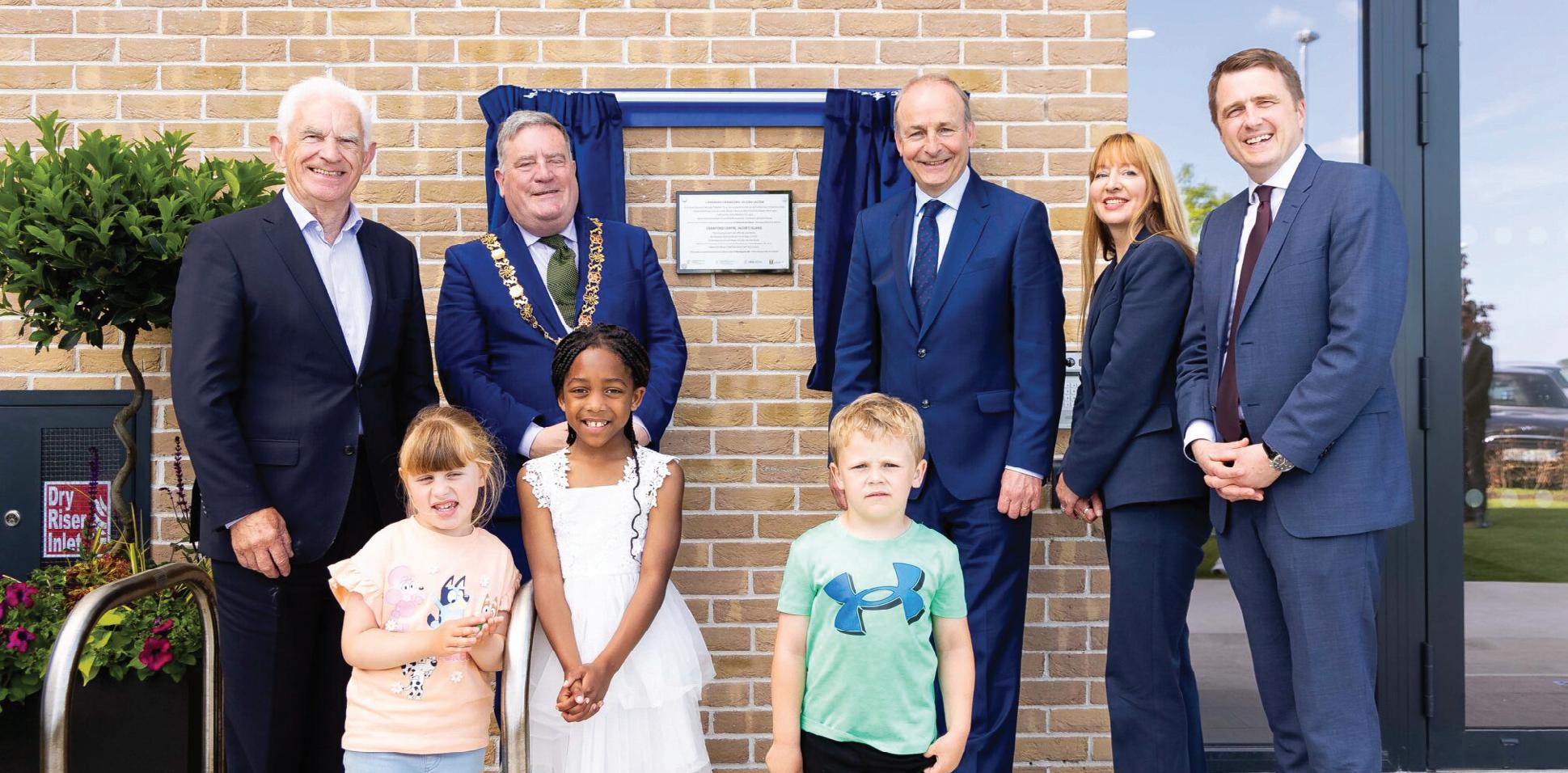
Respond, Ireland’s largest construction-led AHB and a national service provider, have been supporting communities for over 40 years. With more than 18,000 people now living in over 8,000 Respond homes, the organisation is in a significant new phase of growth and ambition.
Backed by government and local authorities, and in partnership with trusted developers and contractors, Respond is accelerating the delivery of social and cost rental housing on mixed tenure developments across the country. Currently, 3,463 homes are under construction, and this number is set to grow in the coming months as the organisation expands its national pipeline.
“It is not just about building homes, it is about providing long-term housing options that help people put down roots and build a future,” says Niamh Randall, Respond’s spokesperson. “We are proud to work alongside local
authorities and state partners to make this a reality.”
More than 82 per cent of Respond’s current housing delivery is constructionled, a strategy that enables the organisation to manage cost, quality, and timelines more effectively. This approach also ensures developments are tailored for long-term sustainability and embedded with community infrastructure where possible.
With deep in-house expertise in design, procurement, and delivery, Respond is not only meeting current demand, but also setting a model for housing delivery at scale that is responsive to national priorities and local need.
The Crawford Centre is part of a twophase project due to commence that will see an additional 149 cost rental homes completed at Jacob’s Island by 2027, bringing the total number of homes to 218.
Taoiseach Micheál Martin TD recently opened 69 new social homes and broke ground on an additional 149 cost rental homes at Jacob’s Island, Cork. In total, 218 high-quality homes will be delivered on this site.
Phase 1, known as The Crawford Centre, is already home to 94 residents living in A2 BER-rated one- and twobedroom apartments. Designed for comfort and community, each unit is equipped with air-source heat pumps and high-efficiency insulation.
The second phase, due for completion in 2027, will significantly expand Respond’s cost rental offering in Cork, addressing a clear and urgent need for affordable, secure tenancies in the city.
Respond recently opened applications for new cost rental homes in Griffin Point, Clongriffin (Dublin 13), where 64 cost rental homes have been delivered. These are part of a wider 397 mixed tenure development, providing highquality, secure housing for individuals and families priced out of the private rental market.
Phase 2 of the development will include a purpose-built Early Learning and School Age Care (ELSAC) centre, which will be run by Respond, offering 55 parttime childcare places. Phase 1, now nearing completion, includes 210 social and cost rental homes while Phase 2 will deliver an additional 187 homes by February 2026.
In County Meath, Respond has completed the final phase of its Mine View project. The newly delivered 17 homes bring the development’s total to 63, now home to more than 200 people, including 130 children. This development exemplifies Respond’s people-centred approach, combining high-quality, energy-efficient homes with a layout that promotes safety and neighbourliness.
In Wicklow, Adelaide Villas is now home to 62 residents in 18 bright, modern apartments. These lifetime homes were designed to be safe, accessible, and energy-efficient, supporting residents to age in place or live independently. The development reflects Respond’s belief in housing as a foundation for long-term well-being.
Niamh Randall, spokesperson for Respond, welcomed the increase in scale and acknowledged the collaborative effort involved in bringing these projects to fruition: “At Respond, it is not just about building homes; it is about providing long-term housing options that help people put down roots and build a future. The partnership with
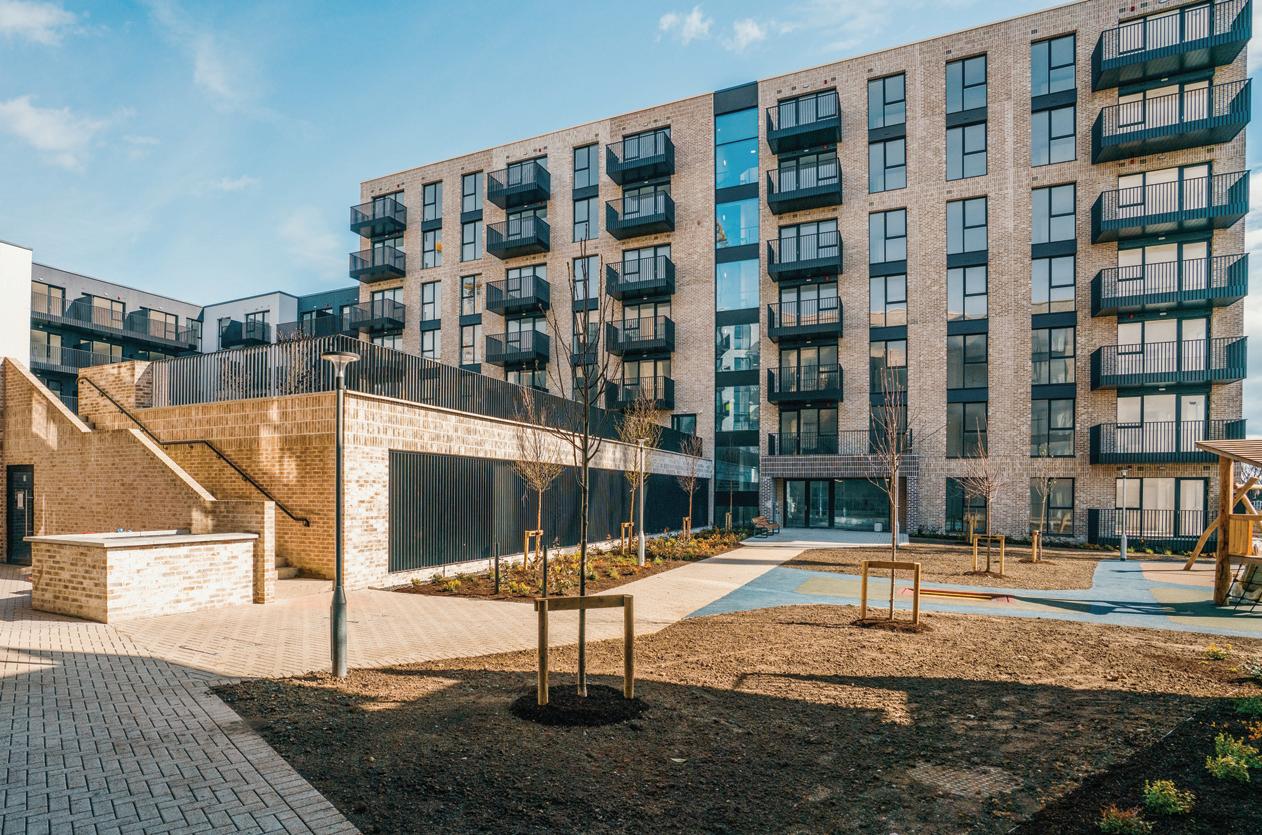
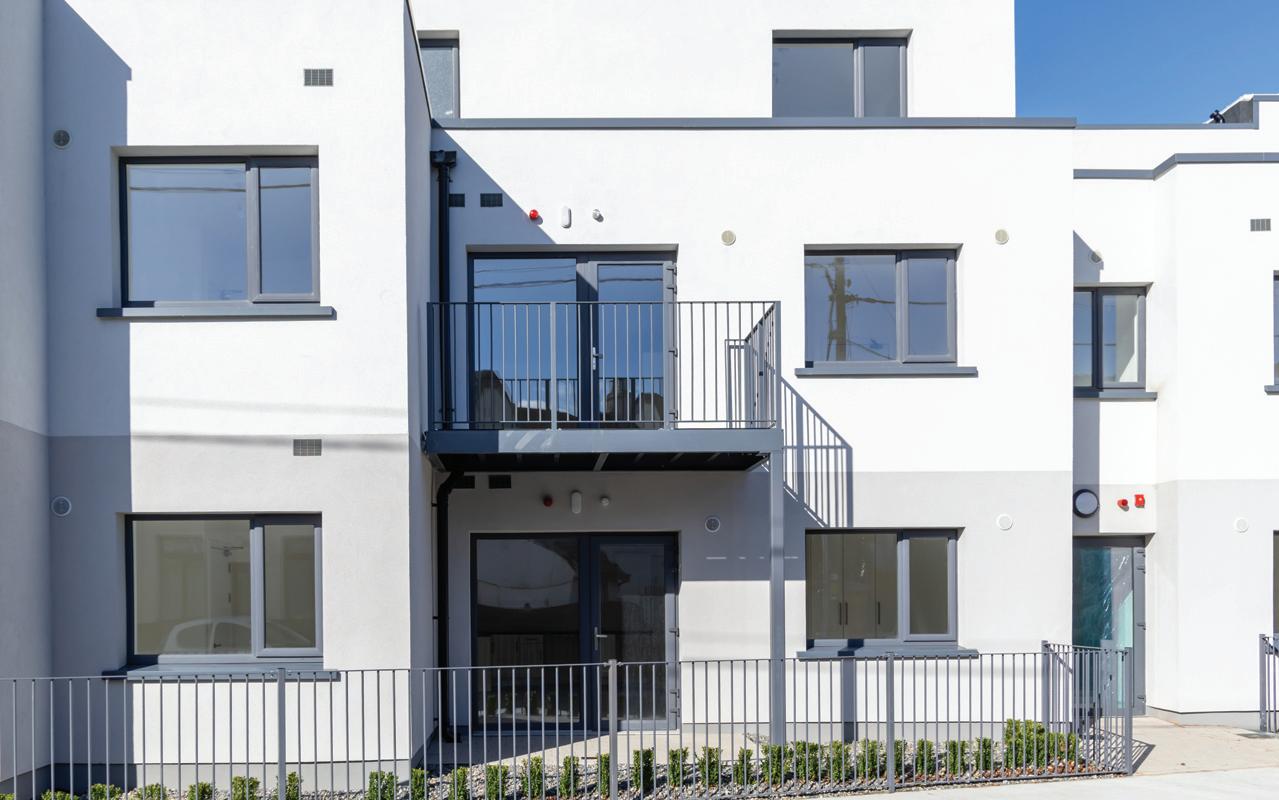
local county councils has been key to delivering these developments and we are very grateful for the continued support of our funding partners, including the Department of Housing, Local Government and Heritage; the Housing Finance Agency; and The Housing Agency.”

Overseeing this new chapter is Aoife Watters, appointed CEO of Respond in early 2025. She is the organisation’s first female CEO in its four-decade history and brings extensive experience in both the commercial and not-for-profit housing sectors.
Watters has served as a board director and chair of another approved housing
body, where she also led its Finance and Audit Subcommittee. She was previously director of finance and corporate Services at a large crossborder housing and homelessness charity.
Her appointment signals continuity with Respond’s values and focus on strategic scale, financial stewardship, and community impact.
“I am honoured to join Respond and to have the opportunity to lead this exceptional organisation,” says Watters. “Respond’s strong track record of innovation, growth and community support has had a lasting impact. Together with our board, team and partners, we will continue this vital work in delivering homes, supporting communities and making a meaningful difference in people’s lives.”
W: www.respond.ie

Rachel Finn, Director of Managed
and Head of Irish Operations at Trilateral Research, outlines a practical vision for implementing ethical and responsible artificial intelligence (AI) in the social housing sector.
Speaking from her experience at the crossroads of law and emerging technologies, Finn warns that “while AI presents major opportunities for improving housing services, it must be implemented with care”.
“Technology itself is value-neutral but when we make decisions about how we design and deploy it, we embed our societal values for better or worse.”
Trilateral Research, originally a research-focused organisation specialising in privacy, data protection, and ethics, now builds AI tools to solve complex social problems and advises public sector bodies on AI governance.
Drawing on 15 years of work across both academic and applied settings, Finn’s key message is clear: responsible AI is achievable, but it takes planning, oversight, and collaboration.
The promise and hesitation around AI
Finn highlights that many organisations in housing and beyond are still hesitant to adopt AI, despite its potential. Public services, already under pressure, are seeking ways to increase capacity and AI is often cited as a means of delivering “massive productivity increases, from 15 per cent to 400 per cent”.
However, Finn outlines three fears that commonly hold organisations back:
1. approving a risky system;
2. choosing the wrong tool; and
3. lack of internal oversight.

These challenges are well-founded, says Finn, and are reflected in global examples of AI systems causing harm through bias, hallucinations, or lack of transparency. However, she notes that organisations now have more clarity on why systems fail and what can be done to avoid it.
Finn offers a practical three-step framework for housing organisations seeking to use AI to improve services while mitigating risk:
AI is most effective in high-volume, data-rich environments where decisions are repetitive and time-sensitive. In housing, this could include:
• real-time tenant support such as arrears prediction;
• chatbots for benefit advice;
• application triage; and
• resource planning.
She cites an example from Lincolnshire in England, where Trilateral Research developed a safeguarding tool for identifying children at risk. The system consolidated data from datasets of arrests, social services, and anti-social behaviour to reduce case review time from 25 person-days to 20 minutes.
“That is time that can now be spent safeguarding children; rather than reporting on it,” Finn says.
Ethical AI is not just a technical project. Finn stresses the importance of collaboration between subject matter experts, legal professionals, behavioural scientists, and user interface designers, especially in public services where trust is critical.
She describes a project in Trim, County Meath, where Trilateral Research built a hyper-local air quality monitoring tool. Using AI, it translated raw environmental data into “meaningful, health-related outcomes” such as localised asthma or diabetes risks for both residents and policymakers. “If all local authorities reduced carbon emissions by 20 per cent, we could save 360 lives and €18 million annually for the HSE,” she says.
Finn is firm that AI adoption is “not plug-and-play”. “It is not like a TV that you send to someone’s house. It is more like a houseplant; it needs regular care,” she says. Data evolves, user needs change, and systems must be monitored for accuracy over time.
That, Finn states, is why Trilateral Research sets up shared responsibility models with its partners, clearly defining who manages what, and how decisions will be made across the AI lifecycle.
She also asserts that organisations must invest in AI literacy, ensuring staff understand both capabilities and limitations, and establish AI governance programmes alongside existing compliance functions (e.g., GDPR or information security).
Finn says: “Done right, responsible AI brings tangible benefits: faster insights, better service outcomes, and scalable solutions that remain ethical and trusted. These investments really pay off not just in efficiency, but in ensuring that technology works for the people we serve.”
In a housing sector facing rising demand and shrinking resources, Finn concludes: “Ethical, well-governed AI is not a luxury; it is a necessity.”

As its housing output increases, the LDA remains focused on delivering the right type of homes in the right places.
The Land Development Agency (LDA) is on course to become Ireland’s largest homebuilder by 2028 and by 2031 the Agency is targeting an annual direct delivery output of close to 4,000 homes a year.
This updated forecast was issued at the LDA’s recent sod-turning event to mark the start of construction on 542 new affordable and social homes at Donore Project in Dublin 8.
Like all LDA targets, this one is ambitious but must be achieved given the pressing need for increased housing supply and the requirement for the LDA to continue to play a significant role in helping to address this urgent issue.
The predicted figures serve to illustrate the full extent of its ongoing activity and growing project pipeline while the developments involved highlight the Agency’s emphasis on using government funding to deliver the right homes in the right places, creating sustainable new communities and enhancing existing ones.
The LDA has two key delivery channels and both are performing strongly. The first is the direct delivery of new homes on state-owned or acquired land, and the second involves partnering with homebuilders to deliver affordable homes on their sites.
The direct delivery channel includes transfers of state-owned land, acquisitions of land from the private market or the use of land owned by local authorities as part of joint projects. Significant progress is being made in each of these categories.
In total, there are over 10,000 homes on 19 direct delivery sites in the planning or construction phase, with a further 5,000 homes scheduled for delivery on land to be acquired in the coming months and years.
The LDA’s existing pipeline includes land transferred by the ESB in Wilton in Cork and by Teagasc in Kinsealy in Dublin in addition to land acquired by the LDA at the Royal Liver site on the Naas Road in Dublin 12. The recent agreement between the LDA and Horse
Racing Ireland to transfer a site at Leopardstown Racecourse in south Dublin, will add to that pipeline, as it has the potential to deliver 800 homes.
The LDA’s activity includes joint partnerships with Dún LaoghaireRathdown in Shanganagh in Dublin, Limerick City and County Council in Mungret and with Dublin City Council at Bluebell Waterways in Dublin 12, Cherry Orchard Point in west Dublin, Cromcastle in Dublin 5 and Donore Project in Dubin 8.
Many of the sites involved are substantial in size and have the potential to not only deliver new homes and new communities, but to transform entire areas through the provision of new facilities and amenities.
A good example of the LDA’s strategic and regenerative approach to sustainable housing delivery is the recent purchase of two neighbouring land parcels in north Dublin.
In December 2023, the Agency announced the acquisition of over 13

hectares of land in Clongriffin with existing planning permission for 1,800 homes and the potential to deliver a total of over 2,300.
In March 2025, it completed the purchase of 18 hectares in neighbouring Baldoyle with existing planning permission for over 1,900 homes.
The sites are located beside each other next to Clongriffin railway station. They are also located beside existing housing and in a developing community which urgently needs, and will benefit from, new facilities and amenities.
Both sites were due to be developed by private developers, but these projects were delayed for many years until the LDA stepped in.
Now, construction has already started on the first phase delivery of over 400 apartments in Clongriffin with further progress due to be announced soon. As part of its ongoing plans, the LDA is working closely with partners, stakeholders and locals to deliver an integrated plan for the entire area that will include the provision of new retail and commercial outlets in addition to improved access to the railway station, green areas and shared spaces.
This transformative and collaborative approach is also being applied when it comes to joint projects with local authorities. Donore Project, which was mentioned earlier, is a strong example of what can be achieved by the LDA when its expertise and ability to deliver to a high-standard and at scale is combined with the local knowledge and on-the-ground experience of a city or county council.
This new housing development is being built in partnership with Dublin City Council on the former St Teresa’s Gardens site off Donore Avenue in the heart of Dublin’s south inner city and will deliver 389 cost rental and 153 social housing apartments.
Once complete, it will include a new crèche, community spaces, a café/retail unit, mobility hub, a new home for Donore Boxing Club and a municipal sports pitch.
A similar strategic approach is being applied as part of the LDA’s homebuilder partnerships. This delivery channel utilises the Project Tosaigh initiative, in which the LDA works with private developers to provide the financial impetus needed to get projects underway and ensure their completion. The homes are then either sold at affordable prices in partnership with local authorities using shared equity schemes or made available by the LDA as cost rental, with rents at least 25 per cent below market rates for eligible households.
So far, the Agency has already delivered over 1,700 Project Tosaigh homes with a further 2,500 contracted and another 1,500 being negotiated. In total, the LDA is aiming to have delivered over 11,000 Project Tosaigh homes by 2031.
The effectiveness of this delivery channel was clearly demonstrated during a recent event in Cork where Taoiseach Micheál Martin TD and Minister for Housing James Browne TD visited two Project Tosaigh developments which are playing a central role in the transformation of the Docklands area of the city.
At Marina Depot in Cork’s South Docks, the LDA is delivering 337 new cost rental apartments in partnership with Glenveagh Properties. At Horgan’s Quay on the North Docks, the Agency is working with HQ Developments to deliver 302.
The Marina Depot project has effectively kickstarted a wider Glenveagh development that will ultimately include nearly 1,200 homes at the site. Meanwhile the development at Horgan’s Quay was effectively stalled due to viability concerns before the LDA’s involvement.
Both projects are central to the redevelopment of the Cork Docklands area and involve the LDA working closely with Cork City Council to provide new places for people to live and work in what is a prime riverside location.
Once complete, they will serve as leading examples of LDA delivery, providing much-needed homes, but also inspiring and assisting the wider regeneration of high potential areas.
They will also form part of a wider delivery pipeline involving a growing number of projects that can and will continue to make a significant impact on the country’s overall housing need.
W: www.lda.ie
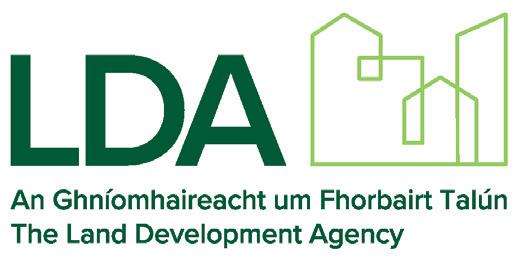

Despite the vacancy rate in the Republic of Ireland hitting its lowest level since 2013 at 3.8 per cent, there remains 80,689 vacant residential dwellings in the State as outlined in the GeoDirectory Residential Buildings Report Q4 2024.
In early June 2025 a freedom of information request by Sinn Féin spokesperson on Urban Regeneration and Renewal, Planning, Public Realm and Local Government Thomas Gould TD also revealed that there are 2,749 vacant social homes in Ireland. Gould says over 750 of this number are “lying unused, boarded up, for over a year”, while more than 20 have been idle for longer than five years. Census 2022 found that there were 163,433 vacant properties in the State.
Approximately €25.9 million was spent to reactivate 2,375 vacant social homes under the Voids Programme in 2024, the Department of Housing, Local Government and Heritage announced in May 2025.
The average cost to activate a social home totalled €10,905 in 2024, 41 per cent lower than 2023 when this figure stood at €18,540 as the Government spent €46
million to reactivate 2,481 social homes. Between 2014 and 2024, a total of €361.7 million was spent to reactivate 25,672 social homes, an average cost of €14,089 per unit.
A progress report on the Vacant Homes Action Plan 2023-26 was published in April 2025. It states that 1,297 properties have been approved for funding under the €150 million Urban Regeneration and Development Fund (URDF), aimed at facilitating regeneration and rejuvenation projects in cities and large towns in the State. The Department states that 4,853 residential units are expected to be approved for the URDF by 2030. In 2024, 11 new towns were added to the list of URDF eligible areas following a review of Census 2022 data.
Under new planning regulations, certain vacant commercial premises are exempt from requiring planning
0 2,000 4,000 6,000 8,000 10,000 12,000 14,000 16,000 18,000 20,000
20142015201620172018201920202021202220232024
Average cost per unit (€)
permission to change to residential use. By the end of 2023, 1,165 change of use planning notifications had been received from developers with the Department stating that this could result in the provision of 2,716 new homes.
In 2022, Exempted Development Planning Regulations were reviewed and extended. Former pubs are now included under the exemptions and the timeframe for exemptions was extended to apply up to the end of 2025. Local authorities received 267 exempted development proposals in 2023 which is expected to yield 650 dwellings. In 2022 and 2023, 92 notifications were received relating to pubs which is expected to yield 295 dwellings.
Up to Q3 2024, 55 homes were delivered under the Repair and Leasing Scheme, with 57 delivered under the Social Housing Investment Programme. The Department also points to the designation of 52 Town Centre First towns and the establishment of 72 new town teams as progress. A package of measures worth €4.5 million has been assigned for the policy which contains a key focus to address vacancy and dereliction.
The Department also asserts that increasing the Vacant Homes Tax from five to seven times a property’s base Local Property Tax liability is “providing a stronger disincentive to leaving a home lie vacant”.
Number of units reactivated
The report also outlines progress made on the Vacant Property Refurbishment Grant, however the most up to date data on the grant was published by the Department in May 2025. Over €112 million has been paid out to 2,096 applicants through the grant since its establishment in 2022. A total of 12,404 applications have been filed with the Department under the scheme with 8,652 approved up to 31 March 2025.
The European Regional Development Fund (ERDF) THRIVE scheme is also being used to address dereliction. It is delivered through two strands, one is for integrated urban strategies and project pipeline development. The other is for the renovation and adaptive reuse of vacant or derelict heritage buildings in public control or ownership. In May 2024, 26 local authorities were provided €5 million under strand one, while five urban centres were provided €32 million under strand two in August 2024.
The Department of Housing launched a Compulsory Purchase Order Activation Programme in April 2023 which aims to enable local authorities “to actively use their legislative powers to compulsorily acquire vacant and derelict properties”. All 31 local authorities also now have a full-time vacant homes officer position since 2023.
The State Lands and Property Subgroup has identified 34 sites with potential for housing development in the existing property portfolios of all government departments. At the end of 2024, 10 sites were still under review, 16 were deemed unavailable, and eight were deemed unsuitable or not required.
In July 2024, regulations were signed in regarding section nine of the Local Government Rates and other Matters Act 2019 with the aim to enable local authorities to offer rates-based incentives for conversion of suitable vacant commercial properties to residential use.
The Government has approved the Short-term Letting and Tourism Bill to establish regulatory controls for holiday and short-term lets. It includes the creation of a register for all short-term letting properties. In April 2024, the EU also adopted the Short-Term Rental Regulation and it will come into effect in May 2026.
Minister for Housing James Browne TD says: “I am currently pulling every lever to reactivate vacant properties. Under my direction, the Department is acting quickly to bring vacant social housing back into use across towns and villages, which is critical to help ease pressure on the existing housing stock, boost supply, and ultimately to provide much-needed homes.”

Uisce Éireann’s Housing Lead Tony Bridgeman discusses how working together with the construction sector can drive progress and support the nation’s housing needs.
Uisce Éireann is navigating a challenging yet dynamic period as it supports Ireland’s housing, commercial development and growth, according to Bridgeman, Housing Lead at Uisce Éireann: “Our ambition is to be a solution provider as we recognise our role as Ireland’s national publicly owned water services utility in the delivery of secure, safe and sustainable public water services – enabling the Irish economy to grow and communities across Ireland to thrive.”
Bridgeman has played a pivotal role in driving transformation across the organisation, which is just over ten years old: "In an environment that is constantly evolving, it is essential that ways of working with internal and external stakeholders are optimised.”
Uisce Éireann invests approximately

€2.5 billion annually in operational and capital expenditure. This includes the operation, management, maintenance and upgrading of over 8,000 water and wastewater treatment plants and assets, as well as approximately 90,000 kilometers of pipe network.
The organisation has a significant footprint in the Irish economy, collaborating with over 2,000 Irish and international contractors and suppliers to deliver work programmes that generate economic opportunities nationwide.
The Dublin native brings over 40 years of experience in the utility sector, having worked with Bord Gáis and Gas Networks Ireland before joining Uisce Éireann. He has worked at Uisce Éireann for 12 years, originally as the Head of Business Transformation but
more recently assuming the role of Housing Lead. In this capacity, he has been actively engaging with large-scale developers and their representative bodies – the Construction Industry Federation (CIF) and the Irish Home Builders Association (IHBA) – to address obstacles that may delay housing developments: “With the help of our delivery partners, we are driving improvements in water service infrastructure and facilitating connections, ensuring that homes and businesses across Ireland have a safe and secure supply of water and wastewater treatment for decades to come. Engaging at the initial stages of a project allows developers to access a crucial feasibility assessment that determines whether a connection is technically viable. This confirmation can be incorporated into planning
“In an environment that is constantly evolving, it is essential that ways of working with internal and external stakeholders are optimised.”
submissions, strengthening applications, mitigating risks, and ultimately improving processing times for connection approvals.”
Bridgeman also believes that further collaboration with developers and their representative bodies can yield additional solutions to building delays. However, he emphasises the importance of quality and value: “Uisce Éireann is investigating whether greater developer involvement in the installation of water and wastewater infrastructure can accelerate the delivery of housing projects. As we are spending taxpayers’ money, we must ensure that the works carried out on our behalf meet a set standard and stand the test of time. We envisage this will be achieved through an experience-based accreditation scheme.”
Uisce Éireann’s Strategic Funding Plan 2025-2029 outlines the estimated investment required to support the Government’s Housing for All programme. The Government has now committed to building 300,000 new homes by 2030.
To support this target, Uisce Éireann estimates that additional ring-fenced funding of €2 billion will be required between now and 2030. This funding would ensure the delivery of water services capacity needed for housing growth, along with key enabling policies, planning, and resourcing.
According to Bridgeman: “The additional funding being sought would
focus on ensuring that the appropriate water and wastewater infrastructure is in place to facilitate new housing in areas prioritised under the National Planning Framework. It must also be coordinated with other utility and service providers to ensure investment delivers capacity where it is needed.”
The €2 billion figure is based on detailed analysis, and a forensic breakdown is underway to determine how best to allocate the funds for maximum return. Bridgeman reiterates that being subject to the Government’s annual budgetary process can hinder long-term certainty around capital and operational delivery: “A five-year allowance would enable Uisce Éireann and its key stakeholders to have the certainty, flexibility, and time needed to plan and deliver high-quality, multiannual projects and operations.”
While Bridgeman sees his role as vital to supporting housing growth, he highlights two essential projects for long-term sustainability in the Greater Dublin Area and beyond. The Water Supply Project – Eastern and Midlands Region aims to provide a secure water supply for up to 50 per cent of the population, serving Dublin, Meath, Kildare, and Wicklow, with potential future expansions. A planning application is expected in late 2025. Meanwhile, the Greater Dublin Drainage Project (GDD) includes a new treatment plant in Clonshaugh, County Dublin, designed to support 500,000 people and alleviate pressure on existing

networks. GDD is required to be delivered by 2032 to ensure wastewater treatment capacity in the Dublin area is not exceeded. Both projects are fundamental to supporting growth and resilience across the region.
Uisce Éireann is committed to playing its part in helping to address the country’s need for housing. We urge all home builders to take proactive steps in engaging with Uisce Éireann as early collaboration is key to streamlined developments, driving economic and social growth while delivering the homes Ireland needs for the future. By working together we can reduce delays and create stronger communities.
Home builders can submit a preconnection enquiry at Get Connected | Connections | Uisce Éireann (formerly Irish Water)

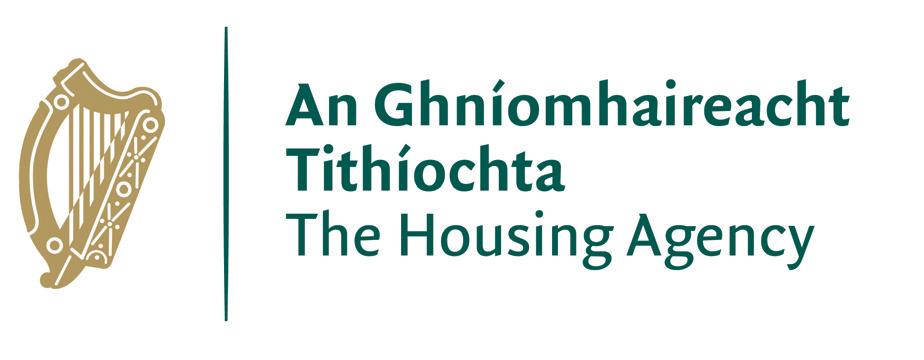
The Housing Agency’s Housing Insights series highlights examples of good practice from across Ireland’s housing sector –showcasing innovative, effective approaches to housing delivery, planning, and infrastructure coordination, writes Nicola Turley, Policy Officer, The Housing Agency.
Cherrywood, Ireland’s largest Strategic Development Zone (SDZ), is one such example. It is setting a new standard for how we plan and deliver sustainable communities. With over 10,000 homes planned, a new town centre, three village parks, schools and integrated public transport, Cherrywood offers a clear lesson for practitioners: when infrastructure leads, community follows.
The Housing Insights paper explores how Cherrywood has successfully delivered essential infrastructure in tandem with residential development –and what housing practitioners can learn from its approach.
A defining feature of Cherrywood’s success is its clear emphasis on delivering infrastructure ahead of residential development. In the Cherrywood Planning Scheme, Dún Laoghaire-Rathdown County Council (DLRCC) prioritised the provision of social and physical infrastructure such as roads, parks, school sites and
sustainable transport links before housing construction began. By the time residents moved in, the essentials of a sustainable community were already up and running – rather than waiting years for basic services to follow.
To coordinate such a complex project, Dún Laoghaire-Rathdown County Council set up a dedicated Development Agency Project Team – a multidisciplinary group of planners, engineers, architects and financial experts. Acting as a single point of contact for developers, landowners, and state bodies, this ‘one-stop shop’ model supported early land activation and ensured consistent implementation of the Planning Scheme.
Phasing and sequencing were carefully built into the Cherrywood Planning Scheme. Infrastructure was not an afterthought; it was built into the delivery timeline. Key infrastructure like schools and open spaces had to be delivered in tandem with new homes, with thresholds tied to the number of
residential units. For example, school sites had to be transferred before 1,000 homes could be approved. Rather than delivering housing first and chasing amenities later, Cherrywood’s planning ensured these elements were integrated from the start.
Collaboration was another cornerstone of Cherrywood’s success. With 13 landowners, multiple state agencies, and significant environmental considerations, strong communication was essential. Dún Laoghaire-Rathdown County Council hosted regular forums and workshops, giving stakeholders early guidance, resolving queries, and ensuring alignment from concept to delivery. This proactive engagement helped avoid delays and ensured all stakeholders worked toward a shared goal.
Dún Laoghaire-Rathdown County Council funded the required infrastructure by drawing on a mix of government programmes, like the Local Infrastructure Housing Activation Fund and Urban Regeneration and Development Fund, alongside strategic development contributions. In some cases, developers who delivered key infrastructure, such as roads, were allowed to reduce their contributions accordingly. This flexible approach accelerated delivery, allowing development to progress faster once key infrastructure was in place.
Cherrywood was designed as a ‘10-
Permission granted for 5,000+ homes
Luas to bus interchanges secured
Construction commenced on 2,000+ homes
3 parks complete: Tully, Ticknick & Beckett containing pitches, courts and playgrounds
Luas line extended to Brides Glen, 4 stops opened
Establishment of new primary and secondary school places
minute neighbourhood’, which builds on the ‘15-minute city’ concept popularised by Carlos Moreno, wherein a resident’s needs can be fulfilled by travelling within 15-minutes of their home and builds in several key elements of a sustainable community.
While the 15-minute city concept gained international traction post-2020, Cherrywood was ahead of the curve, and the 10-minute neighbourhood concept had not yet been formalised when the Cherrywood Planning Scheme was being drafted. This concept has been successful, and emerging data from DLRCC shows that its sustainable travel targets have been exceeded, and now, higher and more ambitious sustainable travel targets have been set.
Of course, challenges remain. The cost of building continues to be a barrier to affordability, and changes in post-Covid working patterns have altered demand
1,600+ homes completed
2,900 sq. m. of social space
Opening of minisupermarket, barber shop & coffee shop
Additional creche facilities opened in CHerrywood Town centre
Expansion of walking and cycling routes to support active travel
for retail and office space. Dún Laoghaire-Rathdown County Council has responded by reviewing elements of the town centre plan and introducing planning amendments to adapt to changing needs. For example, car parking requirements are being adjusted to improve affordability, reduce reliance on private vehicles, and support more sustainable development patterns.
To date, Cherrywood has delivered over 1,600 homes, with more than 2,000 currently under construction. Public parks like Tully, Ticknick and Beckett are open, four Luas stops are operational, Luas to bus interchanges have been secured, and a range of local amenities – including crèches, shops, and active travel routes, are already serving residents. Cherrywood is not just a development – it is the foundation of an emerging sustainable community. Cherrywood shows what’s possible when infrastructure, housing, and
Funding secured for new 5.2km linear park and greenway
services are planned together.
For housing practitioners, the key takeaways are:
1. plan and lead with infrastructure;
2. phase development carefully;
3. build collaborative teams; and
4. stay flexible to change.
Ultimately, sustainable development starts with people. Homes are not just standalone units – they are part of a wider network of infrastructure, services, and community life. Cherrywood shows how bringing all these elements together from the outset can create lasting impact.
Read the full Housing Insights report here: www.housingagency.ie/newsevents/housing-insights-issue-5supporting-sustainable-communitiessuccessful-provision

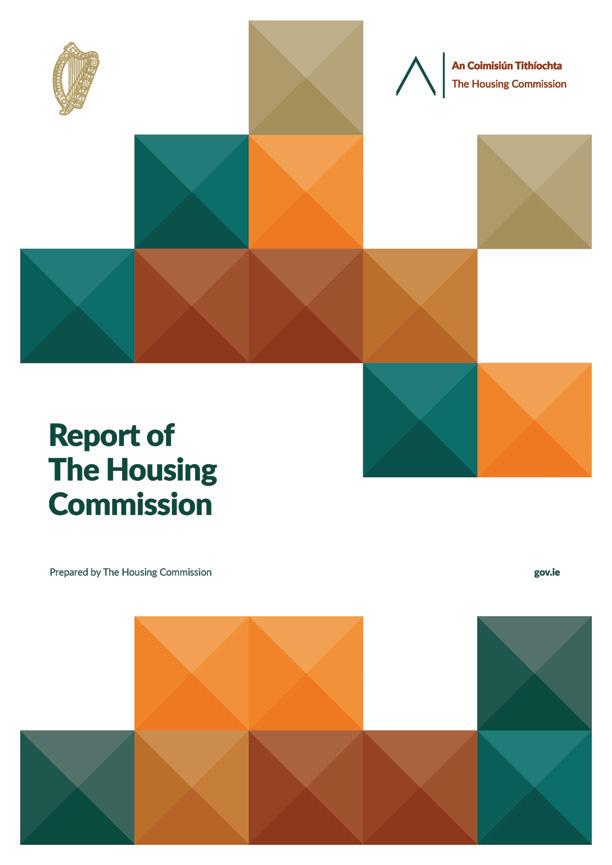
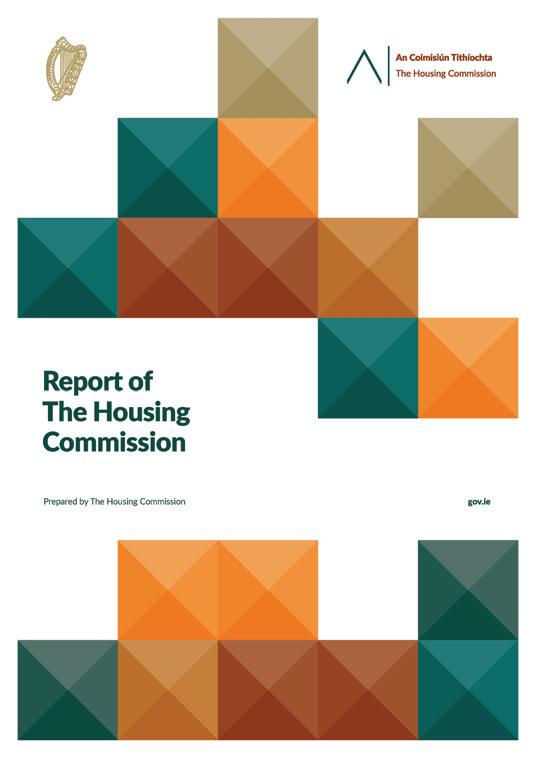


Established by the previous coalition government, The Housing Commission was tasked with examining and reporting on long-term housing policy as well as a referendum on housing. Commencing its work in January 2022, the reports of The Housing Commission were published in late May 2024. Almost one year on, and with a new coalition government in place, Housing Ireland Magazine asks key policymakers, practitioners, and stakeholders to reflect on the initial response to the main report at Housing Ireland 2025.
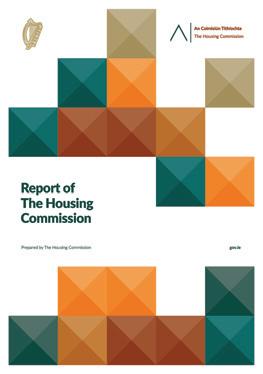




I would like to make it very clear that the Government does not underestimate the scale of the challenge and recognises that a radical step change in housing supply is required.
At a high level, The [Housing] Commission considered that housing should be affirmed as a unique national priority, supporting social cohesion and economic development, and with a focus on expressing our collective aspirations for society.
I wholeheartedly agree with the Commission in this respect and will work tirelessly to make this happen.
There is much to be considered in the report and there are many areas where implementation may be complex or have potential consequences elsewhere. But I can confidently say we are scoping and progressing many of the actions. Some have been committed to in the new Programme for Government, while others are informing our thinking on the step-change needed to build on Housing for All and deliver 300,000 or more new homes by 2030.

Generally the Report of The Housing Commission was accepted well by the public and those involved in housing. There was an initial negative reaction from government which I think they are getting over... From the Programme for Government [2025] and the actions being taken now, I think the Government is beginning to take on The Housing Commission’s report more.

Within the social housing sector, it has been very positively received from AHBs [approved housing bodies] and local authorities... For people working in the sector, and leading the sector, there is an understanding that there needs to be quite fundamental reform. That was very positive.
In relation to government and colleagues in the Department of Housing [Local Government and Heritage], I was a little concerned, at the start, that the response was focused on getting more work done on The Housing Commission’s report by The Housing Agency, which has enormous expertise, I want to acknowledge. But I was just very keen that we would move on to implement the report. Since the report was launched, I have had a couple of very positive meetings with colleagues in the Department.
Finally, rather to my surprise, the report has been really positively received internationally... Lots of countries face the same issues as us and they were quite interested in The Housing Commission model.



Initially, the reaction was very muted and that was concerning because it is a very significant body of work – two years on behalf of the Commission’s members, but also the 60 or 70 people who worked with us on it, from right across the sector – public and private, and academia – and it would have been a shame if the initial reaction was maintained.
I think now, with the new government, we are seeing a very strong uptake of interest and it [the report] has been cited in meetings in the Royal Institute of the Architects of Ireland, but also among colleagues as well.
When you get into the appendices of the document, there is some incredible detail there which really needs to inform any changes in policy going forward. We are now seeing a change and really strong level of interaction with the report.

In terms of the political system, the members of the Commission have been far too diplomatic – although I understand why – in terms of what they have said about the political response. Let’s be very clear. When the report was published, the previous administration – at a political level – was dismissive of the report. They [the thengovernment] went so far as to publish a list of alleged actions saying, ‘well, we are already implementing this’. Which clearly was not the case.
My understanding is that the outgoing minister [Darragh O’Brien] did not even have courtesy to meet the Commission before it was disbanded.
All of the opposition parties in the last Oireachtas repeatedly tried to get a formal Oireachtas debate on the detail of the report and we could not get it.
There is a change in language. The new minister and the new administration are talking about this report differently, but I think that it will be sometime before we see if the talk translates into action...
From our point of view, this report is as important at the National Economic and Social Council’s 2005 landmark Housing in Ireland: Performance and Policy study. That became a benchmark. This has to be treated the same. While, like any recipe, some of us many want a little bit more of one ingredient than another, we have to continually return to it during the policymaking process as a resource to tackle the challenges ahead. Certainly, in our party, we are very keen to use it for all of the good that has been put into it.


For the best part of six or seven months, there was no Oireachtas debate. We have finally got the debate, and we have heard Taoiseach Micheál Martin TD speak in quite dismissive and disparaging tones certainly to my own party leader, Ivana Bacik, in the Dáil in relation to this [report].
There have been soundings from the new minister, certainly in engagements that we have had with him, that he is more open to the ideas and implementation of The Housing Commission’s report...
If you talk about it [the report] as a recipe, in order for it to work, it needs most of the ingredients in order to be cooked successfully. It seems to me that the Minister is picking parts of the report that he likes – he is claiming they [the Government] are already doing this – even though the reality of that is rather half baked...
If you look at what they are going to do, have a look at what they have done because it will give you a fair idea as to where they are going. I have no faith at this moment in time because they simply do not accept the deficit is as bad as it is. They talk about radical and urgent action, but they have not actually done anything radical or urgent.

The phrase ‘radical reset’ captured the imagination of a lot of people that this was not a normal government-commissioned report; that it is something different. It did strike me that it was fairly novel that we got such a diverse group of experts, stakeholders, people from the industry, and people that represent citizens in various capacities together for two-and-a-half years and nearly 200 meetings, really drilling down into this and coming to a consensus. That is pretty special in itself.
What I thought was shocking, quite frankly, by the previous government and the outgoing minister was that instead of owning it and wrapping themselves around it, it was put at a distance. I would have thought that there was real opportunity for the State – having put this commission together – to take it seriously in the initial period, ask commissioners to go on roadshows and engage with citizenry around the country, to popularise the issue.
We all see it is the issue of our time, we all talk about how it is going to affect our kids and Conor’s [Sheehan] generation – and it is – but it struck me as something that the Government set up and then got too concerned that endorsing and accepting the recommendations was admitting failure. I think the Government had a real opportunity to do a 180 degree turn and say, ‘we have set this commission up and we are now going to now examine and endorse these recommendations and build towards these things’. They did not do that and that was a missed opportunity.

2025 marks a significant moment for Clúid as the organisation celebrates its 30th anniversary and bids a fond farewell to its longstanding Chief Executive, Brian O’Gorman.
For three decades, O’Gorman has been an unwavering force at Clúid, guiding its growth from a fledgling organisation to one of Ireland’s leading approved housing bodies (AHBs), now providing homes for close to 33,000 residents.
O’Gorman’s upcoming retirement marks the end of an era, a testament to his dedication and the indelible mark he has left on the Irish social housing landscape.
O’Gorman’s journey into the not-forprofit housing sector began before Clúid’s inception. His early career with Threshold saw him championing the rights of those in the private rented sector, navigating the complexities of mortgage arrears and the evolving landscape following the de-control of
private tenancies. This was followed by a pivotal period at Focus Ireland, where he honed his understanding of housing policy, further solidifying his commitment to addressing homelessness and housing need. His pursuit of knowledge led him to Ulster University, where he deepened his knowledge of housing and a desire to become involved in developing homes for those seeking social and affordable housing.
In 1994, O’Gorman became the first employee of St Pancras Housing Association Ireland – later to become Clúid. This pivotal role saw him laying the foundations for an organisation that would grow to become a cornerstone of social and affordable housing provision
in Ireland. Since assuming the role of CEO in 2000, O’Gorman has been instrumental in shaping not only Clúid’s trajectory but also contributing to the wider AHB sector, tirelessly advocating for policies that benefit the communities they serve and future generations.
Reflecting on his remarkable tenure, O’Gorman shares: “After 30 years with Clúid, I will be retiring this year. It has been a genuine privilege to have worked alongside so many extraordinary people and met so many remarkable residents and partners. This includes the many dedicated and talented individuals working in local and central government and the elected representatives who dedicate themselves to public service. It is pleasing to witness the growth in scale and influence of housing associations across social, affordable and agefriendly housing.”
Clúid’s 30-year journey is a story of ambition, resilience, and a deep-seated commitment to providing high-quality secure homes, leading to the creation of sustainable and thriving communities. Clúid holds to its core value of housing as a ‘platform for social progress’. Furthermore, the importance of a housing association operating as a sustainable social enterprise, so as to be able to manage and maintain homes for the foreseeable future. The organisation’s first housing scheme in Kilcronan, Clondalkin, delivered in 1995, marked the beginning of a remarkable expansion. Over the years, Clúid has demonstrated innovation and strategic foresight in its approach to housing delivery. The acquisition of apartments at Clarion Quay in 2002 through ‘Planning Gain’ not only provided muchneeded homes but also highlighted the potential for leveraging planning mechanisms for social benefit, a success that contributed to the creation of Part V of the Planning and Development Act.
A significant turning point came in 2003 with the transfer and subsequent
refurbishment of St Joseph’s Mansions, later renamed Killarney Court. This large-scale regeneration project, undertaken in partnership with Dublin City Council, not only transformed the lives of residents in an area grappling with deprivation but also underscored the trust placed in Clúid’s ability to deliver impactful change. This period also saw Clúid establish its first dedicated age-friendly scheme in Holy Cross, Killarney, laying the groundwork for its specialist age-friendly provider, Clann.
Clúid’s commitment to innovation continued with the securing of the first debt finance scheme between an AHB and the Housing Finance Agency (HFA) in 2012, paving the way for significant investment in social and affordable homes. The organisation was also at the forefront of responding to the challenges of the financial crisis, delivering its first ‘Mortgage to Rent’ home in 2014, providing a crucial lifeline for families facing mortgage distress while adding to the social housing stock.
More recently, Clúid has championed the development of cost rental housing, delivering the state’s first cost rental homes at Taylor Hill, Balbriggan, in 2021 and a landmark mixed-tenure scheme at Lancaster Gate in Cork city in 2022. These initiatives reflect Clúid’s dedication to providing secure, longterm, affordable housing options for a wider range of households.
Clúid is making significant investment to retrofit and upgrade older housing stock. Works at Killarney Court in partnership with SEAI in 2023, which coincided with the 20th anniversary of Killarney Court’s regeneration,

demonstrate the organisation's commitment to sustainability and the wellbeing of residents.
O’Gorman’s leadership has been characterised by a hands-on approach and an unwavering belief in the power of collaboration. His early hands-on experience involved direct engagement with residents, collecting rents and fostering a deep understanding of their needs. There are few chief executives who can plausibly say that they have done every job in their organisation: Brian O’Gorman is one, a testament to his deep-rooted understanding of Clúid’s operations at every level.
Looking to the future, Clúid is poised to build on this strong foundation with a robust pipeline of almost 5,000 new homes, with over 1,000 currently under construction and an additional 650 due to commence this year. This ambitious programme underscores Clúid’s continued commitment to innovation,
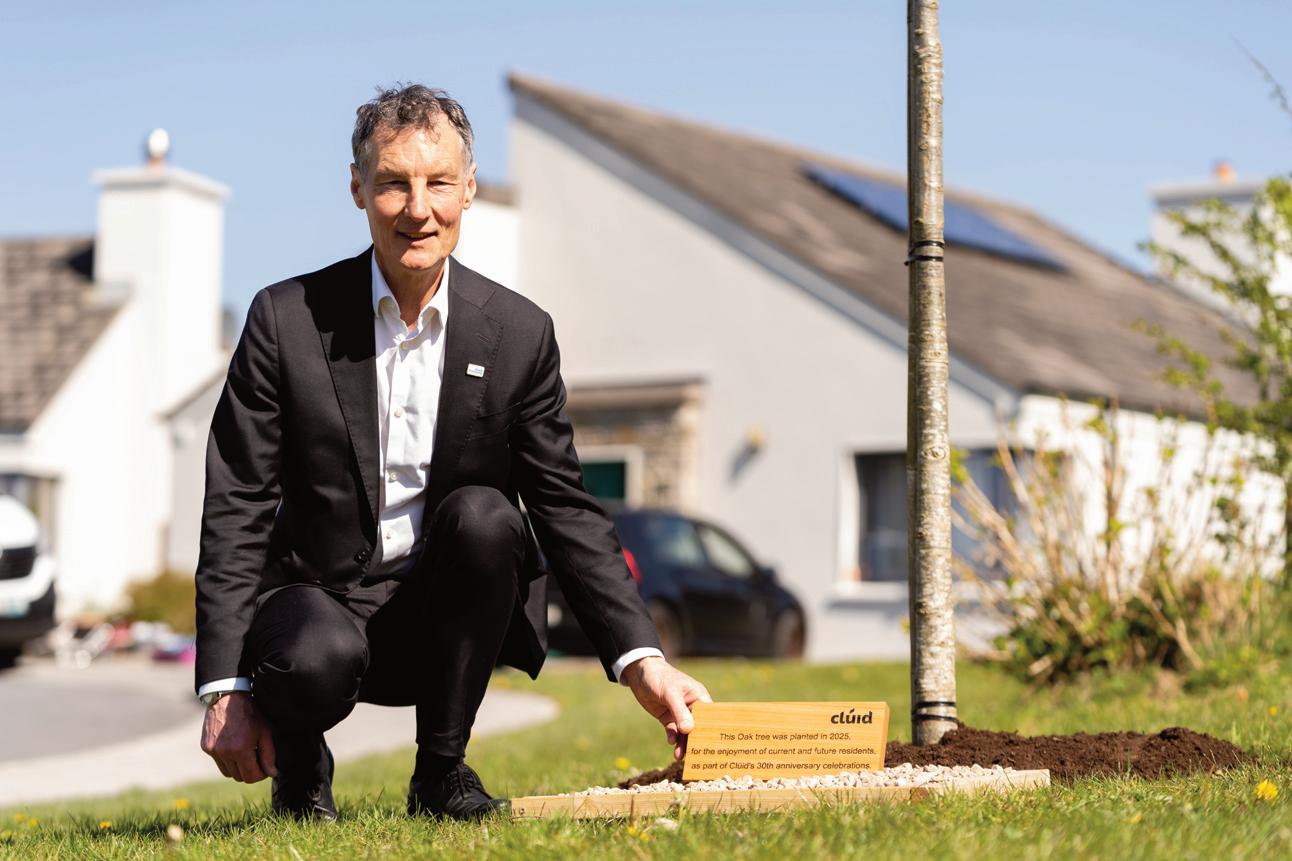
addressing ongoing challenges and delivering thriving communities.
As O’Gorman steps into his welldeserved retirement, he leaves behind a legacy of growth, innovation, and unwavering dedication. His vision and leadership have been instrumental in shaping Clúid into the respected and influential organisation it is today. His emphasis on collaboration across national and local government, finance and development partners, and community groups has been a hallmark of his tenure, fostering a collective approach to tackling Ireland’s housing needs.
O’Gorman concludes: “I will miss being part of the next chapter but will be ‘cheering from afar’ as Clúid continues to flourish. I will be leaving with a renewed belief in the benefits of homes and services provided by independent non-profit housing associations. To me, housing association activity, in developing a sizeable number of homes made available to serve successive generations of Irish households, is the route to a stable and thriving housing sector.”
On behalf of the entire Clúid team, past and present, we extend our gratitude to Brian O’Gorman for his exceptional determination, inspiring leadership, and unwavering passion over the past 30 years.
We wish him the very best as he embarks on this new chapter, confident that the strong foundations he has laid will ensure Clúid continues to flourish and make a significant difference in the lives of people across Ireland for many years to come.
W: www.cluid.ie
In a panel discussion chaired by Caroline Timmons, Assistant Secretary of the Affordable Housing Division at the Department of Housing, Local Government and Heritage, housing practitioners from across the public and private sectors discussed innovative methods to scale residential construction at the Housing Ireland Conference.
Orla McGuirk: One of the main barriers is existing regulations that limit the introduction of new technologies. Most technical guidance documents still do not fully account for modern methods of construction (MMC), and design certifiers typically follow these outdated documents.
Karen Kenny: We have changed housing and density standards to encourage innovation in design, but with MMC, you can still incorporate standardised elements. Raising awareness among planners is crucial so they understand why certain approaches are used and how they support MMC.
Tom Maguire: Understanding the full benefits of MMC is essential. On a direct cost basis, it may not always match traditional methods, but when you consider the entire lifecycle, it is more cost-effective. Market acceptance is another challenge. There is still some reluctance to adopt new systems, although this is improving.
Daniel McCrum: The construction sector tends to be project-focused, which limits long-term innovation. Certification is also a major barrier. Developing and approving a new product requires significant time and financial investment, which deters innovation.
Claire McManus: From a design perspective, the current standards can be overly restrictive. For example, in some cases, four dwellings require three staircases, which increases costs unnecessarily. Adjusting these requirements could allow for higher density and lower per square metre costs.
Brian Mallon: Certification is a major challenge. Although around 20 MMC systems now have Agrément certificates, there is still hesitation in accepting them, especially regarding fire safety. Even fully tested systems are often met with resistance. To advance, we need to embrace certified lightweight systems with better embodied carbon performance, and building control enforcement must become more consistent.



What is the key to unlocking the certification barrier?
Daniel McCrum: Building regulations must remain in place, but MMC –particularly volumetric systems – are relatively new and lack embedded codes and standards. Each new product has to be tested across all regulatory areas, especially structural and fire resistance. These tests are very expensive.
There are currently only 20 Agrément certificates, six of which are for insulated concrete formwork. The process of achieving certification through the MMC agreement pathway is resource-intensive and can take up to two years, which can deter companies from pursuing it.
Daniel McCrum: At Construct Innovate, we have testing facilities and research expertise from 11 researchperforming organisations available to support the industry. These facilities are continually improving, but there is still progress to be made.
Claire McManus: As a practitioner, it often feels like the same steps must be repeated for every project. It would be helpful to reduce this repetition by publishing examples of newer typologies that have already passed fire safety or disability access certification. Knowing a typology has been approved on another site gives confidence in reusing it.
Orla McGuirk: Insurance or warranty products that provide cover for MMC would be beneficial. Training and upskilling the current workforce is also essential.
Daniel McCrum: A standardised design approach is being developed, starting with one MMC type. It will include construction details that are certified, compliant with building regulations, and published as supplementary guidance to existing technical documents. Making these resources openly accessible would reduce risk and lower the entry barrier for those adopting MMC.







Caroline Timmons (chair), Assistant Secretary, Affordable Housing Division, Department of Housing, Local Government and Heritage
Orla McGuirk, Director, Construction Advisory KPMG Ireland, and Society of Chartered Surveyors Ireland
Karen Kenny, Senior Adviser, National, Regional and Urban Planning Policy, Department of Housing, Local Government and Heritage
Tom Maguire, Senior Development Advisor, Enterprise Ireland
Daniel McCrum, Co-Principal Investigator, Construct Innovate
Claire McManus, Director, JFOC Architects and Spokesperson on Housing, RIAI
Brian Mallon, Associate Director, Hawkins/Brown
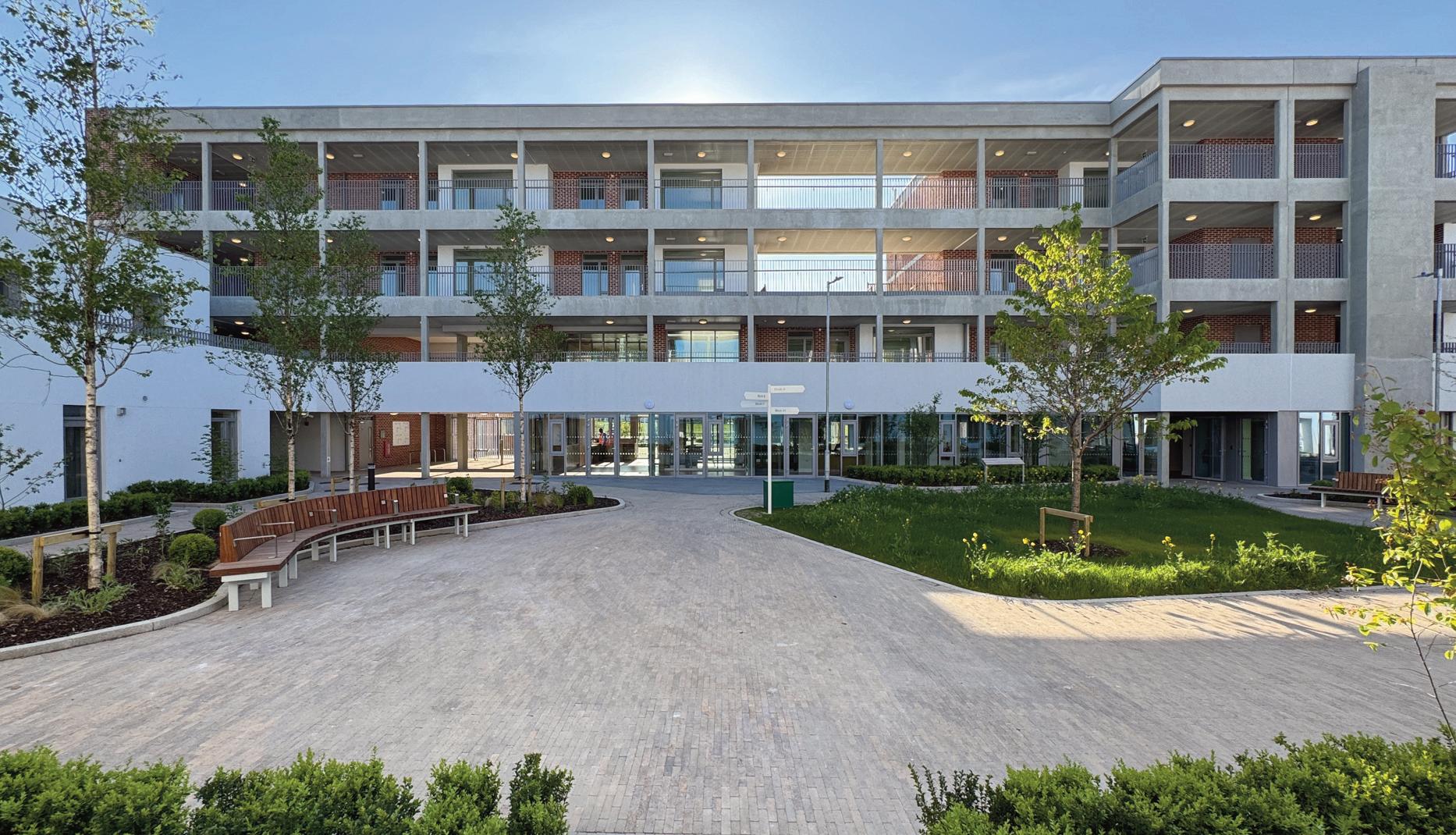
In early 2025, Circle completed Richmond Place, a purpose-built, 52apartment supported housing scheme designed to enable people to age in place with dignity, independence, and community connection.
Designed specifically for older people, it offers flexible living arrangements for individuals, couples, siblings, and those requiring overnight care. This Pathfinder Project, the first of its kind in Ireland, is an innovative model and offers a mix of 1.5- and two-bedroom apartments, specifically tailored to meet tenants’ evolving needs.
Richmond Place represents a pioneering model of supported housing for older people, delivered through a unique collaboration between Circle, ALONE, the HSE, and Dublin City Council. Central to its success is Circle’s partnership with ALONE, a national organisation providing tailored support to older persons, including onsite services that promote independence, wellbeing, and community connection.
The HSE further enhances this model
through the provision of visiting care packs, ensuring that tenants with medical or personal care needs receive consistent, responsive support within in their own homes.
Funded through Dublin City Council and the Capital Assistance Scheme (CAS), Richmond Place delivers high-quality, age-friendly housing that supports placemaking, liveability, and long-term adaptability including infrastructure to install ceiling hoists and soft walls for future adaptation. Each of the 52 apartments enjoys dual aspect, maximising light and enhancing ventilation. All apartments are fully accessible, support lifetime adaptability and will continue to meet the evolving needs of the resident. Wide corridors, level access, and clear sightlines create
a safe, welcoming environment. Richmond Place’s 1.5-bedroom units are specifically designed to accommodate carers or occasional overnight family visits. The twobedroom units are ideal for couples, siblings, or those requiring additional space due to health or care needs.
In collaboration with Tunstall Emergency Response, each apartment has an assistive technology system that enhances security and connectivity. Through 24-hour onsite enablement services, assistive technology and tailored support packages, Housing with Supports provides innovative, costefficient housing for older adults with support needs who can be empowered to live independently.
Innovative design choices including durable, low-maintenance materials and energy-efficient systems help to reduce long-term running costs and environmental impact. The apartments are built to A2 BER standard, addressing fuel poverty by reducing heating needs and supporting healthy indoor air quality.
Circle owns the properties and delivers tenancy and asset management to the Dublin scheme while ALONE provides onsite, 24/7 support services to the tenants. This includes regular care coordination, assessments, health and
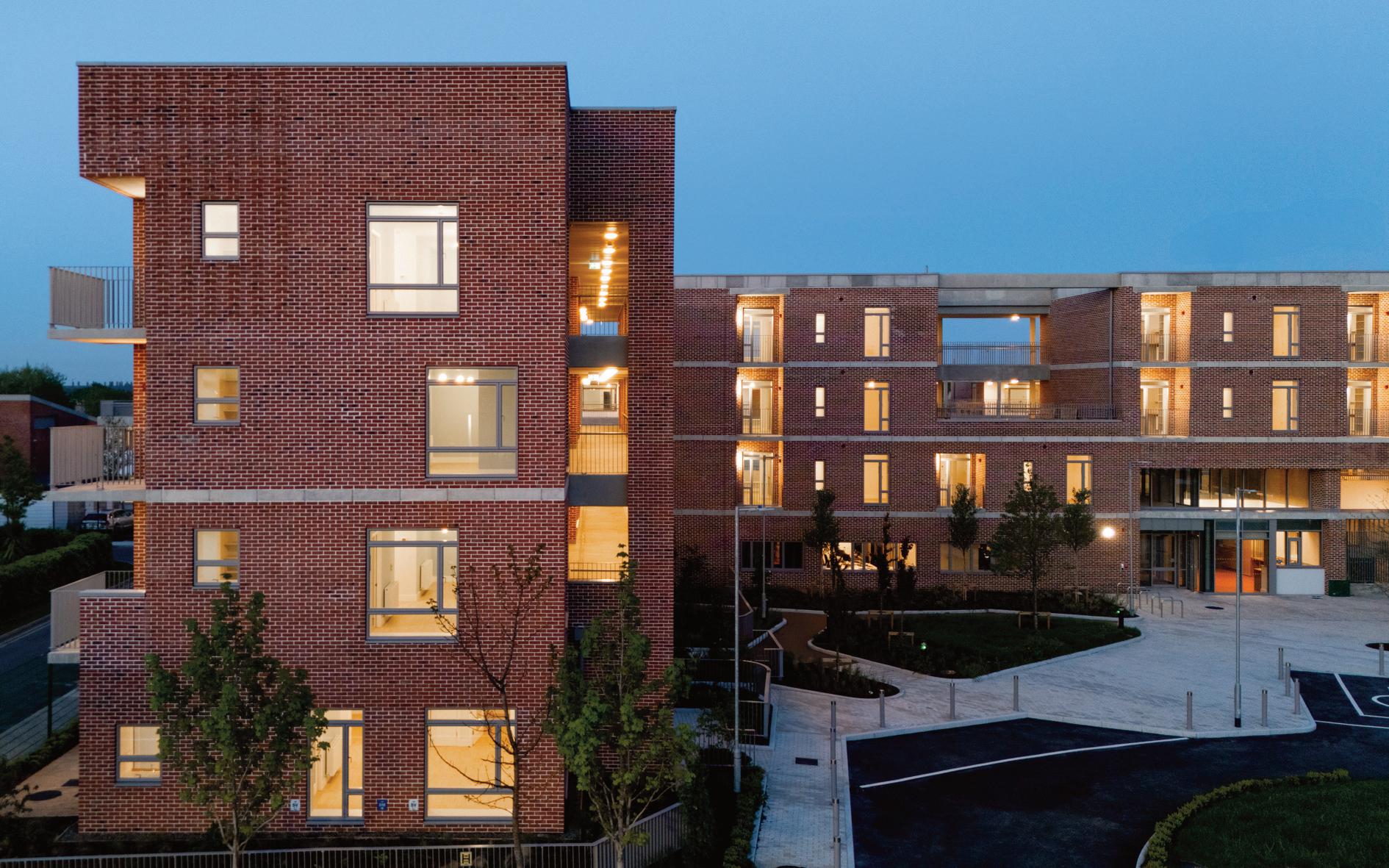
social care signposting and monitoring, volunteer befriending engagement and assistive technology alongside visiting care services from the HSE. A robust management framework ensures the Richmond Place scheme is safe, wellmaintained, and responsive to tenant needs.
A key innovation in this project was the allocation process which was uniquely supported by Dublin City Council. For the first time ever, Circle, ALONE, and the HSE worked together to identify older people most in need of this specific combination of housing and support. This person-centred approach ensured that the right homes were matched with the right people, maximising the impact of this groundbreaking initiative and setting a new standard for integrated housing in Ireland.
This integrated approach to housing and care is the result of a strong project steering group, whose members provided invaluable guidance to Circle and ALONE throughout the design, delivery, and development of the Richmond Place model. Their expertise shaped a housing solution that balances autonomy with access to care, an approach that is both scalable and replicable. Members of the group include Circle, ALONE, Dublin City Council, the Department of Health, the Department of Housing, the HSE (nationally and at a local area level), the Irish Council for Social Housing (ICSH) and Age Friendly Ireland.
Richmond Place is situated in the heart of Inchicore, Dublin 8, on a brownfield
site formerly part of the historic St Michael’s Estate. The location of this development was a deliberate choice and the result of extensive consultation. The team responsible for the scheme’s design and delivery includes Ganson, OBFA Architects, The Cummings Group, Delap and Waller, and Fearon O’Neill. The scheme forms a key part of Dublin City Council’s regeneration master plan, transforming the area into a sustainable and inclusive community. Although the tenure of this scheme is social housing, through the local authority’s financial contribution scheme, this unique model also supports older people who are homeowners, ensuring a diverse, integrated community. It is ideally situated within 500 metres of amenities such as shops, healthcare services, library and public transport including the Luas and several bus routes. Nearby green spaces such as Grattan Crescent Park and Lansdowne Valley Park promote active, healthy lifestyles.
The design and location of Richmond Place is integral to promoting and enabling independent living, wellbeing, and meaningful connection for older tenants. Community integration is supported through shared spaces that foster social interaction and wellbeing. A multipurpose community room, lounge areas, and salon for visiting hairdressers offer inclusive spaces for everyday use. Wide walkways connect gardens and internal courtyards that encourage social gatherings, promoting
connection, and reducing isolation. Nearby Richmond Barracks offers access to classes and social activities to support further integration into the local community.
Richmond Place’s well-designed, accessible homes in a supportive environment promote autonomy, facilitate right-sizing, and reduce reliance on the need for hospital or nursing home care. The scheme empowers older adults to maintain a high quality of life as they age, surrounded by community and the comforts of their own home.
Research shows that in cases where people live independently with access to integrated care, they are less likely to call emergency services and can be discharged from hospital quicker. This project represents a scalable supported housing model that blends environmental responsibility with social impact, providing a high-quality, dignified environment for older people. Delivered through an innovative new partnership model, Richmond Place offers a safe, inclusive, and empowering living environment where older people can thrive. W: www.circlevha.ie
Government has agreed to establish the Housing Activation Office (HAO) within the Department of Housing, Local Government and Heritage “to ensure a radical step change in housing supply”.
In Securing Ireland’s Future, the 2025 Programme for Government (PfG), government committed to integrating existing housing delivery groups into a new “Strategic housing and infrastructure delivery office” under remit of the Minister for Housing, James Browne TD.
The PfG envisioned that this office would help “coordinate and accelerate home building by unblocking infrastructure delays” while coordinating “investment in the servicing of zoned lands for homebuilding”.
Previously, in the Report of The Housing Commission, published May 2024, The Housing Commission arrived at a consensus “that it is essential to establish a body to address the functional administrative, technical, and practical barriers” in the housing system.
Identifying a Housing Delivery Oversight Executive (HDOE) “as the most appropriate vehicle... for this task”, the Commission recommended its establishment in legislation as a timelimited “decision-making body responsible for coordinating the delivery of housing”.
In late April 2025, the Minister for Housing announced cabinet’s approval of establishment of the Housing Activation Office.
Outlining the raison d’être for the new office, the Housing Minister explains: “The Housing Activation Office will do what it says on the tin – it will have the ability to seek out obstacles to growth, the agility to troubleshoot and ensure smoother delivery. In a nutshell it is a dedicated, expert team focused on activating sites and getting shovels moving where they are stalled.”
Specifically, the HAO’s three objectives are as follows:
1. Identifying and addressing barriers to the delivery of infrastructure projects crucial to housing development by aligning funding and coordinating infrastructure providers.
2. Engaging and aligning stakeholders to address barriers in a cohesive manner.
3. Delivering actions to coordinate and accelerate the delivery of necessary infrastructure and unblocking “issues on the ground”.
Meanwhile, the HAO’s scope of work focuses on two areas:
With a goal of accelerating housing delivery at site level, the HAO aims to:
• develop a programme of infrastructure investment which prioritises areas with housing need and greatest potential for delivery at scale; and
• oversee and coordinate the programme.
With a goal of supporting infrastructure planning for the delivery of sustainable communities on strategic sites (with emphasis on transport-orientated development (TOD)), the HAO aims to:
• coordinate stakeholders to identify the public infrastructure required to enable housing delivery; and
• develop a programme of infrastructure investment to support delivery on a phased basis, aligned
with investment in public transport.
Led by “an experienced CEO”, the HAO is tasked with engaging and aligning stakeholders such as local authorities, utilities, infrastructure providers, and industry to “enable an unblocking of housing development”.
While the current NAMA CEO was proposed to cabinet by Minister Browne, as the preferred appointee, subsequent political fallout provoked Brendan McDonagh to withdraw his interest. At the time of print, the HAO CEO has not been officially named.
The Housing Activation Office will be supported by a Housing Activation Delivery Group, comprising senior representatives from key government departments, as well as infrastructure providers, regulators, public housing delivery agencies, and “other public sector expertise”, and chaired by the Minister.
Furthermore, the Housing Activation Industry Group is intended to provide an opportunity for regular and structured engagement between the Housing Activation Office and industry representatives and, again, will be chaired by the Minister.
Staffed by a “multidisciplinary team” of seconded public sector and contracted expertise, the HAO’s terms of reference envision that “expertise will span programme and project management, planning, economic appraisal, infrastructure delivery, engineering, financial and legal etc.”.
Managing a planned “multiannual housing infrastructure budget” via the Towns and Cities Infrastructure
Investment Fund (to be determined by the review of the National Development Plan), the HAO will also be tasked with coordinating investment by infrastructure providers. Simultaneously, it will be required to “explore co-financing and other delivery models”.
Ultimately, the HAO is intended to deliver:
• a more coordinated and systematic approach to infrastructure enabling housing delivery; and
• a clear investment programme, with delivery metrics, “within six months”.
Describing the concept of the HAO as “ill-conceived form the start”, Sinn Féin housing spokesperson, Deputy Eoin Ó Broin remarks: “Along with vaguely defined Housing Activation Delivery Group and Housing Activation Industry Group also announced this week, the combined proposal creates more bureaucracy that will get in the way of public and private sector housing delivery.
“We do not need more red tape or more departmental committees. We need a radical reset in housing policy... they [government] should implement The Housing Commission proposal for a Housing Delivery Oversight Executive with emergency powers underpinned by legislation.”
Labour housing spokesperson, Conor Sheehan TD says: “We have heard plenty of noise about unblocking blockages, tackling shortfalls, and watching delivery, but nothing in black and white as to the legislative underpinning of the office, and if it will do more than check the Minister’s homework.”
Meanwhile, appearing before the Oireachtas Joint Committee on Housing on 10 June 2025, chairman and CEO of the O’Flynn group and former Commission member Michael O’Flynn asserted: “We saw the housing delivery oversight executive, as we call it and which has now graduated into being the [housing] activation office... as a body that would be time limited and established in legislation in order to give it the authority it needs to identify and address the blockages and make things happen across the sector, whether that involves zoning, high delivery zones, infrastructure deficiencies, water, wastewater, or utilities.
“This was a structure that would be introduced to change things immediately... At the time, we anticipated it being in the Taoiseach’s office so that it would operate across departments and make sure that immediate provision of housing would happen where it was not... That is very different from what is now being suggested.”
On the previous day, President of the Society of Chartered Surveyors Ireland (SCSI), Gerard O’Toole insisted: “The terms of reference for the [HAO] must facilitate greater collaboration and transparency. Regular and effective engagement with key industry stakeholders will be key to the success of this office. But so also will be accountability and ongoing measurement of activity.
“If the HAO can accelerate planning and procurement processes, improve access to finance for home builders and increase the supply of serviced development land, it will be deemed a success.”

“In a nutshell it [the HAO] is a dedicated, expert team focused on activating sites and getting shovels moving where they are stalled.”
for Housing James Browne TD

“We need a radical reset in housing policy... they [government] should implement The Housing Commission proposal for a Housing Delivery Oversight Executive.”
Eoin Ó Broin, housing spokesperson, Sinn Féin

“We have heard plenty of noise about unblocking blockages, tackling shortfalls, and watching delivery, but nothing in black and white as to the legislative underpinning of the office, and if it will do more than check the Minister’s homework.”
Conor Sheehan, housing spokesperson, Labour

“At the time, we anticipated it being in the Taoiseach’s office so that it [a Housing Delivery Oversight Executive] would operate across departments... That is very different from what is now being suggested.”
Michael O’Flynn, chairman and CEO of the O’Flynn group and former Commission member

“If the HAO can accelerate planning and procurement processes, improve access to finance for home builders and increase the supply of serviced development land, it will be deemed a success.”
Gerard O’Toole, President of the Society of Chartered Surveyors Ireland (SCSI)

Statutory adjudication pursuant to the Construction Contracts Act 2013 (‘the Act’) has established itself as an increasingly popular means of resolving payment disputes in the construction industry in Ireland, write Angelyn Rowan and Ian Murphy.
The popularity stems from the relative speed of the process and the ability to enforce an adjudicator’s award by way of High Court judgment.
Statutory adjudication was introduced in Ireland pursuant to the Act, (enacted in 2016), and entitles a party to a construction contract to refer a payment dispute to a statutory adjudication process. One of the key reasons for the introduction of the Act was to assist with cash-flow in the construction industry, particularly to subcontractors in the supply chain. The adjudication process, set out under the Act, involves a fast-track 28-day process, (which can be extended to 42 days), with an
outcome that is binding until either it is decided differently by the Courts or in arbitration or by way of a settlement between the parties. Notably, one cannot contract out of the Act. Whilst not the only means by which a payment dispute can be resolved, the most recent annual report of the Chairperson of the Construction Contracts Adjudication Panel shows a yearon-year growth in the use of the process. This trend, coupled with the judicial support for the process, means that those involved in housing development projects should be aware of the process and should be prepared to move quickly if they are at the receiving end of a notice to refer a payment dispute to statutory adjudication.
The most recent annual report of the Chairperson of the Construction Contracts Adjudication Panel shows that since July 2019, there has been a year-on-year increase in the number of appointments of adjudicators in Ireland, with 101 applications and 93 appointments in 2023/24. Of these, the most common parties are subcontractors and main contractors, followed closely by employers and main contractors. In 2023/24 alone, the total reported value of payment disputes was €42.2 million, with the average value being between €100,000 and €500,000.
In recent years, the Irish High Court has consistently endorsed statutory adjudication and not entertained arguments that sought to challenge an adjudicator’s decision or their jurisdiction. Indeed, the most recent Chairperson’s report documented that there were only two occasions where it was determined that an adjudicator lacked jurisdiction in the 12-month period between July 2023 and July 2024.
The recent case of Tenderbids Limited trading as Bastion v Electrical Waste Management Limited [2025] IEHC 139 slightly bucked this trend and is the first recorded decision where the High Court has refused to enforce an adjudicator’s award. This boiled down to a party failing to adhere to the correct means for the service of notices, which section 10 of the Act allows the parties to prescribe in their contract. This was ignored by the referring party who were required to serve the notice of intention to refer a payment dispute to adjudication by registered post but did so by way of email instead. The matter went to adjudication and the adjudicator made a payment award of €1.53 million in the referring party’s favour. Subsequently, the referring party issued High Court proceedings seeking to enforce the adjudicator’s award and entering judgment against the responding party. As a result of the referring party’s failure to adhere to the contractual notice provisions, the Court held that the payment dispute “was never validly referred to adjudication” and that “the purported adjudicator’s award is a nullity”. In those circumstances, the referring party’s application to enforce the €1.53 million award made in its favour was refused by the High Court. This is a salutary lesson on the need to strictly adhere to contractual provisions concerning the service of notices.
General awareness of the Act and in particular the payment provision requirements of the Act are also of key importance to the parties to a construction contract. If an employer or main contractor does not intend to pay the full amount of a claim for payment from a contractor or sub-contractor, then it must respond to the claim with a 21-day period of the “payment claim date” (which is defined in the Act as the date when a payment claim in relation to an amount due under a construction contract is required to be made). Failure to do so could potentially expose the paying party to the obligation to pay the full amount on foot of an adjudicator’s decision, regardless of the underlying factual position and the “true value” of contractor’s contractual entitlement. To avoid this scenario, the careful management of the payment claim process to adhere to the requirements of the Act is advised.
It is expected that the overall trend of judicial support for the Act and the enforcement of adjudicators’ decisions will continue. Statutory adjudication is here to stay as a forum for the resolution of payment disputes in construction contracts in Ireland. Given the expected acceleration and increase in the delivery of new housing developments in the years ahead, statutory adjudication will undoubtedly be the means through which many payment disputes in this sector will be determined and resolved.
Angelyn Rowan, Partner, Projects and Construction
T: 01 237 3700
E: arowan@philiplee.ie
W: www.philiplee.ie



Northern Minister for Communities Gordon Lyons MLA says that he aims to deliver “practical and innovative initiatives” that are “making a real difference” to housing supply, homelessness, and private sector regulation.
A key milestone, Lyons says, is securing housing as a priority within the Programme for Government, a longstanding demand from the sector. “For years, many have called for a standalone housing outcome, and that is what I have delivered,” he says.
“This challenges the entire Executive to get behind real solutions to our housing challenges.”
The foundation of this work, he explains, is the Housing Supply Strategy, which has now received full Executive endorsement: “This is the first strategy of its kind for Northern Ireland, and it provides a framework for how we will address long-term structural issues in the housing system.”
Despite financial constraints, Lyons confirms that his department has prioritised investment in social housing. “I secured over £170 million to deliver new social homes, and this means we will have started over 1,400 by the end of this financial year.”
He stresses that progress is already visible. “At the end of February, we had 5,200 social houses on site across Northern Ireland. That simply wasn’t possible this time last year.”
Beyond social housing, he highlights the expansion of the intermediate rent policy, with Maple and May selected as the first operator. “They will receive loan funding to deliver 300 new affordable homes, helping those who are struggling to access quality housing at the right price.”
Further funding has also been allocated to Co-Ownership, with £153 million allocated, aiming to deliver 4,000 shared ownership homes over four years. “For every £1 of government loan funding, £4 of private and mortgage finance will be leveraged,” he asserts.
On homelessness, Lyons says that his vision is to “make homelessness rare, brief, and non-recurrent”.
He highlights the Loan to Acquire Move-On Accommodation Scheme, a £10 million initiative which aims to enable homelessness charities to provide “well-managed, long-term private rented accommodation at an affordable rate”.
A major policy shift is the Housing Executive’s approval to purchase “up to 600 private sector properties” for use as temporary accommodation. “This will reduce reliance on costly, unsuitable accommodation while also creating significant savings for the homelessness budget,” he asserts.
“This is exactly the kind of innovative, radical thinking we need to ensure that homeless families have stability.”
The Minister states that reform of private rented sector regulation is “underway”. “We have already taken steps to improve affordability by limiting rent increases to once per year,” Lyons explains. “Work has also begun on providing greater security of tenure.”
To drive compliance, he states that his decision to transfer the Landlord Registration Scheme to councils, “professionalises the sector and ensures that standards are upheld”.
Further investment has been made in tenant support services, with £3.3 million allocated to Housing Rights over the next three years. “They play a critical role in preventing homelessness and providing advice, and I am committed to ensuring that work continues.”
In a significant policy shift, Lyons confirms that intimidation points will be removed from the housing selection scheme. “This levels the playing field for all victims of violence. Going forward, everyone will
be assessed using the same criteria, regardless of the cause.”
Lyons also highlights rapid progress on building safety legislation. “In March 2024, I committed to bringing forward legislation to address defects in residential buildings. Just four months later, that bill was passed.”
He describes this as the “first stage” in a wider transformation of building safety. “We are developing further legislation to ensure that homes and tall buildings are safe and stay safe.”
Looking ahead, Lyons stresses that reform will continue. “I told you last year [2024] that I would not be content to tinker around the edges. I hope my track record demonstrates that I am serious about delivering real change.”
He confirms his key priorities:
• increasing social housing supply through new delivery models;
• securing Housing Executive borrowing powers to enable large-scale investment;
• reforming home improvement grants, including the Disabled Facilities Grant;
• tackling tenancy fraud through new legislative proposals; and
• addressing fuel poverty, with a final strategy to be published by the end of 2025.
He also announces that a three-year action plan will be published by summer 2025. “This will set out clear, measurable targets, including ramping up our intermediate rent programme and addressing major supply barriers such as land availability and water infrastructure.”
Lyons calls on Executive colleagues to support these changes. “We need to think differently and find new ways to deliver with the resources we have. With the right policies and collaboration, I believe we can make significant progress in the year ahead.”
As he concludes, Lyons expresses confidence in the sector’s ability to drive change. “We have already achieved a great deal, but there is much more to do. I look forward to working with all of you to keep delivering solutions.”

Fold Housing has launched its new strategic plan, aiming to deliver a new model of housing for older people in Ireland.
Fold is an approved housing body delivering social housing supported by funding from local authorities and the Department of Housing, a designated care provider approved by the Health Information and Quality Authority and funded by the HSE, and a charitable organisation registered with the Charities Regulator. Fold was established in 2001 and brought our first homes into management in 2006.
Our specialism is housing for older people; we have 581 designated homes which includes two Housing with Care schemes for 112 residents. These HwC schemes are a unique social care model of housing for frail elderly and people living with dementia. In addition, we manage 193 general community homes and advocate for communities that meet the needs of all generations in Ireland.
Meeting the housing needs of older people in Ireland goes beyond the provision of appropriate accommodation. At Fold, we work at the coalface of both housing and care services and are very aware of the increasing demand for the work we do. It is very positive to see a focus on housing for older people in Securing Ireland’s Future, the current Programme for Government. Given this commitment we are hopeful of further work that brings together both housing and health agencies at national and local level to deliver
integrated solutions that support older people to live well in their communities.
The benefits of age-appropriate housing and the integration of community-led health and social care services for older people are well established in national policy and research, however, implementation remains limited. Proper housing, paired with access to community-based healthcare and preventative services, helps avoid hospital admissions and can prevent the need for long-term institutional care. This is aligned with the goals of national strategies, Sláintecare in the Department of Health and increased housing delivery and choice for older people which is the responsibility of the Department of Housing.
Our strategy at Fold draws on our existing skills and expertise and challenges us to work towards a new model of housing in our organisation. Coordinated investment, policy alignment, and joint planning at both national and local levels are critical to delivering meaningful, person-centred outcomes. Fold is well equipped and eager to play our part in delivering meaningful, person-centred outcomes for older people in Ireland.
By 2051 the 65+ age group is predicted to reach 1.5 million people, an increase of 50 per cent from 2023. However, this is only half the story, since 2016 the biggest increase in population, at 26 per cent, has

been in those aged 70+ and people over 80 are predicted to rise to half a million by 2051. This undoubtably has implications for our health and housing systems to meet the needs of this growing population in a cost-effective way.
For us in Fold it is about more than cost, we believe that appropriate person-centred housing and care can liberate life in older age and support vitality and independence. The option of meaningful choice is still a long way off for many people and we need to increase the supply and types of ageappropriate housing as well as provide funding for support and care when it is needed. This will keep older people at home in older age-appropriate homes.
To focus our attention on why Fold exists and what we want to achieve, our board worked with residents and colleagues to inform our decisions and provide clear direction on what we want to accomplish.
We are committed to ensuring that our work contributes positively to our vision of a society where older people have a great quality of life and choice
Our purpose is:
• to develop and manage homes that older people want to live in;
• to empower residents to live fulfilling lives and foster thriving communities; and
• work towards delivering a new model of housing at Fold where care is available if needed.
• Specialist older persons housing: Clusters of homes built to universal design standards with excellent communal and social spaces and an emergency alarm service. Early intervention and advocacy to access services when needed and a focus on social and communal activities that combat loneliness and isolation.
• A ‘new’ housing with care: All of the above with additional 24 hour onsite low-level support and the provision of personal care services in people’s homes. This personal care is only for those who need it and is instrumental in maintaining people’s ability to live independently for longer.
At Fold, we are committed to realising our purpose through strategic goals that emphasise maintaining high quality, strengthening governance, investing in our team, and driving operational excellence. These priorities form the foundation for our capacity to grow, influence positive change, and respond effectively to the evolving and increasing needs of older people in Ireland.
It is important to recognise that we can only realise our goals by working with others. We therefore continue to value our positive working relationships with residents and dedicated colleagues. Real progress also requires collaboration with external partners across housing, health, and social care sectors, underpinned by supportive policy, funding mechanisms, and local implementation. We will continue to
strengthen our voice to inform positive change, look forward to strengthening existing relationships and creating new partnerships that are essential to achieving the ambitions set out in our new strategic plan.

Lynda, 74: “You know, it became stable; stabilised if you know what I mean. I have no more worries about losing my home. If I had to rent private accommodation I would have become homeless very quick. I would not have security. I can come and go as I please. It’s my own door, my own home I say. I started off the gardens during the pandemic because I got my money back. I had a holiday booked and could not go. So, I said right I will spend it on the garden, and it was my gift to the community.”
T: 01 822 8804
E: enquries@foldireland.ie
W: https://www.foldhousing.ie/
Strategic Plan: https://www.foldhousing.ie/publications/


Dan Hill, Director of the Melbourne School of Design at the University of Melbourne, discusses examining climate policy integration with housing policy.
The Irish housing market continues to face significant supply constraints, with annual delivery targets set at approximately 50,000 units to meet projected demand. “The focus on quantitative delivery targets is typical, given the way the largely supply-side approaches to housing policy that tend to dominate,” Hill says. “However, this relatively narrow focus frequently fails to account for broader systemic considerations, particularly regarding immediate challenges of environmental sustainability, housing quality, existing housing stock, or long-term affordability and social justice.”
Data from the Central Statistics Office (CSO) indicates that while housing completions have increased by 18 per cent year-on-year, challenges persist regarding the composition of this supply. “The predominance of threeand four-bedroom detached dwellings, within a focus on new construction, does not align with demographic trends showing increasing numbers of singleperson households, nor the importance of retrofitting what we have already built,” Hill observes. “This mismatch between supply and demand characteristics, or housing needs
versus industry desires, tends to represent one of many structural inefficiencies in housing delivery systems.”
On the environmental implications of current construction practices, Hill says: “Business-as-usual construction methods, tending towards brick, concrete, and steel, typically generate significant emissions per square meter of housing space constructed,” he stated. “When multiplied across tens of thousands of housing units annually, the cumulative emissions impact pushes way beyond the ‘planetary boundaries’ implied by the Paris Agreement, which almost all countries, including Ireland, have signed up to.”
Comparative data from the Building in a Climate Emergency research initiative suggests that alternative construction approaches could radically reduce these emissions. “Predominantly working with biomaterials – such as numerous forms of timber, hempcrete, straw panel insulation, stone and for
instance, offer comparable structural performance with significantly lower embodied carbon, as would carefully re-purposing existing building materials,” Hill explains. “Several European jurisdictions have successfully implemented such methods at scale, including Sweden, Austria, Denmark, and France.”
Hill emphasises the underutilised potential of Ireland’s existing housing stock. “Approximately 65 per cent of Ireland’s residential buildings were constructed before 1990, with many exhibiting poor energy efficiency characteristics,” he notes. “Comprehensive retrofit programmes could simultaneously address housing adequacy and climate objectives, as well as improving health outcomes.”
The Sustainable Energy Authority of Ireland estimates that deep retrofits could reduce energy consumption in these properties by between 60 and 70 per cent.

“Housing policy cannot be developed in isolation from climate, transport, and energy policies.”
Dan Hill, Director of the
“The economic case for retrofitting becomes particularly compelling when considering whole-life cost analysis,” Hill adds. “While initial capital costs are higher than conventional refurbishment, the long-term operational savings and emissions reductions justify the investment.”
Discussing the relationship between land use policy and housing outcomes, Hill asserts: “Many of the world’s cities are now actively moving beyond cardependency, reversing the trends of the second half of the 20th century. Cities such as London, Barcelona, New York, Paris, Singapore, Tokyo, Stockholm, Copenhagen, and Amsterdam are all squeezing the car out of public spaces, like streets, and actively reducing overall car use. Yet current zoning regulations in many Irish local authorities, as with many Australian cities, continue to prioritise low-density, car-dependent development patterns. This approach not only increases per-unit infrastructure costs but also locks in high-emission transportation patterns, along with poor health outcomes, for decades.”
Comparative analysis of European planning systems suggests alternative models. “The ‘compact city’ policy framework common to many other European cities demonstrates how strategic densification around transport nodes could support housing delivery in Ireland too, reducing environmental impacts whilst increasing public health, particularly in the Greater Dublin Area,” Hill states.
Hill believes that existing financial and regulatory mechanisms could support more sustainable housing delivery.
“Current market conditions continue to favour conventional development models due to established valuation practices and financing structures. Policy interventions could help recalibrate these incentives.”
He cites several potential instruments:
1. differentiated development levies based on sustainability performance, particularly now including embodied emissions;
2. accelerated capital allowances for very lowemissions construction methods;
3. mandatory whole-life emissions assessments for major developments; and
4. reform of property tax systems to reflect environmental performance and reduce financialisation of the housing sector.
“Such measures have been successfully implemented in various jurisdictions, yet Ireland must find its own way forward here,” Hill says. “That will depend on clear regulatory and policy signals and consistent enforcement, as well as invention and innovation by industry and community.”
“Transitioning to more sustainable construction methods requires parallel investment in workforce development,” Hill says. “Current programmes, from higher education to apprenticeships, often lack comprehensive coverage of emerging technologies and methodologies, and crucially about whole lifecycle emissions.”
Hill emphasises the importance of crossdepartmental coordination. “Housing policy cannot be developed in isolation from climate, transport, and energy policies,” he states. “The current siloed approach to policy development frequently results in contradictory outcomes and missed synergies.”
Concluding, he says the mission-oriented approach taken by the Swedish Government’s innovation agency Vinnova “provides a useful case study for building nationwide movements, aligning sectoral policies with overarching sustainability goals, and bringing together public, private, and community sectors with shared ambition”.

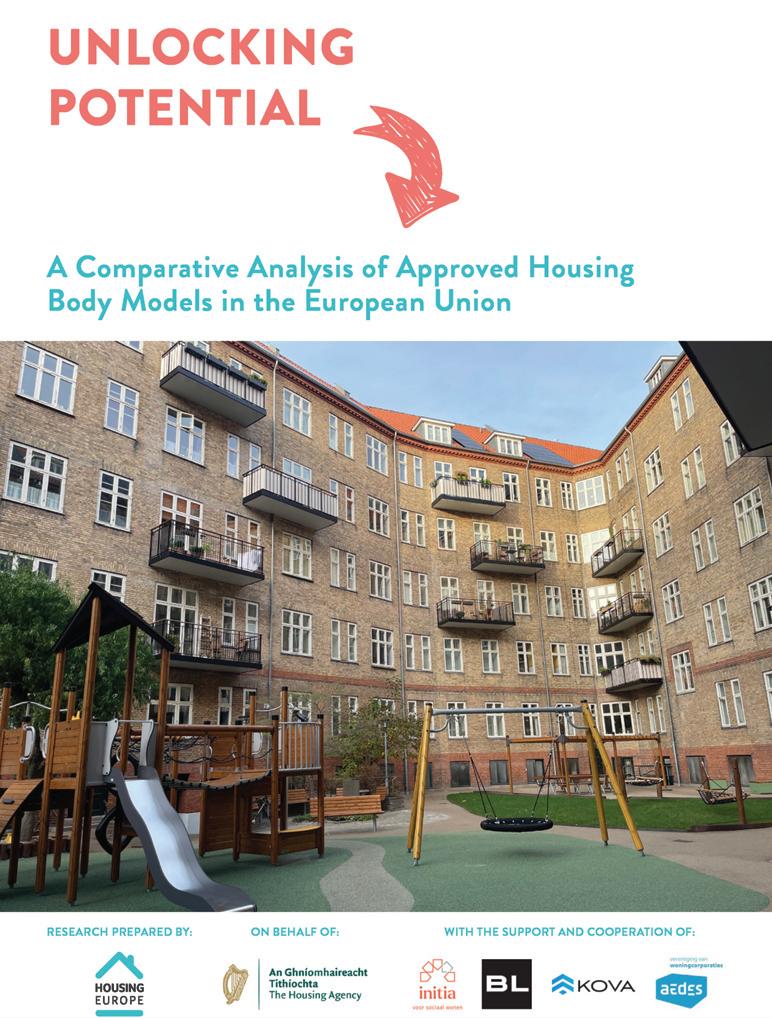



Approved housing bodies (AHBs) are independent, not-for-profit organisations. They provide affordable rented housing for people who cannot afford to pay private sector rents or buy their own homes; or for particular groups, such as older people or homeless people. AHBs work closely with the Government, local authorities, and relevant agencies, writes Adele Lacey, Research Analyst at The Housing Agency.
Since 2021 the Approved Housing Bodies Regulatory Authority (AHBRA) regulates AHBs for the purposes of protecting housing assets provided or managed by such bodies. As of the end of 2023, 445 AHBs were registered with AHBRA. The Irish Council for Social Housing sets out that the sector provides in the region of 62,000 homes.
The previous Government’s Housing for All plan provided that a strategic review of the AHB sector would take place. This review included the establishment of an ‘AHB Strategic Forum’, which has been mandated to consider a range of strategic long-term issues facing the sector and to set a vision for the sector over the next 10 years. The work of the Forum is ongoing and has facilitated a range of sectoral and stakeholder engagement activities, a consultation process and research.
To inform part of this work, The Housing Agency commissioned research on how AHBtype bodies operate in other jurisdictions in the EU. Housing Europe was commissioned to carry out this research and collaborated with national and regional housing experts in Belgium (Flanders), Denmark, Finland, and the Netherlands to identify bodies operating in a similar fashion to AHBs in Ireland and to provide a profile of such bodies.
The research report, Unlocking Potential – A Comparative Analysis of Approved Housing Body Models in the European Union, provides a profile of each jurisdiction drawing out context on the governance position of the bodies and their strategic role, their approach to asset and tenant management (including calculating rents) and how they deliver and finance housing. Relevant case studies are highlighted including the following:
• a recent major restructuring of Flemish social housing bodies with learnings on how housing body mergers played out;
• Aster (Flanders), a social housing renewable energy company which is owned by the Flemish social housing companies;
• Landsbyggefonden, the Danish National Building Fund, owned by the Danish non-profit housing providers as a revolving fund;
• the Y Foundation, the body which provides for Housing First in Finland and has done so since the 1980s;
• Habion, which is a specialist housing association for the elderly in the Netherlands with c. 11,000 units; and
• local authority housing organisations (LAHO) type models (mentioned in The Housing Commission report in 2024) and how they work in Finland and Flanders.
A core aim of this research was to gain insight into how AHB-type bodies in other jurisdictions operate and shine light on approaches that are of note to housing policy and practice in Ireland. Housing Europe created a summary of potential points of interest for Ireland from each jurisdiction. These include the following:
• the region has just completed a series of major reforms of the bodies that provide social housing, offering a clear and timely case study for the Irish authorities; and
• the system uses income-based rents for social tenants (like Irish differential rents) but has structured them in a way that means the system is overall more self-sufficient than in Ireland.
• shows how a fully cost-rental based model can be effective;
• shows that strong links to the state, in terms of financing and oversight, are possible, whilst also being independent enough to be ‘off-book’; and
• allows for counter-cyclical investment patterns.
• based on an innovative ‘private’ financing model, that is actually state directed;
• shows the benefits of developing a system with relatively large social housing providers, which helps to reinforce autonomy, drive innovation, and ensure that housing remains affordable even if construction prices increase;
• provides an example of the benefits of relying on municipally controlled ‘housing companies’, rather than directly state-operated local housing departments in terms of developing greater sectoral specialisation; and
• shows the benefits of having specialised housing providers to meet the needs of specific target groups, e.g., those experiencing homelessness.
• an example of how the state can transition from having a strong role to play in financing social providers, to a far less exchequer-intensive system, without sacrificing either the providers or their tenants; and
• providers can build up reserves to reinvest in the sector, and ensure that meeting renovation targets is possible without significant state support.
As indicated, the report provides a wealth of further detail on the operation of AHBtype bodies and additional reflections on what makes such bodies work well to deliver homes. Research such as this always highlights that great insights can be gained from collaboration with our European counterparts, and in this case informs the evidence base for the ongoing strategic review of the AHB sector.
To learn more about The Housing Agency’s publications visit: www.housingagency.ie/publications


Tom Grey, Research Fellow at TrinityHaus Research Centre, Trinity College Dublin (TCD) outlines the “urgent need” for a national housing condition survey, and the imperative to expand and strengthen the comprehensive approach to housing that is being provided through collaborations between the Integrated Care Programme for Older People, local authorities, and the Healthy Age Friendly Homes Programme.
He lays out the findings from a Meath Foundation funded research report titled Housing Conditions and Integrated Care of Older People, which was conducted by TCD, Tallaght University Hospital (TUH), Age Friendly Ireland, and the Building Research Establishment (BRE), and supported by The Housing Agency, South Dublin County Council, Age Action, Meath County Council, and the NDA’s Centre for Excellence in Universal Design.
The research includes findings from a previous 2020 BRE report looking at The Cost of Poor Housing in Ireland and contains results from a pilot housing condition survey conducted by the BRE as part of this project. The survey
features a Housing Health and Safety Rating System (HHSRS) which assesses housing conditions across four categories:
1. physiological such as damp or mould growth;
2. psychological such as overcrowding and entry by intruders;
3. protection against infection such as food safety; and
4. protection against accidents such as falls and fire.
Grey breaks down the key findings and recommendations of the study across seven key themes.
He explains that around 8 per cent of homes in Ireland “are likely to present serious health and safety risks”, with common hazards including cold, and home incidents. Grey adds that “older persons are particularly affected by these conditions”.
He explains that this is because they are “are statistically more likely to live in homes with poor conditions”, to be badly affected by falls and exposure to cold, and “they are more likely to spend more time in that home, exposed to those poor conditions”.
The study recommends the provision of a “centralised, integrated, and accessible database”. Grey asserts that it should include information on the age of household members, the proportion of households with disabilities, and if properties are privately owned or not. He adds that it should cover universally designed homes, age-friendly dwellings, adapted dwellings, and energy retrofit dwellings.
The Report recommends that the HHSRS study is used as part of any future housing surveys in the Republic of Ireland. Grey says “additional modules” could be included in future applications of the HHSRS in the State that could “specifically focus on housing conditions or hazards for older people, persons with disabilities, or older people with cognitive impairments”.
During the research, case studies were carried out in 10 households in the catchment area of TUH. Grey caveats the case studies by saying: “They were very well adapted. A lot of them had been insulated and upgraded recently, but we were still finding issues.”
The Research Fellow explains that these issues pertained to physiological conditions including cold; protection against infection including hygiene, sanitation, and drainage; and protection against accidents such as falls. Grey asserts that there is “an evident need for a housing condition survey of the housing stock of the Republic of Ireland for the general population at least every five years”.
To prepare for this, Grey recommends “conducting a nationwide pilot project looking at approximately 1,000 dwellings across representative geographical locations and key housing typologies”.
Grey states that the collaboration between integrated care teams (ICTs), local authorities and Age Friendly Ireland as part of the Healthy AgeFriendly Housing (HAFH) programme “is an exemplar” of multi-agency collaboration. The report outlined a range of recommendations including

“Many of the people we interviewed advocated for an over-arching care professional that would provide continuous advice and support for a person or patient moving from the hospital back home, or into residential care.”
Tom
specific recommendations to enhance integration across key partners.
One is to examine ways to anonymise, digitise, and make available data collected by ICTs to inform housing and health-related research, policy, and practice, including issues related to older people with complex care needs. Grey asserts that ICTs are “gathering an extraordinary amount of data”. He adds: “This is an example of data that’s out there that we could be anonymising and moving into the system.”
The second recommendation is that the South Dublin County Council AgeFriendly Housing technical advisor and local coordinators for the HAFH programme should continue attending ICT and multidisciplinary teams meetings. Grey observes that this “gives them a fantastic insight into the conditions of people living at home”.
The report asserts that ad-hoc relationships between patients, carers, and family members, healthcare or housing professionals, or the local authority “undermines support for older people in the context of housing, care, and health”.
This problem is addressed in the third recommendation outlined in the report. Grey says: “Many of the people we interviewed advocated for an overarching care professional that would provide continuous advice and support for a person or patient moving from the hospital back home, or into residential care.”
The report recommends the continued development of the HAFH programme and the rollout of local coordinators across all 31 local authorities in the Republic of Ireland. This is pinned as a way to “provided much-needed support and advice for older people and help them navigate the grants process”.
“The grants process is complex and requires people to engage with multiple agencies. A lot of older people and their family members are baffled by this process. Streamlining that process and supporting people is really important. That is where the local coordinators come in.”
The report highlights the Housing Options for Our Ageing Population policy statement, the HAFH programme, and upcoming Universal Design Dwellings standard as methods to improve housing conditions. Grey says: “We need a step-change but let’s use the things that are working as much as possible.”
Note: This project is part of the work being conducted by the Housing Conditions for Older People Research Group, which is chaired by The Housing Agency and involves Age Friendly Ireland, TrinityHaus (TCD), BRE, Age Action, South Dublin County Council, and the Centre for Excellence in Universal Design at the NDA.

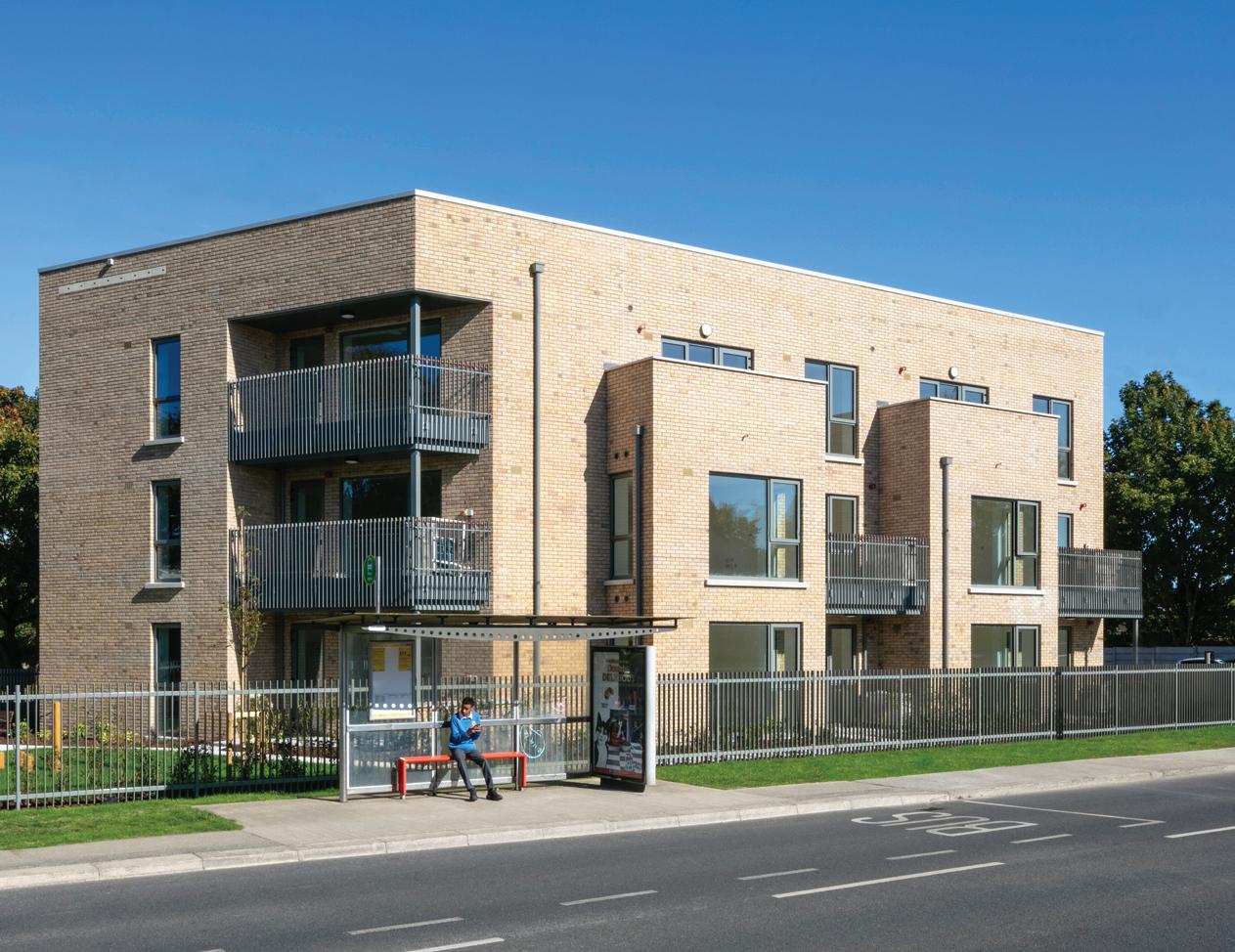
As you drive west out of Swords on the R125 towards Ashbourne there used be a small depot which was previously used by Fingal County Council’s Operations Department and the Civil Defence.
Today, there is no trace of its former existence because the buildings and yard that once stood here have been replaced by 11 new age-friendly apartments in a development now known as Bowden Court.
In the centre of Swords – beside Swords Castle and County Hall – two large cranes dominate the skyline. They are on the site of the new €40 million
Culture House that Fingal County Council is building as part of the Swords Cultural Quarter which will, when it opens in 2027, house a library, theatre, gallery and arts spaces.
But the Council’s contractors Duggan Brothers are also working on the other side of the street, as a key component of the overall construction here includes the delivery of Seatown Place, a
development of 36 apartments for Fingal County Council, replacing the 12 houses that previously stood on the site.
Around the corner on North Street, across the road from the local credit union, and next door to Fingal Community College, there are two vacant, semi-detached 19th century dwellings situated on a 0.3 acre site. The Council purchased the semi derelict buildings and underutilised brownfield site in 2020 and have planning permission for 13 homes with construction due to commence later this year.
Ten kilometres away near the coast in Portrane, the Council have also just completed the ambitious restoration of 14 vacant and derelict cottages on Portrane Avenue. The properties which once housed staff in the nearby St Ita’s Psychiatric Hospital, were provided to Fingal County Council by the HSE, and have been transformed into bright liveable homes. Located in an architectural conservation area, the properties have been conserved in line with how they were originally built, with great effort made to recreate the sash windows, preserve and reinstate old roof tiles and source matching tiles and slates. The houses have also been brought up to modern standards with each house replumbed, rewired and upgraded with modern heating systems and insulation.
These four projects alone will help take 75 families off the housing list and into housing located in already established communities with the social infrastructure already in place. They are tangible evidence that the ambitions of Fingal’s Vacant Homes Action Plan are being realised and it is helping to
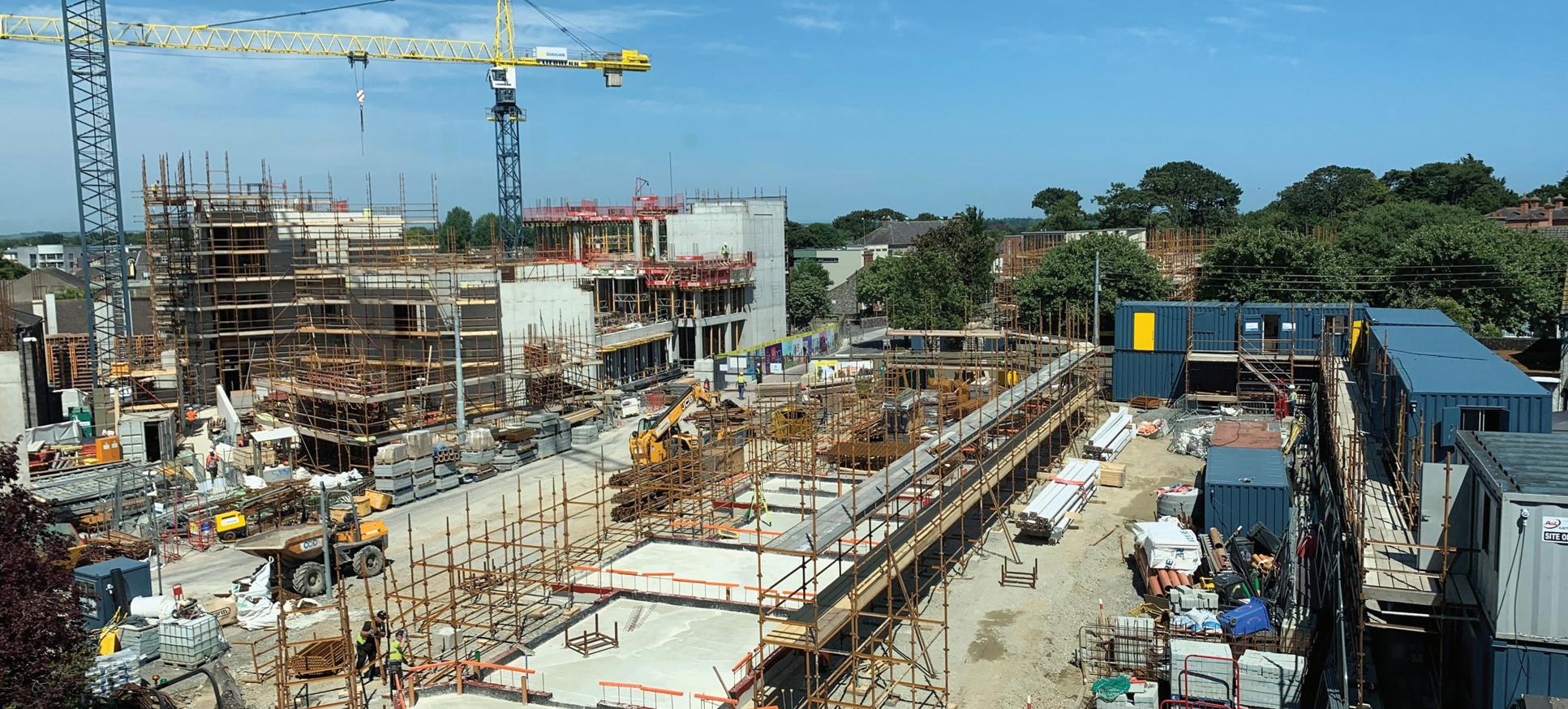
increase the availability of housing options in a county where demand is extremely high for different types and tenure of housing.
Fingal has taken a targeted approach to identifying vacant housing units with the intention of bringing these properties back into use for both private and social housing. It is also keen to promote town and village centre development as a positive town and village centre environment can help reduce dereliction and vacancy and there is strong cooperation between the Council’s Vacant Homes Officer and the Town Centre Regeneration Officer.
Between 2019 and 2021 the Council brought 70 vacant properties back into use using schemes such as Repair and Lease, Buy and Renew and Compulsory Purchase Orders as well as direct engagement with owners and banks.
A detailed survey dataset – provided by the Department of Housing, Local Government and Heritage in 2023 – led to the identification of over 650 potentially vacant private residential units across Fingal. Following on-site surveys in the same year by the Council’s Vacant Homes Team, 284 of these properties were confirmed as vacant. The Vacant Homes Team initiated contact with these property owners and is presently engaging with a large number of these property owners, with a view to bringing them back into occupancy.
One of the pillars of Fingal’s Vacant Homes Action Plan is the Croí Cónaithe Vacant Homes Refurbishment Grant Scheme which was launched in July 2022 and then extended in May 2023 to allow for properties built pre-2008 to qualify and to increase the grants to
“We have shown how a site or a property can be transformed, and we can do a lot more if we continue to get the necessary funding support.”
€50,000 for vacant properties and €70,000 for those that are vacant and derelict. The expansion of the scheme also allows for properties to be rented on the private rented market rather than being the applicant’s principal private residence and the changes have definitely increased interest.
Since the launch of the scheme, Fingal have received around 200 applications, three-quarters of which have been approved and will result in some €7.5 million in funding going towards the refurbishments.
Fingal County Council’s Director of Housing and Community Development, Paul Carroll, is happy that tangible results are being seen from the Vacant Homes Action Plan
“It is great to be able to develop our own sites and create new family homes, such as at the old depot site in Swords. Similarly, identifying vacant properties and derelict sites across the county and working with the owners to either repair or develop those properties can be a challenging process, but the results speak for themselves, with over 150 vacant properties being brought back into residential use through initiatives like the Croí Cónaithe vacant property
grant,” says Carroll.
The Mayor of Fingal, Councillor Brian McDonagh, added: “The Council have led by example when it comes to vacancy and dereliction by taking our own properties and sites and developing so that we are increasing our housing stock and moving people off the housing list. We have shown how a site or a property can be transformed, and we can do a lot more if we continue to get the necessary funding support from the Department of Housing, Local Government and Heritage.”
By repurposing derelict and vacant properties directly and assisting property owners do so themselves, Fingal is not only expanding the availability of affordable and social housing, but also assisting the revitalising of neighbourhoods and the creation of vibrant communities which is very much in keeping with the Government’s Housing for All strategy and the objective of addressing vacancy and efficiently using the existing housing stock.
W: www.fingal.ie

Nick Horne, Chief Executive of Wythenshawe Community Housing Group (WCHG), discusses the lessons learned from the Greater Manchester Social Housing Digital Inclusion Pilot.
Initiated in 2023 under the coordination of the Greater Manchester Combined Authority (GMCA) and participating housing providers, the pilot sought to explore the feasibility of scaling lowcost internet access across the social housing sector through voluntary collaboration with commercial providers.
The pilot was instigated following an invitation from the Mayor of Greater Manchester, Andy Burnham, with
delivery coordinated across five housing associations and five telecoms providers.
WCHG manages 14,000 homes in south Manchester. Of these, approximately half are located in the 10 per cent most deprived areas of England. Horne outlines that digital poverty was significantly above average in these neighbourhoods. GM housing providers collectively own and manage 260,000 homes, which is around 20 per
cent of all housing in the area. Internal analysis estimates that 55 per cent of residents across this stock experience some form of digital poverty, exceeding both regional and national benchmarks.
Digital poverty is defined using four key barriers identified by Ofcom: affordability, access, skills/ability, and motivation. The term refers to the unequal capacity to access and use digital technology in ways that facilitate full societal participation. Horne also references the definition produced by the Good Things Foundation as an appropriate framing tool for policy and service planning purposes.
The pilot involved five housing associations, each paired with one of five major internet service providers (ISPs). WCHG worked with Virgin Media O2. Each housing provider identified 1,000 residents who were likely to be digitally excluded, based on internal data and proxy indicators. Residents were offered low-cost broadband social tariffs (typically £10–15/month), without
contract lock-in, alongside free mobile data SIMs where applicable.
The project was unfunded by central government, instead relying on in-kind and direct contributions from ISPs and housing associations. The University of Liverpool provided independent academic observation, and the programme was supported by the GMCA, the 10 Greater Manchester local authorities, VCSEs, and NHS bodies.
The pilot encountered several structural and operational challenges, which cumulatively limited uptake to approximately 5 per cent of the target households:
1. Data deficiencies: Participating housing providers generally lacked accurate or sufficient data to reliably identify digital exclusion among residents. Initial segmentation was based on proxy measures, such as the presence or absence of email addresses, which proved inadequate.
2. Unclear definitions: Providers lacked a shared or operationalised definition of what constitutes “digitally included”. Many tenants used smartphones for communication or entertainment but were unable to transact with public services online (e.g., Universal Credit applications, NHS appointments).
3. Transformation programme disconnect: Digital inclusion was not embedded within the broader digital transformation programmes being undertaken by most of the housing organisations. For example, the WCHG digital channel shift programme did not until recently appropriately reflect resident capacity to use digital channels, thereby risking increasing digital inequalities.
4. Low motivation among residents: The most significant barrier to uptake was found to be motivational. Many residents reported they did not perceive a need for broadband access. The pilot indicated that demand stimulation must be considered a prerequisite for intervention design.
5. Internal fragmentation: Within housing associations, relevant internal teams (e.g., tenancy support, asset management, data, customer insight, communications) too operated in silos when considering digital inclusion
“Digital access has to be framed as a core infrastructure requirement, not an optional add-on. ”
programmes. Digital inclusion was not always a cross-cutting strategic priority.
6. Infrastructure constraints: Physical barriers (e.g., property access, installation issues, planning rules) impacted delivery feasibility, particularly in tower blocks. Engagement from asset management teams was identified as essential. The programme partners developed a standardised Wayleave Agreement as one positive solution to this issue
In response to the above findings, WCHG and partner organisations developed a 12-point implementation programme for digital inclusion. The key components are:
1. Improve resident data: Build accurate digital capability profiles across the resident base using direct engagement and structured datasets.
2. Operational definition: Develop and adopt a working definition of digital inclusion with measurable competencies.
3. Integrate with digital transformation: Ensure residentfacing digital inclusion is embedded in internal service change processes.
4. Address motivation: Design interventions that focus on positive incentives and demonstrated value to residents.
5. Enhance internal coordination: Establish cross-functional working groups to deliver integrated approaches.
6. Link to existing programme spend: Align digital inclusion activities with funding and interventions in health, welfare, and education.
7. Partnership development: Sustain partnerships with telcos, local authorities, health services, and charities.
8. Test alternative delivery models: Explore options such as community-wide Wi-Fi
infrastructure, including mesh networks (as trialled in Rochdale).
9. Secure funding: Frame digital inclusion as a long-term invest-tosave opportunity and ensure executive sponsorship.
10. Retain printed communications: Maintain traditional communications channels to avoid exacerbating exclusion.
11. Promote social tariffs: Continue promoting discounted broadband offers, while recognising their limitations.
12. Support capability development: Provide accessible digital access points (e.g., libraries, GP surgeries, community centres) and wraparound support.
The UK Government’s Department for Science, Innovation and Technology (DSIT) published the Digital Inclusion Action Plan: First Steps in May 2025. Horne identifies this as the most coherent strategic statement from central government to date and encouraged housing providers to align future local programmes with its principles.
Concluding, he says: “What the pilot demonstrates is that digital inclusion cannot be treated as a standalone issue. It is structurally embedded in how we deliver services, communicate with residents, and design housing programmes. The barriers we encountered – from poor internal data to low resident motivation – are not isolated problems. They reflect wider operational assumptions about resident capability and service readiness.
“Going forward, digital access has to be framed as a core infrastructure requirement, not an optional add-on. That means integrated planning, sustained funding, and a cross-sector approach that recognises digital inclusion as essential to tenancy sustainment, health outcomes, and access to public services.”


Housing is the defining issue of our generation. The ongoing housing crisis has had wide ranging effects on all aspects of Irish life. In the recent Growing up in Ireland survey by the Central Statistics Office (CSO), 98 per cent of Irish people aged 25 listed access to housing as a major issue of concern, ahead of mental health, poverty, race, or gender equality, writes Bord Gáis Energy’s Claire Madden. Claire Madden, General Counsel, Bord Gais Energy
Bord Gáis Energy has been delivering energy to Irish customers for almost 50 years. Our business has been, and continues to be, premised on the ability to power, heat and make a home. As a business, we are committed to energising a greener, fairer future in this country. Access to housing is a fundamental requirement of that future.
Getting homes built is not just a matter of planning and construction. It is a matter of connection – to water, to communications and to power.
Bord Gáis Energy operates Whitegate Power Station in County Cork which can provide up to 10 per cent of Ireland’s demand. With the support of its shareholder Centrica, Bord Gáis Energy has committed to invest €1 billion over five years in Ireland – beginning with the commissioning of two peaker plants targeted for later this year. These plants will underpin security of supply on an increasingly renewable-based system – responding flexibly when the wind does not blow and the sun does not shine.
While the supply of power is critical, we also urgently need to invest in grid infrastructure to make connections a reality. A robust and modern grid is foundational to Ireland’s green energy and housing ambitions. That investment must also be matched with resources and recruitment at critical agencies tasked with ensuring the delivery of a robust, secure and decarbonised network, such as
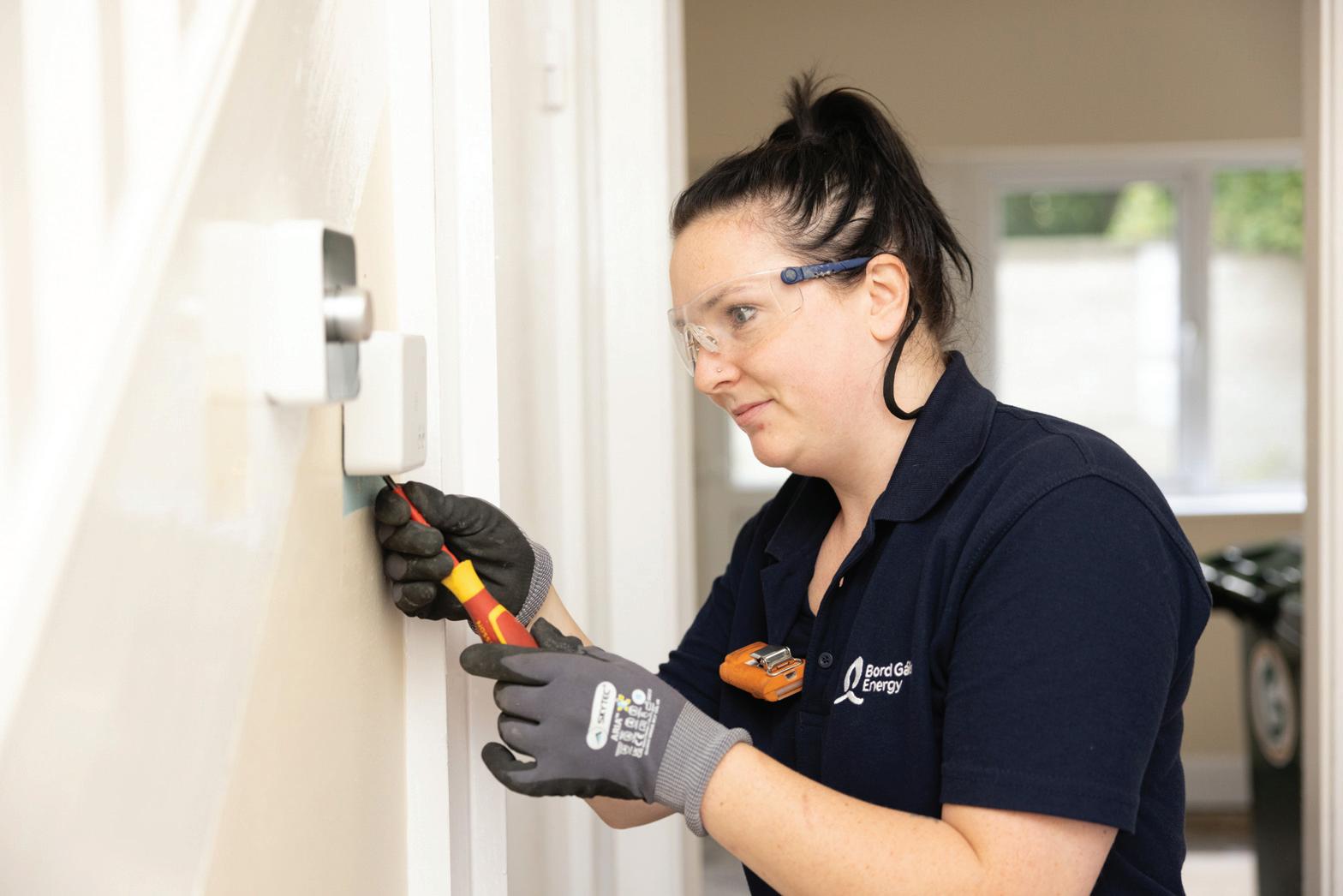
Eirgrid, ESB Networks, the Commission for Regulation of Utilities (CRU), and the departments of energy and enterprise. We welcome the recent commitment of resources to An Coimisiún Pleanála. This needs to be matched in other essential agencies.
While efforts to increase the housing stock continue, we must not lose sight of the comfort and efficiency of our existing stock. Energy efficiency has become a central focus for both homeowners and businesses in recent years as society responds to the growing concerns of the climate crisis and the volatility of energy prices. Our customers are more alert to how they use energy and there is a growing awareness of the supports through which they can be more energy efficient, such as the grants available for upgrades and retrofits to homes and businesses.
This without doubt requires a continuation of government supports to homeowners who wish to make their properties more energy-efficient in a bid to reduce carbon emissions. The success of this can be seen in the significant year-on-year increases in home energy upgrades recorded by the Sustainable Energy Authority of Ireland (SEAI).
But it is not just government leading on this agenda, nor should it be. Industry too is playing its part.
To demonstrate this, we in Bord Gáis Energy – as part of that commitment to a greener, fairer future – recently launched our One Stop Shop service, recognised by the SEAI, which aims to support customers in decarbonising their homes and work towards reaching net zero by 2050. The service allows us to help customers create warmer, more energy-efficient homes, reducing their energy bills and carbon footprint. Our team of experts guide customers
from start to finish, evaluating their needs, recommending the best solutions, securing SEAI grants and managing the works.
The net result is a minimum B2 BER rating on work completion.
Finally, as well as ensuring homes are as energy efficient as possible, we must ensure that the energy flowing into those homes has also been decarbonised. Here too, government has led, spearheading new supports on wind, solar and other forms of renewable energy generation. Again too, Bord Gáis Energy will play its part.
So when it comes to housing, there is lots to do, but lots to achieve. Let us continue our work. W: www.bordgaisenergy.ie

Reforms to the rental sector aimed at increasing private investment to increase supply while enhancing security for tenants were announced in early June 2025 on foot of recommendations made by The Housing Agency in its Review of Rent Pressure Zones Report.
The most significant reform was the extension of the rent pressure zone (RPZ) system which caps annual rent increases at 2 per cent of a property’s value or the consumer price index rate of inflation. Under the Residential Tenancies (Amendment) Bill 2025 approved by the Government on 17 June 2025, the RPZ system extends to the entire state and will apply until 28 February 2026. Previously, approximately 83 per cent of tenancies were located in RPZs and the new measures will see an additional 40,000 tenancies under rent control measures.

Initially set to apply from March 2026, it came into force on 20 June 2025 after it was pushed through when it was pointed out by opposition TDs suggested that landlords could raise rents before the regulations came into effect in March 2026.
To increase rent, landlords must provide tenants with a written notice of rent review and 90 days’ notice of the increase. A copy of the rent review must be given to the Residential Tenancies Board (RTB). Rent can only be increased every 12 months, even if a tenancy ends and another begins within that 12-month period.


“We have to strike a balance between landlords, renters, and the urgent need to invigorate more supply of homes, including places to rent as well as places to buy.”
The RPZ system was introduced in 2016 as an emergency measure to address “consistent rental inflation”. It was initially designed to last from December 2016 to December 2019 but was subsequently extended in 2019, 2021, and 2024. In 2021, the existing 2 per cent cap was set, a reduction from the initial 4 per cent.
In its recent review, The Housing Agency indicates that the 2021 “tightening of controls” negatively impacted supply, leading to an increase in the supply of homes for sale and a 17 per cent decline in rental registrations. The Review states: “There is some evidence that the current RPZ system is acting as a disincentive to new investment and that the reduction of the rent cap from 4 per cent to 2 per cent saw some smaller landlords leave the market.”
Stakeholders involved in the administration and designation of RPZs from the Department of Housing, The Housing Agency, all 31 local authorities, and the RTB, outlined their support for extending the RPZ system “either as is or with modifications”.
Upon publication of the bank’s quarterly bulletin in mid-June 2025, Robert Kelly, director of economics and statistics at the Central Bank Of Ireland, says the reform will increase supply but negatively impact renters.
“The reforms, definitely, are a step towards incentivising [supply] as they do have rent resets within them.”
Rolling six-year tenancies of minimum duration for smaller landlords – those with three tenancies or fewer – will be introduced. At the end of each six-year tenancy, small landlords will have the right to terminate tenancy due to an intention to sell, renovation of the property, it is required for a family member, or it has a change of use.
All landlords who enter a new tenancy arrangement on or after 1 March 2026 will be entitled to reset rent in scenarios where it is below the market rate at the end of each six-year tenancy. This does not apply if a no-fault eviction occurs. Landlords will still be prohibited from setting rent above the market rate under the Residential Tenancies Acts.
From March 2026, large landlords – those with four or more tenancies – will not be able to terminate tenancies where the tenant complies with obligations except for “very limited circumstances”. However, small landlords will be able to terminate a tenancy “where they face hardship” such as separation, homelessness, or bankruptcy, or if an immediate family member requires the dwelling.

“The measures we are introducing strike a fair balance, and one that provides much needed certainty for everyone.”
Upon announcement of the reforms, Minister for Housing James Browne TD said: “Ultimately, we must improve the situation for renters, and a key piece of the jigsaw is in increasing the supply of rental accommodation. Currently, rent control is linked to a property, rather than a tenancy. The Housing Agency report has highlighted this as a deterrent to investment.”
The Minister indicated that allowing landlords to reset rents to market value for new tenancies will “stimulate investment and keep existing landlords in the market”. To avoid “economic evictions”, where landlords end tenancies in order to raise rents, Minister Browne said “it is intended that resetting rents will not be allowed for no-fault evictions”. He added: “This measure will also facilitate landlords to reduce rents for tenants if they wish, knowing they would be able to reset to the market rent at the start of a new tenancy.”
In other measures announced, all landlords will be able to sell a property with a tenant in-situ “at any time”. Rent increase in developments which are subject to a commencement notice to planning authorities will be capped by the consumer price index “to incentivise new development of apartments”.
"Protecting renters is essential in the moves we make now towards increased supply of housing,” said Minister Browne. “The measures we are introducing strike a fair balance, and one that provides much needed certainty for everyone.”
“We have to strike a balance between landlords, renters, and the urgent need to invigorate more supply of homes, including places to rent as well as places to buy.”
The RTB Director’s Quarterly Update for Q2 2025, published in May 2025, states that standardised average rent for new tenancies rose year-on-year by 5.5 to €1,680 in Q4 2024, adding that rent for existing tenancies nationally rose annually by 4.6 per cent to €1,440 in Q4 2024. It notes: “This marks a moderation on the rates of rental inflation seen earlier in 2024. However, new tenancy price rises remain persistently high in certain counties.”
The report finds that registered private tenancies rose year-on-year by 4.6 per cent to 240,604 in Q1 2025, but fell by 0.15 per cent from Q4 2024. Landlords associated with registered private tenancies rose by 1.4 per cent to 104,470 in the 12 months to Q1 2025. Approved housing body registered tenancies increased year-on-year by 11 per cent to 51,230 in WQ1 2025. Registered student-specific accommodation tenancies rose annually by 8.4 per cent to 36,521 in 2024 as registered cost rental tenancies grew by 185 per cent to 2,414. In Q1 2025, the RTB received 4,693 notices of termination, down by 2.4 per cent from Q1 2025. The RTB also said it published 36 sanctions with a total value of €102,490 against landlords on the day of the report’s release.
Upon publication of the report, Labour Party housing spokesperson Conor Sheehan TD said: “This RTB report confirms what every renter in Ireland already knows – nothing has changed. Fine Gael and Fianna Fáil continue to treat renting as a temporary phase of life, ignoring the fact that for a huge number of people, renting is a long-term reality. It’s abundantly clear to me that Fine Gael and Fianna Fáil are totally out of touch with the reality of the housing crisis. This is a huge generational issue, one they simply don’t understand. With rents now exceeding €2,000 in many areas, an entire generation feels locked out of home ownership, trapped by spiralling rents and rising living costs.”
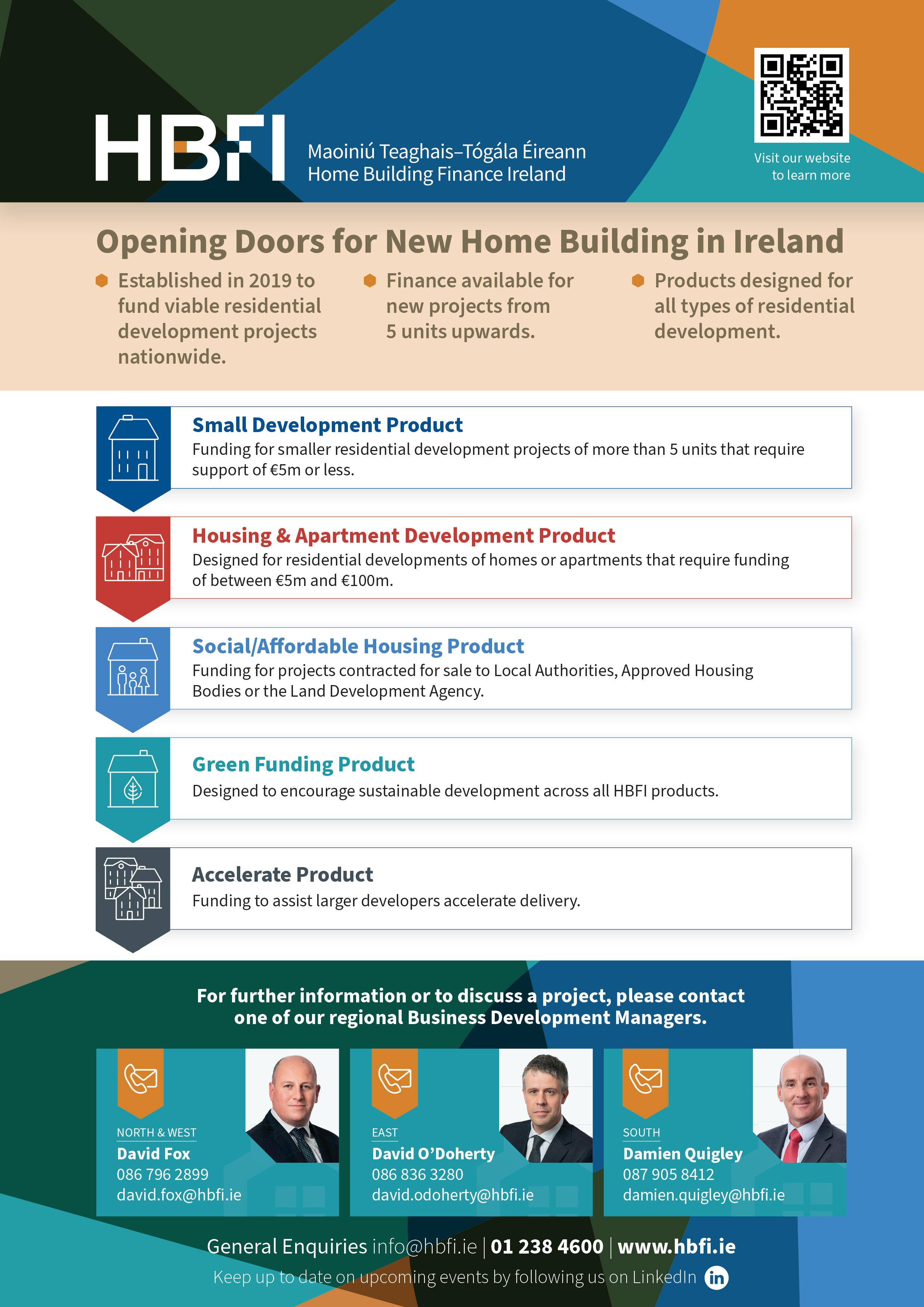


The dramatic slowdown in the construction of apartments in Ireland began five years ago and intensified since then, with the absence of any newly built or forwardfunded private rental sector transactions confirming the severity of the situation.
The only new build transaction in 2024 was a social investment one. Otherwise, there were no newly built private homes sold to or funded by institutional investors for the private rental market in the country in 2024. While 9,031 apartments were built in Dublin in 2023, this figure fell by 27 per cent to 6,608 in 2024, most of which were for the public sector or Build to Sell market, highlighting the deepening supply crisis including the following:
Thousands of landlords are leaving the market. Ireland needs a multifaceted approach to allow for it to build its extensive housing infrastructure requirements over the next decade.
From Hooke & MacDonald’s experience, the Rent Pressure Zones have had a massive negative effect on investment and supply in the rental market. This has been decimated and the construction of apartments for this sector is grinding to a halt.
The present system needs to be replaced as a matter of extreme urgency with a simple, straightforward, uncomplicated one that will not be bogged down in bureaucracy, otherwise there will be no improvement
in supply over the next five years. International pension funds have stated to Hooke & MacDonald that the Irish housing market is presently uninvestable.
The ‘reference rent system’ suggested by The Housing Commission would cause further stagnation in investment in the rental market, just as it did in the Netherlands. It is too complicated and cumbersome and will prevent supply occurring.
Investment in the rental market has to be encouraged with suitable measures and incentives. If indefinite tenancies are considered this would be disastrous for investment. It would infringe the rights of property owners who may need to sell and it would affect property values. The notice periods are already very long and beneficial for tenants.
Going on the principle that what is needed is fair and uncomplicated the best solution is to have a very simple system that allows rents to increase in line with average wage growth in the economy. This is fair to tenants while also letting pension and other funds be confident that their income will rise in line with their obligations to pensioners in the years ahead. The system would need to allow stock that is currently under-rented as a result of rent pressure zones and high inflation to be reset back to an inflation adjusted rent over time.
The investment market is in such a decimated state now as a result of the rent pressure zones that, apart from replacing the current rent pressure zones, other measures may be needed as well to stimulate anything close to what is now required to solve the housing crisis. Despite much misinformed commentary from certain quarters about the Section 23 tax incentives, this was a hugely successful self-financing incentive and could be so again if targeted at Irish cities where the main need for rental accommodation exists.
What ruined it previously was spreading it to every corner of Ireland instead of
confining it to urban locations. It is a very simple and straightforward incentive.
• Ensure the rights of tenants are protected through proper enforcement of regulations, but not open ended tenancies.
• Bring more efficiency to Residential Tenancies Board processes, including the process for tenants who are in substantial arrears and not cooperating.
• Bring certainty to the funds regime and allow for large scale deployment of capital to fund and invest in Ireland’s housing infrastructure.
• Foster a pro-funder and pro-investment culture, grounded in policy certainty, similar to that which has been successful for decades in respect of foreign direct investment for multinational businesses such as IT, funds, and pharmaceuticals.
• Remove impediments in the planning system and zone substantially more land for development of housing. Allow for extension of planning permissions on thousands of apartment sites which have been unviable to date and are now coming to the end of their approval timelines.
• Continue the Help to Buy scheme for first time buyers on new homes, but not to be extended to older properties.
• Continue the First Home Scheme.
• Continue the Affordable Housing Scheme.
• Introduce tax incentives for the provision of student housing.
• Address infrastructure blockages.
The above measures, if implemented, would go a long way towards significantly increasing housing supply in Irish cities and towns and would reverse the downturn in apartment construction delivery.
Hooke & MacDonald
118 Baggot Street Lower Dublin 2 PSRA No. 001651
T: 01 661 0100
E: info@hmd.ie
W: www.hookemacdonald.ie

Paul Hogan, Assistant Secretary in the
of Housing, discusses the Planning and Development Act 2024 and its implications for residential construction.
Hogan describes the Planning and Development Act 2024 as a “pivotal moment of reform”. However, he warns that the introduction of the legislation itself will “necessary but not sufficient” to meet the State’s housing demand, instead advocating for a holistic approach spanning policy, legislation, finance, infrastructure, and performance.
“Our housing targets are not just numerical goals; they must deliver communities, services, and sustainable places across every part of the country,” he explains.
Analysis of the planning pipeline reveals significant challenges. Although the system granted approximately 40,000 housing units annually between 2018 and 2024, roughly half have been completed as of mid-2025.
Hogan contextualises that planning is “demandled,” adding: “The planning system can only process what comes in, but people withdrawing or projects failing means we are working with surplus permissions that never materialise.”
The Assistant Secretary highlights apartments as
the keystone of current delivery: “Permission data shows housing output closely mirrors trends in apartment authorisations. Investment in higher density housing is critical,” he stresses, saying reaching 80,000 homes a year will not happen without it.
Speaking on the preceding planning legislation, the Planning and Development Act 2000, Hogan states that it inadvertently created a planning system which could be incoherent and was burdened by EU directives and court-led amendments. The result of this, he says, has been “escalating judicial reviews, slower decisions, and investor uncertainty”.
Hogan says that the new Act establishes national planning approved by government, replacing fragmented ministerial guidance.
“This enables a consistent, hierarchical planning framework, underpinned by 10-year development plans and clear alignment between national and local priorities.”
On reforms to the judicial review process, he outlines that there will be fixed-fee structures and strict cost ceilings, reducing the incentive to use legal challenges as a delay tactic. This will be complemented by the elimination of superfluous procedural stages such as initial leave hearings and limitations on new pleadings.
A central component of the legislation is the renaming of An Bord Pleanála to An Coimisiún Pleanála (see page 19), with the planning body to be equipped with dedicated governance, executive independence, and statutory targets. Hogan states that the organisation will also be equipped with resources and oversight mechanisms to clear existing backlogs, meet statutory timelines, and provide certainty to applicants.
“These measures are not about shutting out public participation; they are about restoring balance. We need transparency, but we need transparency delivered within a system that delivers timely outcomes.”
Another key feature of the 2024 reforms is the introduction of statutory action on local development plans. Under the new National Planning Framework, Hogan states that the Minister for Housing, Local Government and Heritage will compel county councils to revise their housing targets with variations under the aegis of Section 13 of the Planning and Development Act. These amendments will lift annual targets from 50,000 to 80,000 and extend planning horizons to 13 years.
Hogan explains: “By increasing housing requirement figures now, and backing it with policy-led targets, we lay the foundations for more purposeful investment and planning decisions across all local authorities.” He confirms that that this process is to begin immediately, even before the new Act is fully enacted as it is a priority for the Government.
Urban development zones (UDZs), streamlining of local area plans, and a default 10-year-long cycle for development plans are further mechanisms intended to ensure that zoning, land-use policy, and infrastructure delivery are coordinated in time and scale.
Beyond legislative overhaul, Hogan stresses the necessity of a mindset shift within the planning space. “A new performance culture embracing agility, innovation, and data-driven oversight is essential,” he says.
He points to a newly-launched ministerial action plan and the establishment of the Housing Activation Office aimed at addressing blockages, enhancing capacity, and raising local authority performance.
Hogan underlines that a review of processes ranging from consent timelines to decision support systems is will be the key to increasing productivity in the sector. “We need to figure out what planning functions are essential, and what could be delivered better and faster,” he states.
Concluding, Hogan argues that solving the State’s housing crisis depends on a clear planning framework that “fuses national direction with local execution”.
This, he says, requires “streamlined, reliable planning regime that enables timely decisions while protecting public engagement”. “This requires system-wide capability and coordination which is enabled by infrastructure, funding, and performance mechanisms.
“This is not just numbers on a page but communities, schools, workplaces, and life opportunities. We must switch from a reactiondriven planning system to one that is delivery-oriented, outcomefocused, and nationally joined up. That is the only route to sustainable, affordable housing at scale.”
We eagerly await over the summer some of the major publications which will impact on the housing sector, and in particularly social and affordable housing delivery in the coming years, writes Donal McManus, CEO of the Irish Council for Social Housing.
The revised National Development Plan (NDP), the successor to Housing for All and the AHB Strategic Report will be key reports hopefully providing policy direction, targets and funding envelops. The revised National Development Plan will be the one such important milestone which will be the focus in this article.
Housing, and social and affordable housing is one of the key priorities (if not the main one) facing many Irish people currently. Housing was articulated as a key national priority at the most recent National Economic Dialogue (NED) gathering in Dublin Castle. Housing is also a key infrastructural deficit where significant intervention is still required. Physical infrastructure deficits such as water, sewerage, and utilities are often seen as the key infrastructural deficits, and they are in many areas. Investment in water and sewerage is central to having the capacity to deliver the 300,000 new homes committed to under the most recent Programme for Government. However, housing and the need for social and affordable housing should be up alongside these pillars in terms of infrastructural deficits and priorities and not be relegated to a secondary discussion otherwise we will be still writing about these housing issues in another five years.
It must be remembered in terms of housing infrastructure, that Ireland had almost a lost decade of housing supply
after 2007 with the property crash and subsequent fiscal crisis. This manifested in a serious reduction in the delivery of social and affordable housing. 2014 was effectively the ground zero year for social and affordable housing delivery. Therefore, Ireland now has around 10 per cent of a social housing stock around half the EU average. The Housing Commission report recommended that the proportion of social and affordable housing should be 20 per cent of the national stock, and this will contribute to the stabilisation of rental market. However, since 2016 in particular, there has been an increase in social and later affordable housing, albeit from a low base. The AHB sector has been a key player in a state-wide social and affordable housing recovery especially through various successful programmes such as CALF and CREL. For example,


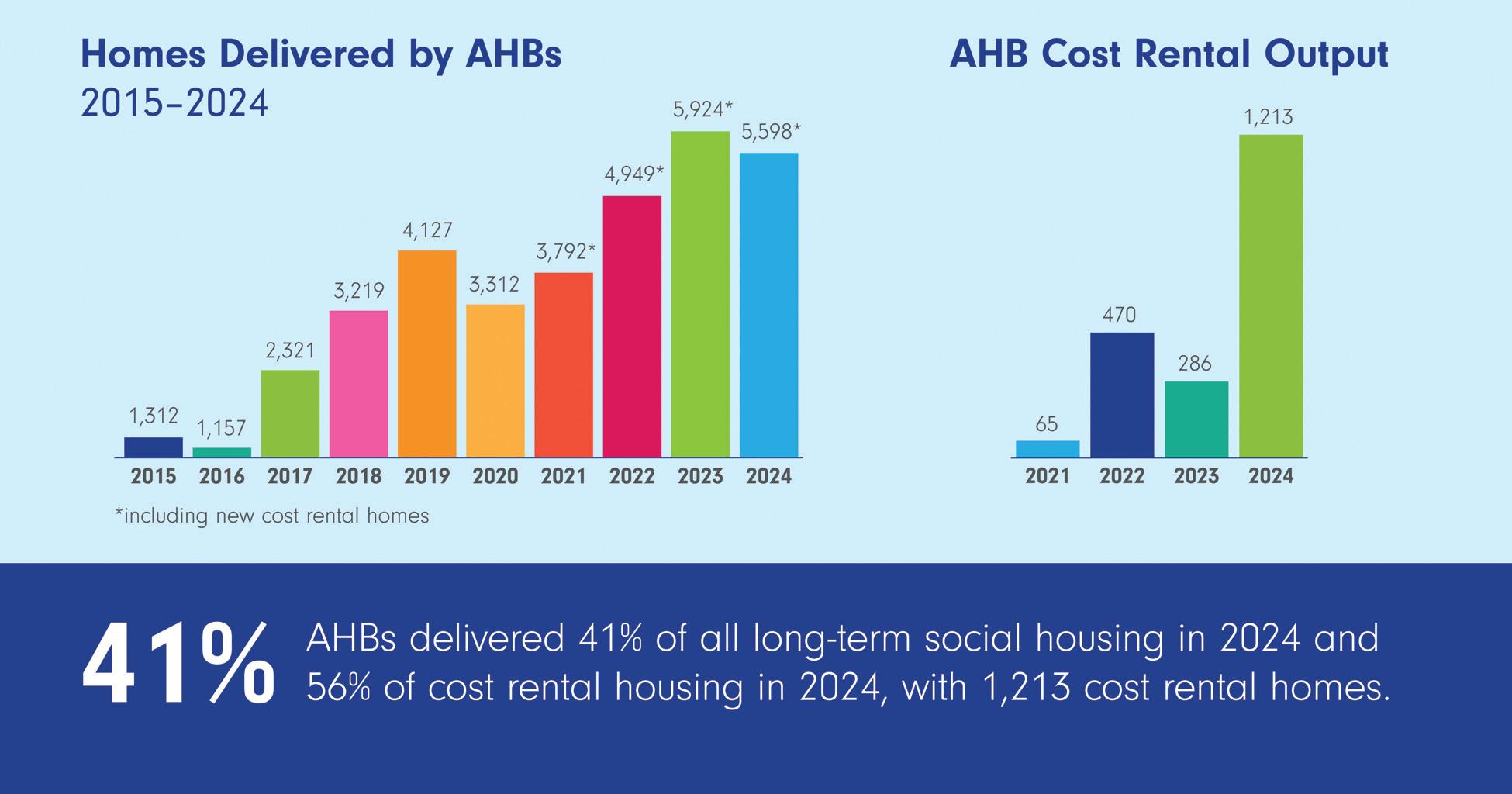
since 2020, the track record shows the AHB sector has delivered over 24,000 social and affordable homes. These are actual homes that were provided for low income, vulnerable groups and middle groups not future delivery. As well as support for hard infrastructure in the revised National Development Plan such as investment in social and affordable housing, there needs to be a recognition of social infrastructure required in social and affordable and housing projects in mixed tenure and special needs projects. Housing delivery patterns and needs have changed over the last 20 years in previous National Development Plans such as the mainstreaming of mixed tenure housing projects since 2000. A joint research report by the Irish Council for Social Housing (ICSH) and The Housing Agency in 2022 demonstrated that approved housing bodies (AHBs ) had increased their role in mixed tenure projects from around 20 per cent to 80 per cent of annual delivery over the last 20 years. With new AHB cost rental delivery support by CREL, there has been a need for increased community and communal facilities to ensure long-term sustainability of these homes and communities.
The need for increased social and affordable housing is having a major impact across a whole range of aspects of Irish society from economic competitiveness and employment for new business, health wellbeing, family life, educational attainment, levels of
homelessness and enhanced social inclusion and cohesion. In particular, increased social and cost rental housing provision can provide the certainty of delivery over the coming years when awaiting the changes in the private rental sector to enhance investment and supply. Targeted investment in the NDP at 90 per cent of costs for retrofit is needed for older AHBs homes.
The starting point for the revised National Development Plan is stronger than previously. There is more capacity in the social housing sector to deliver, such as with AHBs who are delivering 40-50 per cent of total social housing in various areas, and over 50 per cent of cost rental housing. The pipeline is stronger overall as was required. However, there are a number of AHB social and cost rental housing projects that were brought forward for funding over the last year and are still awaiting approval to begin. Further delays will affect the AHB social and cost rental delivery in 2025, 2026 and 2027 falling below expectations. These AHB projects were painstakingly assembled with often up to 10 public and private partners. As these are real projects, the revised National Development Plan could support these to effectively wash out the backlog and accelerate delivery in the housing crisis. With increased AHB led construction, more capacity building measures for AHBs are essential.
Previously National Development Plans had ambitious and often somewhat unrealistic targets for social and
affordable housing without recognition of land requirements. There have been important measures to acquire land for social and affordable housing. However, the mandated Land Development Agency provides a major opportunity to enable land to be provided for social and affordable housing. While initially focusing on population centres of over 10,000, it could also cover wider area for land assembly where even small projects have a significant impact on local communities.
The revised National Development Plan is all about choices. Yes, there is the current global economic environment and the revised EU fiscal rules. The European Commission has even pointed recently to insufficient housing supply having significant economic and social implications. This now can be an opportunity through the NDP review for Ireland take an enhanced lead on housing in advance of the Irish presidency of the EU in the second half of 2026. The revised and enhanced NDP support for social and affordable housing can further change the dial and have a more meaningful impact on Irish society.
W: www.icsh.ie

In 38 of the State’s 166 local electoral areas (LEAs), short-term lets (STL) listed on Airbnb account for at least 10 per cent of the size of the private rental sector (PRS), according to Profiling Short-Term Let Usage Across Ireland, a new research report from the Economic and Social Research Institute (ESRI).
The report, authored by Katie Devane, Allan Kelly, and Rachel Slaymaker, presents data on Airbnb listings in Ireland using September 2023 data from InsideAirbnb and Census 2022 data, with comparisons to 2019 and 2022 where relevant. It examines the geographic distribution of listings, the scale of STL activity relative to the PRS, price comparisons between sectors, and regulatory responses in Ireland and abroad.
Nationally, 66.2 per cent of Airbnb listings in September 2023 were for entire properties, amounting to 18,638 listings. These entire property listings were concentrated in coastal tourist areas and in central parts of the cities of Dublin and Galway. In contrast, cities such as Cork, Limerick, and Waterford showed lower levels of STL activity.

In several coastal areas with small rental sectors, the Airbnbto-PRS ratio exceeded one in three, with ratios of 1:3 in Westport (Mayo) and 1:6 in Killarney (Kerry). In Dublin and Galway’s inner-city areas, the ratio stood at approximately 1:10 or higher. The report notes that there is a strong correlation (0.89) between Airbnb listings and previously recorded holiday homes in non-urban areas, with a lower correlation (0.47) in urban areas.
Between 2019 and 2023, the number of entire property listings increased by 17.6 per cent, while private room listings fell by 22.3 per cent. Entire property listings grew in most parts of the country except in Dublin City (-13.3 per cent), Cork City (-17.5 per cent), and Galway City (-22.7 per cent).
At a national level, 85 per cent of hosts had just one listing, accounting for 59.6 per cent of all entire property listings. However, a notable share of listings was associated with multi-property hosts and letting agencies. Three hosts each had over 100 listings in 2023, primarily in rural and coastal areas. These large hosts accounted for a relatively significant proportion of total national listings, with shares of 2.0 per cent, 0.9 per cent, and 0.8 per cent respectively.
The report finds that STL properties in coastal areas and in Dublin city would need to be let for between six and 10 days per month to match average monthly revenue in the PRS. Despite this, the report notes that there is no observed correlation between changes in Airbnb activity and new PRS tenancy registrations between 2019 and 2023 at the LEA level.
In terms of regulation, the report finds that existing measures – such as the requirement for change-of-use planning permission in rent pressure zones – have seen limited engagement. In 2023, only 91 such applications were received compared to 9,142 Airbnb listings in rent pressure zones.
The report outlines three international approaches to regulation: day caps, partial or outright bans, and mandatory data-sharing with tax authorities. It asserts that enforced regulation can reduce STL listings and lead to some movement back to the PRS, but that evidence of significant downward pressure on PRS rents is limited. It also notes that regulation has typically been focused on urban areas, whereas STL activity in Ireland spans both urban and rural areas.
The authors recommend the establishment of a comprehensive STL register, covering all STL activity in Ireland, as a critical step to support data-driven policy decisions.
Report co-author Rachel Slaymaker says: “Understanding the dynamics of the STL sector and its interaction with the rental sector is crucial for informed policymaking.
“Our findings highlight the importance of establishing a register covering all STL activity across Ireland to provide timely data to be used in conjunction with rental sector data to monitor activity, changes in usage patterns, and particular pressures in local areas. This is crucial for ensuring a balanced approach to regulation that considers both the need for tourist accommodation and rental housing for locals.”


In its 2025 Economic Survey of Ireland, the OECD states that policies to increase housing density, improve land use and planning, and boost productivity and lower costs in the construction sector are needed for a well-functioning housing market.
“Ensuring adequate supply and funding for social housing would ameliorate living conditions for the most vulnerable, and help combat homelessness,” the report says.
In the context of the lack of consistency in the fiscal and regulatory framework, the OECD asserts that repeated largescale changes reduce investment certainty and may deter private investment. It recommends that all housing-related policy, legislative, and regulatory proposals undergo rigorous regulatory impact assessments.
Greater standardisation and coordination among data-collecting bodies is also advised to improve the quality and consistency of housing data. “Housing targets should be regularly updated to reflect actual and pent-up demand, and better aligned with local conditions, particularly in urban areas,” the OECD states.
The report calls for the abolition of temporary tax measures introduced in recent budgets, such as mortgage interest relief and incentives for landlords and tenants as property tax revenues remain “modest”. The OECD recommends increasing local property tax rates and taxes on residential zoned land. It also advises tightening the tax treatment of secondary homes, capping the capital gains exemption on primary residences, and abolishing stamp duties.
Following the passage of the Planning and Development Act, the OECD highlights the need for improved digital infrastructure and recommends accelerating the national rollout of eplanning. Enhancements to the An Coimisiún Pleanála data collection and case management systems are also advised. To address recruitment and retention challenges in planning offices, tailored training should be expanded. New planning guidelines on residential density should be enforced through monitoring of exemptions and by making adherence to density targets a condition for public financial support. The OECD identifies the Town Centre First scheme as a potential model for sustainable land
development and recommends the creation of a public data portal and toolkit. A national land-use classification system and land-use map are also recommended, alongside lower development charges on brownfield projects and a map of available sites.
In the rental market, the OECD recommends applying rent controls only within contracts and avoiding regulations that lead to unfair terminations. It also advises consolidating the Residential Tenancies Act.
To address high construction costs and low productivity, it recommends continuing cost audits and implementing the 2023 Residential Construction Cost Study, including greater use of standardisation. Publicly supported housing, it claims, “could reduce costs through simplified specifications and adjusted price caps”.
Finally, the OECD calls for reduced reliance on the private rental sector and increased social and cost rental housing. It recommends streamlining allocation processes and prioritising individuals experiencing homelessness. Multi year, cross-departmental funding is advised for homelessness support schemes.
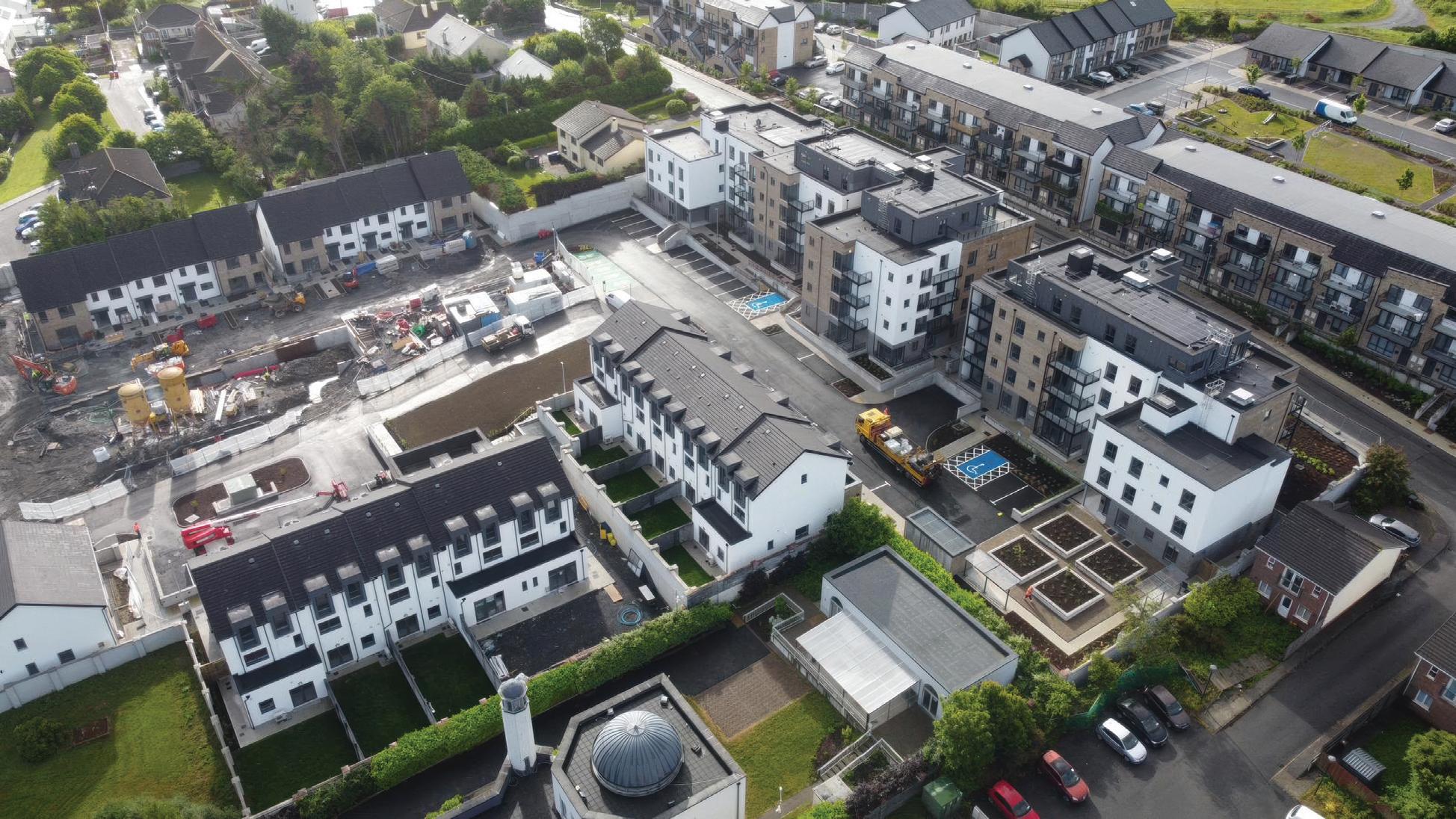
Tuath Housing has become the first approved housing body (AHB) in Ireland to deliver 1,000 cost rental homes, hitting the milestone figure with the delivery of Claí Mór, a new mixed tenure scheme in Galway city.
It marks an exciting new chapter for housing in the west of Ireland, as the scheme brings cost rental homes to Galway for the first time. Tuath has been at the forefront of cost rental provision in mixed tenure schemes since delivering Ireland’s first purpose-built cost rental homes in partnership with Respond Housing in Stepaside, County Dublin in 2022. Tuath also provided the first cost rental homes in Dublin city, Waterford, Louth, and Westmeath.
The organisation’s delivery of this new type of tenure has drawn huge interest from middle-income earners. In less than three years, there have been over 33,000 applications for Tuath’s 1,000 cost rental homes.
“We have come a long way in a short time and have seen very significant demand for cost rental homes,” says Sean O’Connor, Chief Executive of Tuath.
“Since 2022, we have continuously upped our delivery figures year-on-year to help meet the massive, national need for affordable housing. Surpassing the 1,000th cost rental home mark gives us a chance to reflect on our experience and learnings to date and to look ahead to where we are going and to delivering more affordable homes for more people.”
Whilst Tuath has been working in partnership with local authorities up and down the country for close to two decades to provide over 14,000 social homes, cost rental has become an important aspect of Tuath’s delivery programme. The AHB currently has over 2,500 homes in the cost rental delivery pipeline.
Tuath’s cost rental tenants benefit from rents that are at least 25 per cent below the local market average and enjoy secure, long-term tenures, as well as
first class property and tenancy management services.
“As we look ahead to 2026 and beyond, we are committed to continuing to deliver quality homes and value for money for partner stakeholders and for residents,” adds O’Connor.
W: www.tuathhousing.ie
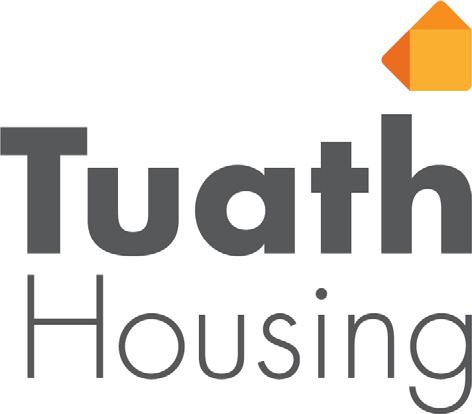


construction, rising homelessness, and the need to meet climate targets across Europe.
While housing policy remains the responsibility of member states, the EU has used legislative, financial, and policy tools to influence national approaches.
In 2024, the European Commission appointed a Commissioner for Energy and Housing, Dan Jørgensen. His portfolio includes the development of a European affordable housing plan, measures to address energy poverty, and proposals to support housing supply and renovation across the EU.
Legislatively, the revised Energy Performance of Buildings Directive (EPBD), due to apply from May 2026, sets new requirements for building energy efficiency. All new buildings must be zero-emission by 2030. Member states will also be required to reduce the average primary energy use in residential buildings by 16 per cent by 2030, and by 20 to 22 per cent by 2035. More than half of this reduction must come from the renovation of the worst-performing buildings.
Several EU funding instruments now include housingrelated elements. The Recovery and Resilience Facility allocates funding to energy efficiency improvements and social infrastructure, including housing. Under the current programming period, more than €100 billion is available across the EU for energy renovation of buildings. Other funds contributing to housing-related objectives include the European Regional Development Fund (ERDF), InvestEU, the European Social Fund Plus (ESF+), the Just Transition Fund, and the Social Climate Fund, which begins in 2026.
In March 2025, the European Commission and the European Investment Bank (EIB) launched the first stage of a new investment platform for affordable and sustainable housing. The platform will provide financing and advisory support, with the EIB planning to invest approximately €10 billion over the next two years.
The EU has also adopted new measures to improve the regulation of short-term rentals. From 2026, platforms will be required to share data with local authorities under new transparency rules. VAT obligations for short-term rental providers are also being revised as part of broader EU tax reform.
In late 2024, the European Parliament established the Special Committee on the Housing Crisis. Its work is ongoing and will contribute to future policy development.
Sorcha Edwards, Secretary General of Housing Europe says that while the EU assuming a leadership role is “an opportunity to achieve better finance and better regulation for AHBs in their different guises across Europe, there are no EU-level silver bullets to tackle our housing crises”.
“Contexts vary hugely and key levers like tenant protection and planning are local and should stay local. At EU level, we need more coherence to prevent, for instance, EU limits on national debt from stopping financial support for social or cost rental housing,” Edwards says.


The rising demand for temporary accommodation is causing “potentially unsustainable financial pressure for homelessness services in Northern Ireland”, a report by the Northern Ireland Audit Office (NIAO) asserts.
With homelessness presentations exceeding 17,000 in 2023/24 and over 29,000 households on the social housing waiting list, urgent intervention is required to prevent the system from becoming overwhelmed.
The report, entitled Homelessness in Northern Ireland and published in lateMarch 2025, says that homelessness in Northern Ireland extends beyond rough sleepers and includes thousands of individuals and families living in inadequate conditions, temporary accommodations, or informal housing arrangements.
The statutory definition of homelessness, set out in the Housing (Northern Ireland) Order 1988, includes individuals with no available accommodation anywhere in the UK or beyond.
The data paints a challenging picture. While the number of people presenting as homeless has fallen marginally since 2017, demand for temporary accommodation has increased significantly. On any given night, over 4,700 households are housed in temporary arrangements – an increase of 3,000 since 2017.
Expenditure on temporary accommodation has risen significantly from £7.6 million in 2018/19 to £38.6 million in 2023/24, with hotels and B&Bs being allocated a disproportionate share of the budget.
At the core of the crisis is the severe shortage of social housing. More than half of the 29,000 homeless households on the waiting list have been waiting for over two years, and 12,000 have been on the list for more than four years. The shortfall in new social housing is widening, with the annual target of 2,000 new units being reduced to 1,500 due to funding constraints. Compounding this challenge is the presence of void properties within social housing stock, with inconsistencies in the monitoring and management of these properties.
The report also highlights a fragmented and inefficient governance structure. Despite multiple oversight groups, including the Homelessness Strategy Steering Group and the Central Homelessness Forum, progress towards strategic objectives has been
minimal. There is a lack of clear accountability, with many of these groups duplicating efforts rather than streamlining support services.
Additionally, the Interdepartmental Homelessness Action Plan (IDHAP), intended to foster collaboration between Executive departments, has failed to deliver meaningful crossdepartmental cooperation. While there are some positive examples, such as the Complex Lives project in Belfast, the NIAO nonetheless states that broader interagency coordination remains weak.
The financial implications of the homelessness crisis extend far beyond the cost of temporary accommodation. The report says that preventing homelessness could result in significant long-term savings across public services, particularly in health, justice, and welfare. Despite this, less than 10 per cent of homelessness spending in Northern Ireland is allocated to prevention, and annual funding requests for prevention initiatives have frequently been rejected by the Executive.
Without a shift towards prevention, the burden on temporary accommodation, the report asserts, will continue to grow. The report emphasises that the current approach is “unsustainable,”
warning that demand for homelessness services could reach a “breaking point”.
The NIAO report outlines several critical recommendations, including:
• A new approach to prevention: The Northern Ireland Housing Executive (NIHE) must establish a robust system for recording prevention outcomes to ensure resources are effectively targeted.
• Reducing reliance on hotels and B&Bs: The NIHE should develop a strategy to minimise its use of expensive temporary accommodations and establish a time-bound action plan for implementing value-for-money principles.
• Better use of existing housing stock: The NIHE must work with registered housing associations to identify and utilise long-term void properties as temporary accommodation.
• Improved governance and oversight: A review of governance structures is needed to reduce duplication, clarify responsibilities, and ensure a more outcomefocused approach.
• Funding and monitoring social housing targets: The Department for Communities and the NIHE should improve transparency around social housing development targets and track the gap between projected need and actual delivery.
Commenting on the report’s findings, Comptroller and Auditor General, Dorinnia Carville, said: “There is currently an unprecedented demand for homelessness services, in particular temporary accommodation, which has been impacted by an inadequate supply of social housing, the impact of Covid-19 and the cost-of-living crisis.
“Homelessness has impacts across society, with long term consequences for health and education outcomes, and the costs to the public purse are significant and rising. Dealing with these issues is complex and my report acknowledges the efforts being made by the Housing Executive and those working in the sector under challenging circumstances.
“However, in order to ensure the best use of public money, there is a need to
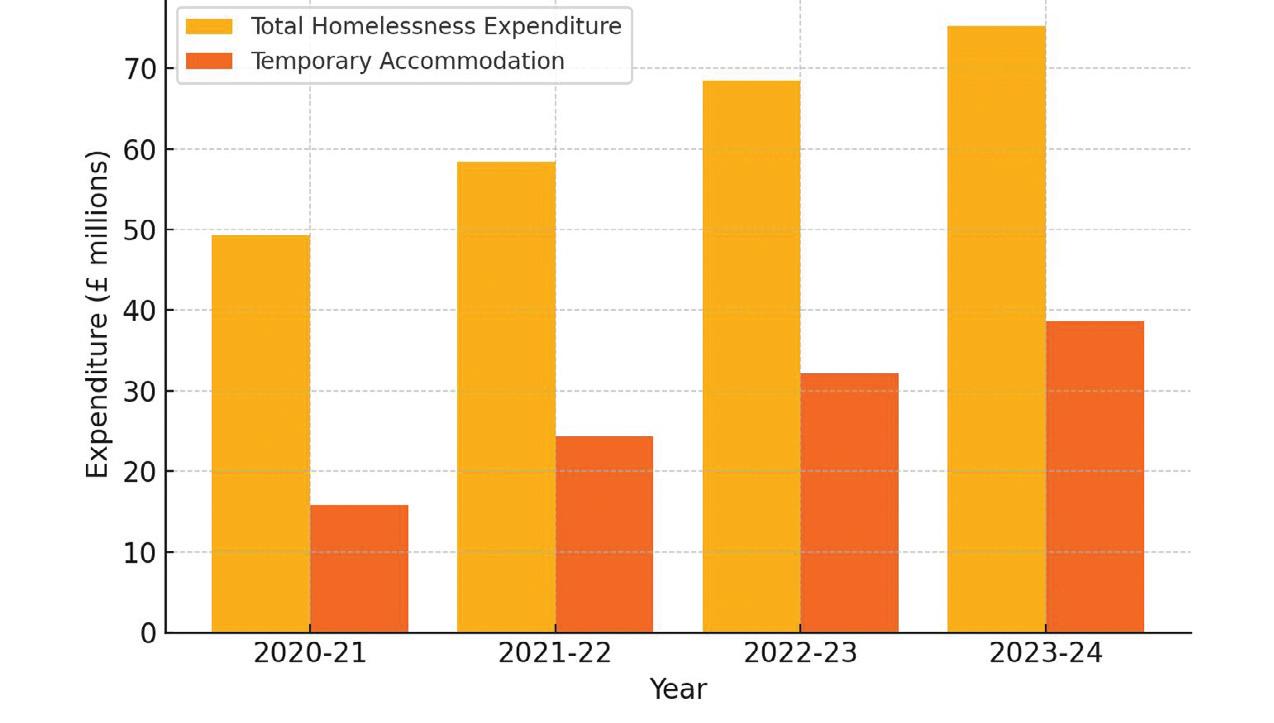
Source: NIAO
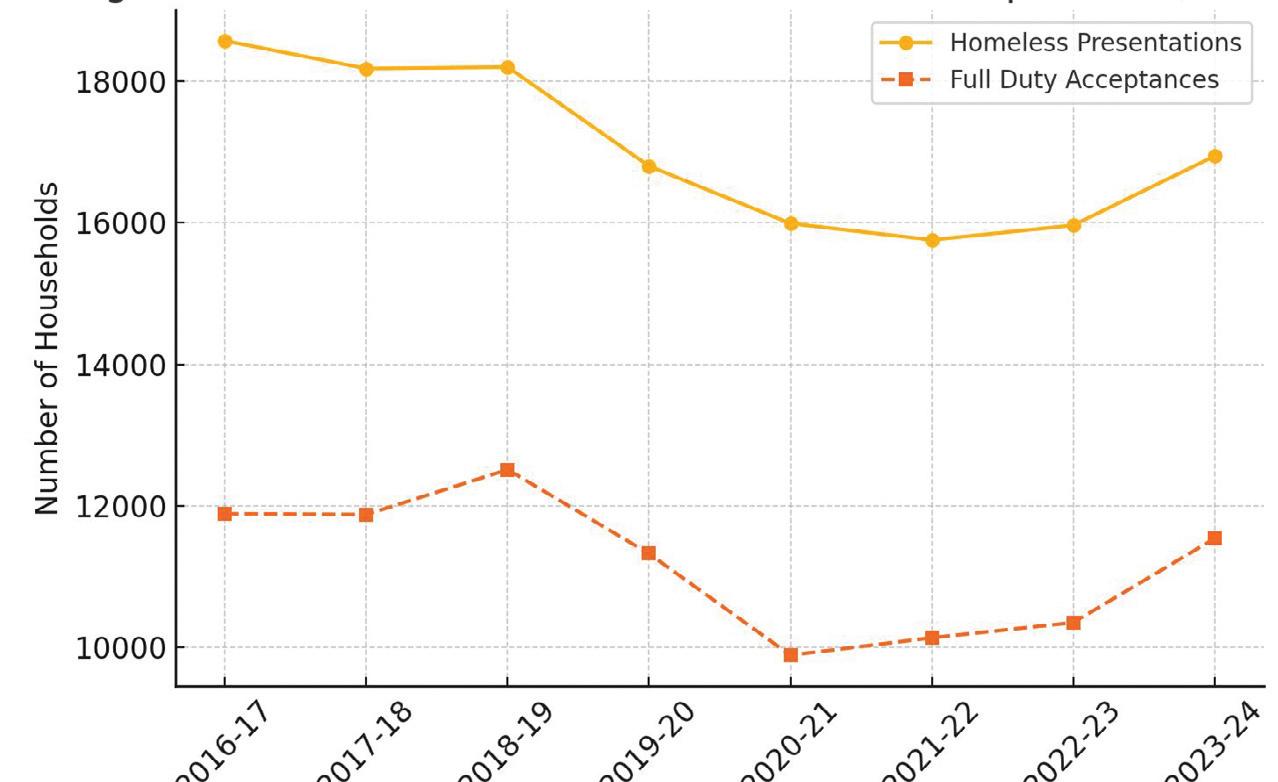
Source: NIAO
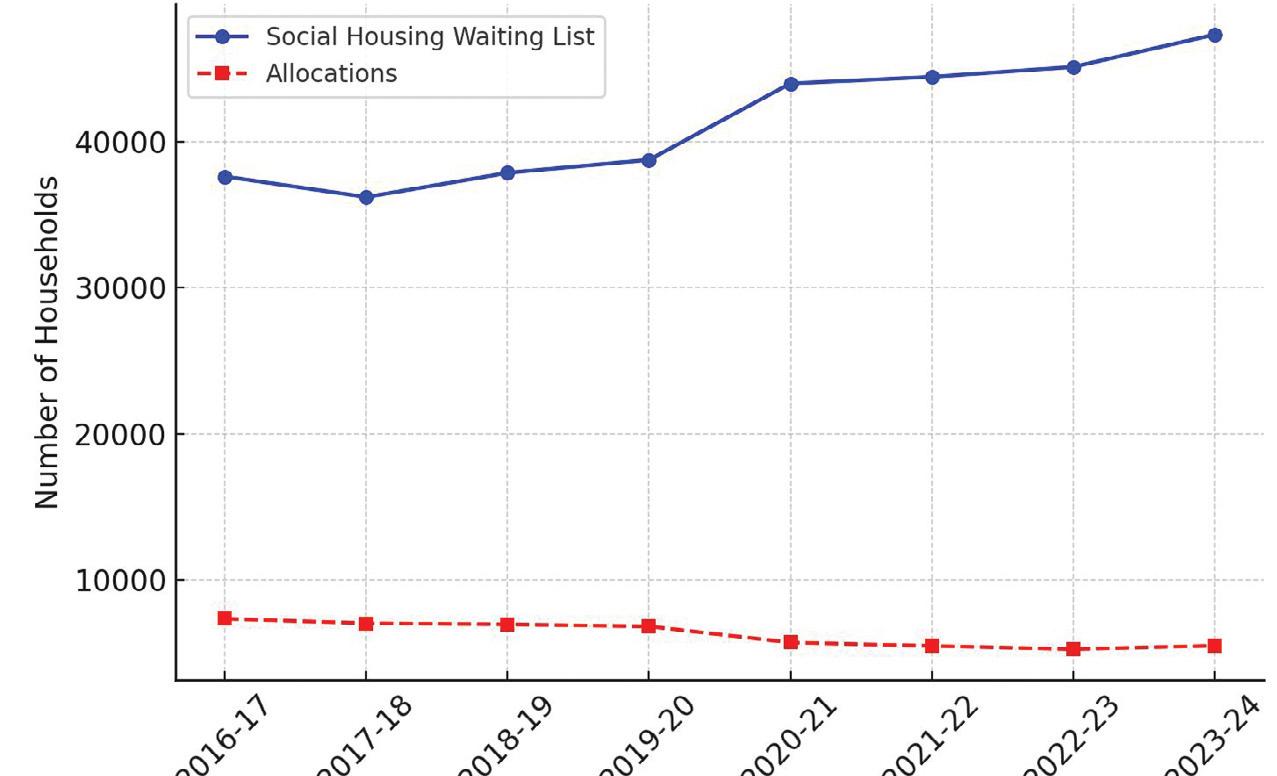
Source: NIAO
reduce spending on hotels and B&Bs, and for an increased focus on homelessness prevention and the supply of new social housing. Until these key issues are resolved, demand for homelessness services is likely to continue to escalate to a point where it may become financially unsustainable.”


Government is off target to meet housing delivery targets outlined in the first revision of the National Planning Framework (NPF), approved by both houses of the Oireachtas in April 2025.
The NPF states that an average of 50,000 housing units need to be delivered annually to 2040 to meet projections by the Economic and Social Research Institute (ESRI) that the population of the State will grow from the 5.1 million recorded in Census 2022 to between 6.1 million and 6.3 million by 2040. According to the Central Statistics Office, 32,695 dwellings were completed in 2023, and 30,330 were completed in 2024.
Most recently, in June 2025 the Central Bank of Ireland projected that approximately 32,500 units will be completed this year, 1,500 less than its previous forecast in March 2024. It estimates that 37,500 will be completed in 2026, 2,500 lower than its last projection, and 41,500 will be completed in 2027, down 2,500.
The revised NPF aims to reflect changes in government policy since the NPF was originally published in February 2018. It sets out the socioeconomic and cultural development of the State until 2040 and is designed to enable the Government to plan for the provision of housing. An expert group was appointed to review the NPF in March 2023, and it published the following recommendations in August 2023 which informed the revised NPF:
• compact growth targets should be more ambitious and more clearly defined;
• the roles of the bodies involved in its implementation should be clarified and strengthened and mechanisms put in place for more detailed measurement and monitoring of its progress; and
• there should be greater coordination at whole-ofgovernment level on infrastructure projects and new efforts made to generate broader support for national spatial planning.
New policies regarding renewable energy are included in the revised NPF. One involves the identification of regional renewable electricity capacity allocations to enable faster rollout and delivery of renewable electricity infrastructure for onshore wind and solar generation development. Another aims to support the achievement of 2030 national targets outlined in the Climate Action Plan
The revised NPF will be used in the review and updating of regional strategies and local authority development plans to reflect changes in housing figures, projected jobs growth, and renewable energy capacity allocations. It will do this through the
zoning of land for residential and employment purposes, among others.
Upon publication of the revised NPF, Minister for Housing James Browne TD said: “The revised framework allows us to plan for the provision of the right number of homes in the right placesincluding new sustainable communities at brownfield and greenfield locations along existing or planned high capacity public transport corridors.”
During the Dáil Éireann debate when the revised NPF was approved in April 2025, Social Democrats housing spokesperson Rory Hearne TD said: “This planning framework is important but, unfortunately, it is insufficient and inadequate in a number of areas.”
Hearne pinned the absence of objectives on affordable housing delivery, and the assessment of the amount of affordable housing needed as reasons for its inadequacy. He continued: “The reality is that we are in a catastrophic situation. The level of homelessness that we are seeing right now is unprecedented but, unfortunately, it is becoming normalised by this Government.”

The new Grant Aerona R290 air-to-water heat pump range represents a significant step forward in heating innovation and has been designed for exceptional performance in the Irish climate.
As Ireland ramps up delivery of new homes and accelerates retrofitting efforts to meet national climate targets, sustainable and efficient heating solutions have never been more important. Leading heating technology manufacturer, Grant, recognises this and continues to support housing providers, local authorities, developers, and energy consultants in meeting the challenges of decarbonisation whilst providing environmentally friendly heating solutions and maximising heating efficiencies.
Grant recently launched its new Aerona R290 air source heat pump range representing an investment of over €2.4 million. Designed to meet the specific needs of Ireland’s climate and regulatory environment, the Aerona R290 range offers a high degree of flexibility, whether for single-dwelling, apartments, multi-unit social housing, or public buildings and is proving to be an important feature in new build developments and deep retrofit schemes.
Available in five models with outputs from 4kW to 16kW, the Aerona R290 heat pump achieves A+++ energy ratings (at 35°C). It also performs at ambient temperatures as low as -5°C, and features a high-capacity circulation pump and integrated immersion heater which reduces installation time and cost.
In line with planning and design trends, the unit’s black monobloc casing provides a clean, modern aesthetic placement. The Aerona R290’s ultraquiet operation thanks to acoustic insulation and anti-vibration technology, also addresses growing concerns about sound pollution in high-density settings. All units have been recognised by Quiet Mark demonstrating that the range meets the highest standards for residential acoustic performance, which is particularly important in compact developments and shared housing schemes.
Speaking about the Aerona R290 range, Peter Darcy, R&D Manager at Grant,
says: “When designing this heat pump, we listened closely to installers, homeowners, and contractors. We focused on efficiency, acoustic performance, and reliability to create a system that delivers long-term value and comfort.”
The Grant Aerona R290 is also helping to future-proof heating infrastructure. As properties grow and extend the system can be easily upgraded or integrated into broader renewable energy systems, such as incorporating solar technology. This adaptability supports the shift toward low-carbon communities while ensuring long-term performance.
For housing providers balancing ambitious energy goals with practical construction and budget realities, the Aerona R290 offers a compelling combination of performance, sustainability, and reliability. It is a smart choice for developers and local authorities looking to align with nearly zero energy building (NZEB) standards, meet BER requirements, and futureproof their housing projects in line with Ireland’s Climate Action Plan.
To explore the full potential of the Aerona R290 range and its role in nextgeneration housing solutions, visit www.grant.ie
Grant also offers Integrated Heating Solution design and specification for housing projects. To avail of this free of charge service send house plans and choice of heat emitters to heatpump@grant.ie

W: www.grant.ie
X: @GrantIRL
Watch the Aerona R290 launch video
Instagram: @Grant_IRL
LinkedIn: Grant Engineering ULC
YouTube: GrantengineeringIE
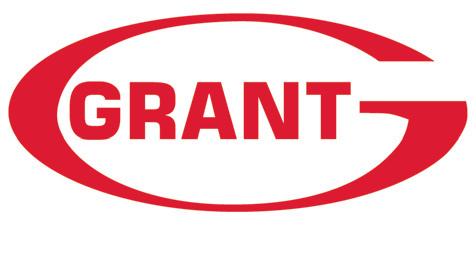


Established in May 2025, the Committee on Housing, Local Government and Heritage is tasked with shadowing the work of the Department of Housing, Local Government and Heritage.
Comprising nine teachtaí dála and five seanadóirí, the Joint Committee on Housing, Local Government and Heritage of the 34th Dáil and 27th Seanad met publicly for the first time on 20 May 2025.
Only a single nomination for the committee’s leas-chathaoirleach was received – though Deputy Rory Hearne had submitted his name after the scheduled deadline – and Séamus McGrath TD was unanimously appointed.
Upon his election, McGrath said: “We all recognise that while this is a broad committee, housing is the number one issue for it and the Government. I want to work with everyone in a fair and balanced way to try to make progress on these issues.”
Earlier in May, Fine Gael’s Micheál Carrigy TD addressed the select committee as its newly appointed cathaoirleach: “The remit of this committee covers one of the most acutely important issues for our country

at this moment, that is, housing. While I appreciate the remit of the committee is wider than this and we therefore need balance, we are also in a housing crisis, so there needs to be a significant focus on housing for the term ahead and as long as is required... We have a lot of work to do together, and it is by us all working together that we can make positive changes.”
Suggesting that the housing committee “has worked well when it has worked in a collegiate manner”, Deputy Eoin Ó Broin stated: “When in committee, not unlike how many of us did when we were on councils, when we come together and try to work together to address or resolve the problems we know are out there, the committee can do some very important work. That is always a challenge when we still have to go into the Chamber or out on the airwaves and have our more partisan battles, but I have had a lot of very good experiences in this committee previously.”
The joint committee is tasked with:
• scrutiny of EU legislative proposals;
• engagement with ministers;
• engagement on statutory departmental scrutiny reports;
• engagement with European bodies;
• consideration of policy areas within its terms of reference;
• pre-legislative scrutiny and consideration of post-enactment report; and
• engagement with chairpersons designate of bodies or agencies under the aegis of DHLGH.
Agreed on 10 June 2025, the Joint Committee on Housing, Local Government and Heritage Work programme covers the period from then until December 2025.
Ahad of the Dáil summer recess, the joint committee examined several policy areas, including the Report of The Housing Commission, challenges facing housing delivery, an update on Housing for All, and tackling homelessness.
The joint committee will prioritise 13 policy areas during the remainder of 2025:
1. social housing;
2. housing delivery;
3. homelessness;
4. affordable housing and cost rental;
5. vacancy and dereliction;
6. local government reform;
7. defective concrete block scheme;
8. post-legislative scrutiny of the Planning and Development Act 2024;
9. housing provision;
10. low carbon housing
11. the rental sector;
12. land activation; and
13. heritage.

Key figures:
Cathaoirleach: Micheál Carrigy TD
Leas-chathaoirleach: Séamus McGrath TD
Clerk to the Committee: Daniel Hurley
Press officer: Robert Kennedy-Cochrane














Cathaoirleach
Micheál Carrigy TD Fine Gael
Leas-chathaoirleach
Séamus McGrath TD Fianna Fáil
Richard Boyd Barrett TD PBP-Solidarity
Paula Butterly TD Fine Gael
Joe Cooney TD Fine Gael
Thomas Gould TD Sinn Féin
Rory Hearne TD Social Democrats
Paul McAuliffe TD Fianna Fáil
Eoin Ó Broin TD Sinn Féin
Seanadóir Pat Casey Fianna Fáil
Seanadóir Joe Flaherty Fianna Fáil
Seanadóir Aubrey McCarthy Independent
Seanadóir Maria McCormack Sinn Féin
Seanadóir PJ Murphy Fine Gael


A new structured process for the delivery of large-scale residential and urban development has been introduced with the formal establishment of urban development zones (UDZs) following the passage of the Planning and Development Act 2024.
The UDZ framework is scheduled to commence during the summer of 2025, in line with a Department of Housing, Local Government and Heritage implementation plan.
The legislation sets out a defined process for the identification, designation, and development of UDZs, which are intended to support projects of significant economic, social, or environmental benefit to the State. UDZs are also to be prioritised for public investment in enabling infrastructure, as provided for in the revised National Planning Framework.
The process begins with the identification of suitable sites. Local authorities may select these sites, while the Land Development Agency (LDA), regional assemblies, or the Minister for Housing, Local Government and Heritage may also bring sites forward for consideration.
Where a site is considered appropriate, the Minister may recommend its designation as a candidate UDZ. In such cases, the planning authority must prepare a planning framework for the site, outlining the required infrastructure,
land use, policy objectives, and environmental considerations. This framework must be in place before a site can be formally included in a development plan.
Following designation, a development scheme may be prepared by the planning authority. This scheme sets out the layout, design, and permitted development types within the UDZ, as well as identifying critical land required for public infrastructure. The development scheme is subject to public consultation, environmental assessment, and a formal approval process involving the Chief Executive, elected members, the Office of the Planning Regulator, and the Minister where applicable.
Once adopted, the development scheme becomes part of the plan. Planning applications within the UDZ that align with the scheme will proceed through a fast-track decision process, with no right of appeal to An Coimisiún Pleanála (formerly An Bord Pleanála). Planning authorities will also have the power to compulsorily acquire land where necessary to deliver key
infrastructure identified in the scheme. The legislation also anticipates measures to restrict premature development of critical lands prior to scheme adoption, although these are not explicitly provided for in the Act itself.
The UDZ framework is intended to facilitate a plan-led, coordinated approach to major development. Early implementation is expected in locations such as the City Edge – Naas Road area in Dublin, which has been identified as a potential pilot site under the new system.
The Department of Housing, Local Government and Heritage has said that further operational details will be confirmed as the summer 2025 commencement approaches.

The Housing Infrastructure Services Company, (HISCo), provides a ‘design-build-finance’ service for housing estate infrastructure, on fully commercial terms, to developers and landowners. Such services include roads, footpaths, cycle lanes, water, and wastewater facilities, (mains and connections), amenity areas, utilities, public lighting, etc.
In addition to on-site infrastructure, we also provide solutions to associated offsite infrastructure deficits e.g. roundabouts, bridges, link roads, wastewater treatment plants etc. For example, HISCo was engaged by two developers in Drogheda to construct Phase One of the Port Access Northern Cross Route which services more than 5,000 homes in the area. We have also delivered the enabling Infrastructure that will ensure the delivery of 753 homes across six neighbourhoods on the northside of Cork city.
HISCo’s main objective is to increase the number of units, and the mixture of tenures, available to those trying to secure a home in Ireland. The unique element of our business is that HISCo will recover its investment in the infrastructure via an infrastructure fee deducted from the proceeds of the sale, or first letting, of each housing unit.
By working in partnership with HISCo, a developer is securing access to patient
investment capital to construct infrastructure crucial and necessary for the delivery of residential units. To date HISCo has directly facilitated the delivery of almost 3,000 homes on private, social and affordable housing developments in Drogheda, Bantry, Cóbh, Ballyvolane Cork city, Kilkenny and Douglas, providing on-site and offsite infrastructure. HISCo’s support provides a cashflow break for these developers, as payment is not required until the sale of the individual units.
Our guiding principles are as follows:
• projects to be considered must be predominantly residential; however, there is recognition that most schemes will contain retail and/or commercial elements;
• schemes that contain a good mix of accommodation types and tenures will be welcomed;
• unit types and prices will be assessed in terms of marketability;
• there must be an identifiable element of infrastructure that HISCo can deliver at a rea-sonable cost; and
• the scheme must have planning approval before being considered for final approval by HISCo, (early discussion of projects is welcomed).
HISCo projects are managed, designed, and constructed by professionals who have experience and expertise in the delivery of residential infrastructural schemes. We also have the option of collaborating with the developer’s design team and preferred infrastructure contractor.
W: www.hisco.ie
The joint shareholders of HISCo are the National Treasury Management Agency, (as controller and manager of the Ireland Strategic Investment Fund), and Cork County Council.



National and local planning efforts need to be coordinated to increase housing supply and meet demand according to the Banking and Payments Federation Ireland (BPFI) Housing Market Monitor for Q1 2025.
The report lays out findings from the European Central Bank Consumer Expectations Survey (CES) in February 2025 which states that 17 per cent of consumers in Ireland are seeking to rent or buy, the second highest in Europe.
Of those renting, 26.3 per cent said they were looking for accommodation, while 1 in 5 of those with a mortgage were actively looking for new housing.
BPFI’s report finds that 17,144 applications were received by the Revenue Commissioners for Help to Buy in the first four months of 2024. This is approximately 5,000 more than the same period in 2024.
However, only 10.5 per cent of owner occupiers said they were “rather likely” or “very likely” to sell. The report notes that housing commencement numbers for the first four months of 2025 were at 40 per cent of levels observed in 2023, and similar to 2016 levels. BPFI also outlines that planning permissions declined by over 21 per cent between 2023 and 2024. In Q1 2025, housing unit commencements were at 2,918, their lowest level since Q1 2021 when there were 2,875.
Housing completions declined in 2024 for the first time since 2013 – excluding the period between 2020 and 2021. A total of 30,356 units were completed to the end of March 2025 on a rolling 12month basis, 4.2 per cent lower than the 12 months to March 2024 when 31,681 units were completed.
In the first four months of 2025, 3,945 units were commenced which is approximately 40 per cent of the levels observed in 2023 and similar to levels seen in 2016. A total of 73,626 units were granted planning permission in 2023 and 2024. Planning permission declined by over 21 per cent between 2023 and 2024, with permissions issued for apartments falling by more than 38 per cent.
Residential property price inflation slowed down in Q1 2025 as prices increased by 7.5 per cent in the 12 months to March 2025, down from 8 per cent in the 12 months to February 2025. For new dwellings, prices rose by 4.1 per cent year-on-year while prices for existing dwellings grew by 9.1 per cent.
The report states that there were 49,176 dwelling purchases in the 12 months ending March 2025, the highest level since the 12 months ending July 2025. Existing housing accounted for 63.2 per cent of sales in Q1 2025 as new house sales accounted for 19.7 per cent, increasing year-on-year by 21.2 per cent to 2,100.
Chief Executive of BPFI Brian Hayes says: “We expect to see housing demand continue, mainly driven by demographic trends and mortgage demand, especially by FTBs due to the more positive outlook on incomes, with gross average earnings now surpassing €1,000 per week for the first time since the CSO data series began in 2008. On the supply side however, there is significant uncertainty in terms of housing output in the medium term.
“Demand will not be met in the short term and will only be satisfied in the medium term with a coordinated and sustained effort at national and local levels.”
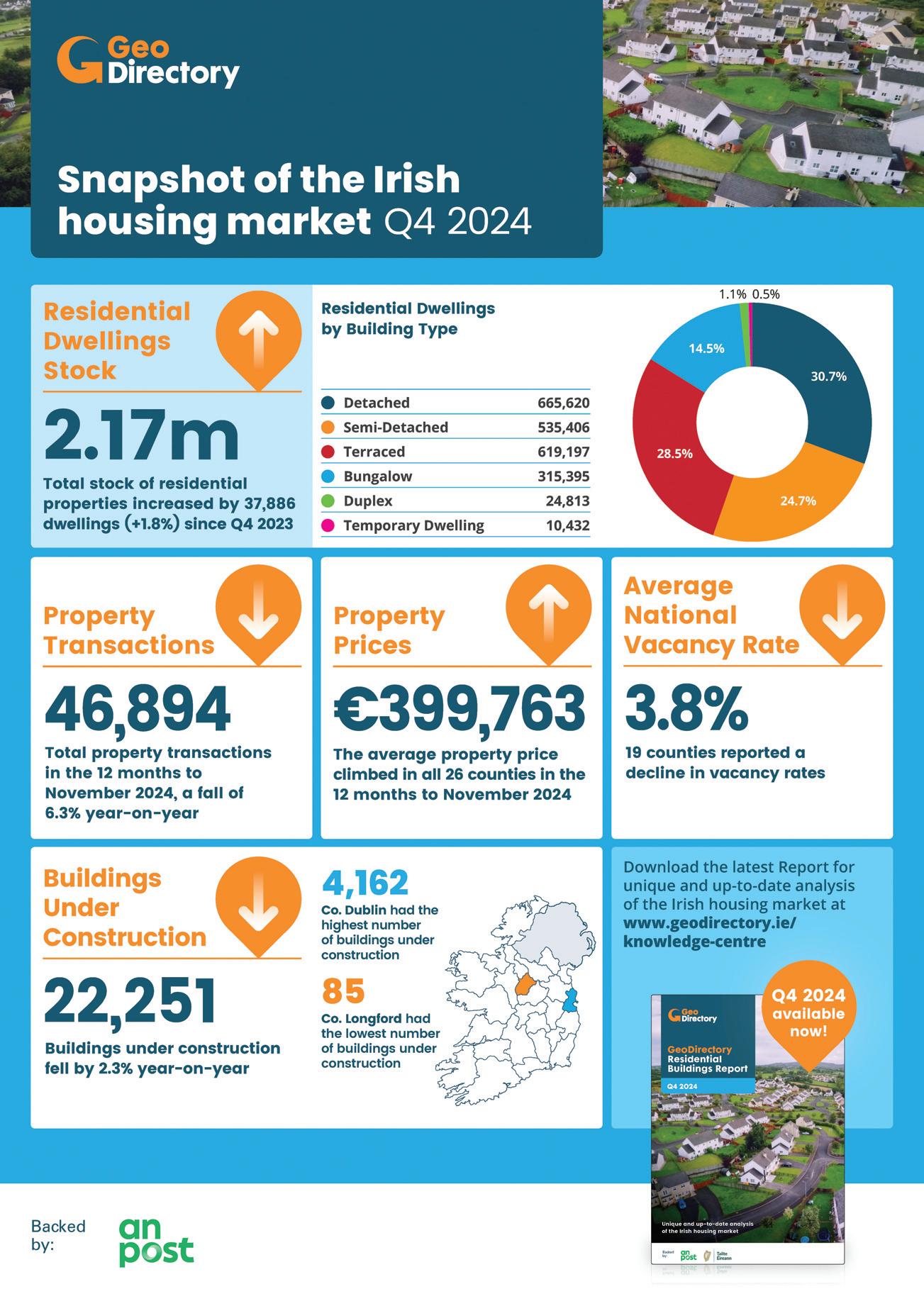
Ireland’s housing market in 2024 demonstrated both progress and persistent structural challenges, offering critical insights for shaping housing strategy in both the private and public sector.
A total of 34,686 new residential address points were added to the national stock in 2024, marking a 20.7 per cent yearon-year increase. This growth was concentrated in the Greater Dublin Area, which accounted for over half of all new addresses, with Dublin alone contributing 38.1 per cent. While this reflects a positive trajectory in housing delivery, it still represents just 1.6 per cent of the total housing stock, underscoring the need for sustained growth.
Despite a strong pipeline of 60,243 housing commencements (+83.7 per cent YoY), the number of buildings under construction declined by 2.3 per cent, and completions fell by 6.7 per cent. This lag between planning and delivery, highlights the well documented need for streamlined planning processes, capacity-building in the construction sector and the expansion of serviced land.
Vacancy rates declined marginally to 3.8 per cent nationally, with Dublin at a low of 1.2 per cent. However, 80,689 dwellings remain vacant or derelict, these figures point to an opportunity for adaptive reuse and refurbishment.
The average national house price rose in 2024 to €399,763, up 7.2 per cent yearon-year. Prices increased in all 26 counties, with the sharpest rises in Sligo, Westmeath, and Limerick. Meanwhile, rents reached an average of €1,955 per month, outpacing wage growth in many areas.
Affordability remains a critical concern. While it is cheaper to buy than rent in many counties – particularly for existing dwellings – first-time buyers face income gaps in 30 of 31 local authorities.
To address these challenges the solutions are well known and can be summarised in the following headings
• scaling up refurbishment incentives (e.g., Vacant Property Refurbishment Grant, Urban Regeneration Fund);
• accelerating planning approvals and infrastructure delivery;
• expanding affordable housing and first-time buyer supports; and
• leveraging data to target vacancy and dereliction hotspots.
The 2024 data underscore the need of a multi-pronged, regionally balanced housing strategy to meet Ireland’s growing and evolving housing needs.
The forthcoming GeoDirectory Residential Buildings Report 2025, set to be published in August, will provide updated insights into Ireland’s housing stock, vacancy trends, and regional supply dynamics.
W: www.geodirectory.ie




Jim Baneham is Director of Delivery and Innovation at The Housing Agency. He graduated from DIT Bolton Street in 1989 as a chartered quantity surveyor. Soon after, he began working with the National Building Agency (NBA) in the area of delivery of social housing and other local authority facilities. From 2007, he moved into a corporate role within the NBA before moving to The Housing Agency in 2011. It was there that he helped develop the AHB funding model. Since then, he has gone on to be Head of Housing Supply and Head of the Mortgage Support Section.


Joanna Bannon is a Director in Fieldfisher Ireland’s Real Estate department. She is an experienced and accomplished advisor to many institutional clients in relation to real estate transactions, particularly in the area of social housing acquisitions by local authorities and AHBs. Bannon also advises developers in relation to the set-up of housing schemes, sale of completed units and provides advices in relation to the construction and finance of the sites.


Pat Barry is Chief Executive Officer of the Irish Green Building Council (IGBC) which he co-founded in 2010. He is an Architect with many years of experience in Ireland and Europe, a master’s in environmental design of buildings from University of Cardiff and is a qualified Passive House and DGNB consultant. The IGBC is a membership organisation of over 430 corporate members with a mission of transitioning Ireland’s construction sector to sustainability, through advocacy, education and innovation. Barry is a partner in Construct Innovate Ireland’s construction technology centre.




































































































































































































































































































































































































































Paul Benson has responsibility at Acting Assistant Secretary level for the Social Housing Delivery Division with responsibility for leading and overseeing the delivery of commitments in the Programme for Government and under Housing for All in respect of social housing delivery and advancing related objectives under the National Development Plan and Project Ireland 2040. This includes the delivery of 90,000 new build social homes by local authorities and approved housing bodies by 2030 and further delivery of new social homes through acquisition and leasing programmes.
Neil Bolton, Respond’s Director of Housing, has over 20 years of strategic and operational experience in social housing in the UK and Ireland. He has held executive roles, including Operations Director and Property Director with Clúid Housing in Ireland and Customer Services Director for a large Bathbased Housing Association in the UK. Bolton also worked in senior housing roles for Bristol City Council and served as a non-executive director for the Irish Council for Social Housing from 2015-2017. He holds a postgraduate diploma in housing studies, a postgraduate diploma in business and executive coaching, and is a chartered member of the Chartered Institute of Housing.
Kieron Brennan has been CEO of Cooperative Housing Ireland since 2014. He has extensive experience in the community, voluntary and co-operative sector, which saw him lead the Irish League of Credit Unions from 20082014. Prior to this, he held a leadership position as a Programme Manager with POBAL, a not-for-profit community development and financing company, which manages programmes on behalf of the Irish Government and the EU. He was also Irish Manager of Triodos Bank (one of Europe’s largest ethical banks), Executive Director of Clann Credo (social development fund), and Chief Executive of Partas.



































































































































































































































































































































































































































Hugh Brennan is CEO of Ó Cualann Cohousing Alliance CLG. Brennan had worked in various contracting and consulting roles in Ireland before spending 10 years on humanitarian aid projects in South Africa and Haiti. Returning to Ireland, he cofounded Ó Cualann in 2014. Brennan has assumed the lead in developing the Ó Cualann model for affordable housing delivery throughout Ireland. In collaboration with local authorities, other AHBs and community led housing groups, Ó Cualann plans to deliver over 1,200 homes over the next five years.

Tony Bridgeman is housing lead at Uisce Éireann. Bridgeman has played a pivotal role in driving transformation across the organisation. The Dublin native brings over 40 years of experience in the utility sector, having worked with Bord Gáis and Gas Networks Ireland before joining Uisce Éireann. In his role, he has been actively engaging with large-scale developers and their representative bodies –the Construction Industry Federation (CIF) and the Irish Home Builders Association (IHBA) – to address obstacles that may delay housing developments.

James Browne was appointed Minister for Housing, Local Government and Heritage in January 2025. He was previously Minister of State at the Department of Justice with responsibility for International Law, Law Reform and Youth Justice. Browne was first elected to Dáil Éireann in the February 2016 general election as a representative of Wexford. He has served as the Fianna Fáil Spokesperson on Mental Health, leading initiatives to reform mental health services in Ireland, including the Mental Health (Amendment) Act 2018 and served on the Oireachtas Committee on the Future of Mental Healthcare. He was born in Enniscorthy, Wexford, and is the oldest of a family of four. He was educated locally at St Mary’s CBS, Enniscorthy before attending Waterford IT, University College Cork, and the King’s Inns. He was called to the Bar in 2006.


Liam Burke is Senior Executive Officer in the Housing and Community Development Department at Fingal County Council. He has over 40 years of local government experience, working mainly within the housing area, and is widely respected across the sector. He manages the delivery of housing support and homeless services in Fingal and the administration of the Tenancy Services Division and has worked extensively on the delivery of Traveller specific accommodation. Burke has led strategic and operational change and is committed to the transformation of systems in the delivery of housing services.


As Director of Housing and Community Development at Fingal County Council since 2023, Paul Carroll is responsible for all aspects of housing and community development across Fingal, working with elected members, community stakeholders and industry partners to support the ongoing sustainable growth of the county. Carroll is a member of various sectoral groups including the CCMA Housing Committee and the Government Construction Contracts Committee. A graduate of Trinity College Dublin, Carroll also holds postgraduate qualifications in strategic procurement, engineering and local government studies. Carroll joined Fingal County Council in 2017 as senior engineer in the Planning and Strategic Infrastructure Department, prior to which he worked as an engineer and project manager in a number of local authority, central government, and private sector organisations.


Padraic Clancy is Director of New Business and Development, leading the Co-operative Housing Ireland development team. Clancy has over 25 years’ in property acquisition and development and holds an Honours Degree in Surveying and a National Diploma in Estate Management. Clancy has managed properties on behalf of NAMA, all major banks and receivers and is a specialist in property management, security and maintenance. Clancy was previously Head of VPSitex in Ireland, managing the security and maintenance works on large mixed property portfolios for PWC, Mazars, Grant Thornton, and Duff and Phelps.



Mary Conway is Chairperson at Irish Property Owners Association. She is a qualified nurse and midwife and with a master’s degree in nursing (clinical practice) from UCD. Conway has been a residential landlord for 29 years with experience in student lets, houses of multiple occupancy, apartment letting, and Airbnb. She was the first female committee member of the Irish Property Owners Association. In addition to property management, lettings and sales of property, Conway is Ireland’s first senior move manager and Certified Living in Place professional. She supports older persons and their families who are going to transition to a new living space or rethink their current living arrangements.


Sharon Cosgrove became CEO of Oaklee in 2016 and has led significant change and growth in the organisation during that time. Oaklee has an ambitious team with a passion to make a difference to the lives of their residents. Sharon held several previous senior roles in the NGO sector including CEO of the Asthma Society of Ireland and Sonas Housing. Sharon is a founding member of the Housing Alliance and sits on an ICSH working group. She has driven innovation in Oaklee, through delivery of Acorn Housing’s SPV and the Comhar Consortium, the first social housing PPP bundle in Ireland.


John Coleman has been Chief Executive of the Land Development Agency since its inception in September 2018. Coleman previously held senior roles at Ireland’s National Asset Management Agency (NAMA), worked extensively on the set up of its Residential Delivery division and was its Chief Financial Officer. John is a graduate of University College Dublin (BComm) and a chartered accountant (FCA). Prior to joining NAMA in 2011, he worked in banking and accountancy.





































































































































































































































































































































































































































Kath Cottier was appointed as CEO at Fold Housing in January 2023. Cottier has over 20 years’ experience working in the Irish housing association sector; leading development, property and housing teams. Prior to Fold, at executive level in Clúid and Clann Housing, she was responsible for front-line services and working to lead the organisations strategic development and growth as well as contributing to strengthening the Housing Association sector. Cottier holds an MA in geography, diplomas in urban and community development, and property and facilities management, and an MSc in management practice from the Irish Management Institute. She is a chartered member of the Chartered Institute of Housing, and chair of its Ireland Board. Cottier is also a founding member of the Construction Defects Alliance, lobbying for financial redress for individuals and Housing Associations who bought homes that do not meet building standards.
John Cummins TD is a Minister of State at the Department of Housing, Local Government and Heritage with responsibility for local government and planning. Cummins was elected to the Dáil in the 2024 general election in the Waterford constituency. Prior to this, he was a Fine Gael Senator between 2020 and 2024, also serving as the party’s housing spokesperson. A former teacher, Cummins has a degree in physical education and geography teaching from the University of Limerick.
Niall Cussen is Ireland’s Planning Regulator and Chief Executive of the Office of the Planning Regulator (OPR) since its establishment in April 2019. The OPR works to ensure Ireland develops sustainably while protecting our environment and enhancing communities. The OPR independently assesses statutory local government plans for their fit with government planning policy and conducts reviews of systems and procedures used by local authorities and An Coimisiún Pleanála in their statutory planning functions. OPR also conducts research, training and public awareness around planning. Prior to his appointment, Niall was Chief Planner at the Department of Housing, Local Government and Heritage.




































































































































































































































































































































































































































Dara Deering is CEO of Home Building Finance Ireland having joined the organisation in 2019. Deering has extensive experience in financial services having previously served as Executive Director and Head of Retail Banking at KBC Bank Ireland plc since February 2012. During that time, Deering led the launch and implementation of a new retail bank, broadening the range of products and services available, and offering a new banking alternative for Irish consumers. Prior to her time in KBC Deering held a number of leadership positions in the retail financial services industry. She holds an MBA from Smurfit Business School and a bachelor of science in management from Trinity College Dublin.

Graham Doyle is Secretary General of the Department of Housing, Local Government and Heritage, having been appointed in July 2020 after the formation of the new Government. Previously, he was Secretary General of the Department of Transport, Tourism and Sport. Graham was an external recruit to the civil service in 2013, initially responsible for the Public Transport and Climate Change portfolio. His background is in aviation management and business consulting with experience in insolvency, corporate finance, and business strategy. He is a Chartered Accountant by profession, having trained with PwC, and holds a range of business-related qualifications, including an MBA. Beyond his own role, Doyle is a member of cross-government groups and boards including, for example, the Civil Service Management Board, the Public Service Leadership Board, and the Project Ireland 2040 Delivery Board.

Sinead Dunne joined The Housing Agency as CFO in October 2022. A qualified accountant by profession, she has over 20 years’ experience in leadership roles across the private and public sector having worked with AIB, Accenture, The Institute of Public Administration, Musgraves, South Dublin County Council and Dún Laoghaire-Rathdown County Council. She holds a BA from UCD along with diplomas in leadership development and executive coaching from Smurfit Business School.


Claire Feeney is Director of Services and Inclusion at The Housing Agency. Her directorate consists of approved housing body services, local authority services, the National Housing First Office, and Part V, all of which act as centres of excellence in their given areas to support The Housing Agency’s stakeholders. She joined Dublin City Council in the late 1980s. She spent time on secondment to the Department of Environment and Community computerising Motor Tax Offices and moved back to Dublin City Council in 2003 and had responsibly for a number of regeneration projects. She moved to the Limerick Regeneration Agencies in 2007 working as project management for the physical and economic regeneration. In 2012, Feeney joined The Housing Agency to manage the Mortgage to Rent Scheme nationally and drive the National Housing Strategy for Disabled People 2022-2027


Barry Gorman is the National Renewables Sales Manager at leading heating technology manufacturer Grant and has over 20 years’ experience in the heating sector. Gorman is responsible for helping to advance the deployment of renewables in Ireland through Grant’s award-winning sustainable and highly efficient heating technologies including the new Grant Aerona R290 air source heat pump range, HVO biofuel compatible Grant Vortex condensing boiler range, Grant Spira Pell condensing wood pellet boiler range and associated products. Barry leads the team working closely with local authorities, builders and developers across the country to support social housing projects, new build developments and retrofit projects to provide integrated heating solutions and technical support.


Tom Gilligan is the Director of Services at Mayo County Council, where he holds strategic responsibility for housing, roads, service development, and the Claremorris/Swinford Municipal District. A qualified accountant with an MBA in local government, Coleman brings a deep understanding of public sector policy and reform to his leadership role.



Paddy Gray is Professor Emeritus of Housing at Ulster University. He has over 300 publications in housing. In 2010 he was appointed the first and only Irish President of the Chartered Institute of Housing. He is a regular media commentator on housing related issues. He is currently Chair of the Wheatley Foundation and Vice Chair of Wheatley Homes Glasgow. He is Chair of Tuath Housing Association and iCare Housing, Dublin. In 2017, he was appointed to the Board of the Residential Tenancies Board (RTB) in Ireland and chairs its Research Committee.


Tom Grey graduated from DIT Bolton Street in 1998 with an honours degree in architecture and followed this with a master’s in sustainability of the built environment at the University of Auckland. With over 10 years in architectural practice working on projects in Ireland, the UK, Croatia, the US and NZ, Grey joined TrinityHaus Research Centre in Trinity College Dublin as a research fellow in 2009. Since then, he has undertaken a variety of Irish and European urbanism and building design research projects exploring the relationship between the urban built environment and health, inclusion, resilience, sustainability, and climate change. All underpinned by people-centred design, universal design, co-creation, and stakeholder engagement.


John Hannigan is Chief Executive Officer of Circle Voluntary Housing Association. He took up his current position in September 2017. Hannigan previously held the position of Managing Director of Sunbeam House Services from 2010. Prior to that, he worked as Finance Director with Respond Housing Association. Hannigan is a member of the board of The Housing Alliance, an alliance of seven of the largest housing associations in Ireland. He is the Chair of the governing board of the Chartered Institute of Housing with 17,000 members worldwide. Hannigan is a Chartered Director, a Fellow of the CIH and a Fellow of the Chartered Association of Certified Accountants. He is also a board member of Clanmil Group in Northern Ireland and chairs two of its subsidiaries.





































































































































































































































































































































































































































Roger Harrington is a Principal Officer at the Department of Housing, Local Government and Heritage and since 2020 has responsibility for the policy and operations for the Capital Advance Leasing Facility (CALF). He has over 30 years’ experience in a variety of policy and operational roles across a number of government departments. Roger holds an MSc in public policy from Dublin City University.
Rory Hearne TD is the Social Democrats’ housing spokesperson, having been elected to the Dáil in the Dublin NorthWest constituency in November 2024. Prior to entering politics, Hearne was a noted housing academic, working as an associate professor in social policy at Maynooth University. Hearne has been cited as an authority on the housing crisis by the New York Times. His book on the housing crisis, Gaffs was released in 2022 and became a bestseller.
Dan Hill is Director of Melbourne School of Design, the graduate school in the Faculty of Architecture, Building and Planning at the University of Melbourne, and Professor of the Built Environment. He was formerly Director of Strategic Design at Vinnova, the Swedish government’s innovation agency. A designer and urbanist, Hill’s previous leadership roles include Vinnova in Stockholm, Arup in Sydney and London, the Finnish innovation fund SITRA in Helsinki, Fabrica in Italy, the Future Cities Catapult, and the BBC in London. Hill is also a professor at UCL Institute for Innovation and Public Practice and founder member of the Council on Urban Initiatives, a joint venture between UN-HABITAT, LSE and UCL.




































































































































































































































































































































































































































Stuart Hobbs is Director of Energy Services at SSE Airtricity, which he joined in 2009. With over 25 years of experience in the energy industry, he previously worked at ESB Networks for 10 years. Hobbs holds a degree in human resource management and an MSc in management and leadership from UCD Smurfit Business School. He oversees a portfolio of energy solutions to improve efficiency for SSE Airtricity Energy Services’ clients. Hobbs manages government-funded housing upgrade programs and partnerships, including SSE’s investment in Activ8 Energies and serves as an advisor to its board. He is also a director of EnergyCloud, a non-profit focused on using renewable energy to support those in fuel poverty.

Paul Hogan is Assistant Secretary, Head of the Planning Division, Department of Housing, Local Government and Heritage (DHLGH). He has more than 30 years’ experience of working in planning and development in Ireland and the UK. Hogan’s current responsibilities include reform and resourcing of the planning system to support the delivery of housing, infrastructure and the national response to climate change. Hogan’s previous role at the Department of Housing as Principal Adviser included leading the planning and land elements of Housing for All. Prior to joining the Department in 2015, Hogan was a Senior Planner at South Dublin County Council for more than 10 years. He has a master of urban and regional planning degree from UCD (1992), is a fellow of the Irish Planning Institute and recently completed a higher diploma in organisational change and transformation.

David Howard is the Director of the Property Industry Group in Ibec, including Property Industry Ireland (PII), and the Building Materials Federation and its affiliated associations since February 2025. Howard joined Ibec in 2013 initially as policy executive for PII and then later served as senior property policy executive. During this period, Howard also served two secondments with Ibec’s Financial Services Ireland trade association, firstly as senior regulatory affairs executive and later as FSI deputy director. Prior to joining Ibec, Howard worked for several trade associations in Brussels including in the automotive battery, candle, plant hire and gas industries. Howard is a native of Galway and holds B Comm and LLB degrees from University of Galway.


Norman Jackson is Director of Built Environment with The Housing Agency. Jackson graduated from Trinity College Dublin in 1994 with a BSc in construction economics. He was a quantity surveyor with the National Building Agency (NBA) before moving to east Africa where he worked in Development and Emergency Relief. He returned to the NBA in 2005 and joined The Housing Agency in 2011, becoming senior quantity surveyor in 2012, and senior procurements and projects advisor in 2017. Jackson was appointed to his current post in 2024 and manages the projects and procurement sections with architects, engineers and quantity surveyors who provide technical professional advice and services to local authorities, approved housing bodies, and other stakeholders.


Parag Joglekar, Director of Investment and Development at Respond, is a registered architect in Ireland and the UK. He holds a master’s degree in architecture from University of Leuven and a postgraduate diploma in real estate investment finance from Oxford Brookes University. A member of the RIAI and ARB, Joglekar has over 25 years of experience in urban design, housing, regeneration, and commercial projects. Since joining Respond in 2001, he leads a 23member team managing a €1.5 billion development pipeline, fostering strategic partnerships, and contributing as a speaker at housing events.

David Kelly has responsibility at Assistant Secretary level for the Homelessness, Rental and Social Inclusion Division of the Department of Housing, Local Government and Heritage. This includes overseeing policy development and the implementation of actions to meet objectives set out in the Programme for Government and Housing for All. The Division is responsible for national policy and funding to support local authorities to address homelessness, including the management of funding provided to local authorities to manage emergency accommodation and related supports.



Vincent Keenan was appointed Chief Executive of North and East Housing Association in 2014, he has some 30 years’ experience in homelessness, housing management and development. Keenan is Chairperson of Badminton Ireland and former Chairperson of The Wheel, Ireland’s national association of community and voluntary organisations, charities, and social enterprises. Keenan is a Chartered Director and a Chartered Member of the Chartered Institute of Housing. Vincent holds qualifications in Housing management, community development, counselling and has BSc (Hons) Degree in Business Studies from Ulster University and a postgraduate certificate in not for profit leadership.


Keogh has led GeoDirectory for 10 years, developing the products, the company and the offering. He moved GeoDirectory from its project phase to its current commercial offering. GeoDirectory has based its success in its quality data intertwined with technologies to deliver new and exciting perspectives. GeoDirectory was jointly established by An Post and Ordnance Survey Ireland (OSi) to create and manage Ireland’s only complete database of commercial and residential buildings. GeoDirectory has not only built a national, database it has produced reports, based on its data, in partnership with DKM economic consultants. These reports highlight important trends in the context of developing the National Planning Framework and endeavouring to redistribute economic growth outside of Dublin to other counties and towns across the country.


Aoife Lawler is a Senior Executive Officer responsible for social and affordable housing delivery within Fingal County. With a profound understanding of the housing challenges facing communities, Lawlor has been instrumental in spearheading innovative initiatives to address the pressing need for accessible housing options. Within Fingal County Council, Lawlor has championed collaborative approaches that bring together local government, private developers, and community stakeholders to tackle the housing crisis head-on. Through strategic partnerships she has been part of a crossdirectorate team that continues to facilitate the construction of quality, affordable homes for individuals and families across the county.





































































































































































































































































































































































































































Steve Loveland moved into his present role of Head of Age-Friendly Housing at Clúid in 2024. Loveland has more than 20 years of experience in housing, working across supported accommodation services, homelessness services, resident engagement and management of frontline housing teams. Loveland is co-chair of the European Federation for Living’s Age-Friendly Topic Group, a network of 70 European members and associates across 19 countries, as an SROI practitioner, member of Social Value Ireland and Advisory Board member for the Common Purpose Leadership Programme.
Rob Lowth is National Director of the National Office for Housing First. He is a former housing senior executive officer, housing maintenance manager and coordinator of homeless services at Limerick City and County Council, in a local government career that began in 2003. He previously worked as a project manager in the technology sector. Lowth holds technical qualifications in computer systems and a BA in management. He is currently undertaking a master’s in addiction recovery at Trinity College, bridging his knowledge to enhance a wider social inclusion skillset.
Gordon Lyons MLA is the Minister for Communities in the North. The Department for Communities has responsibility for housing policy in Northern Ireland. Lyons is a DUP Member of the Legislative Assembly (MLA) in East Antrim, where he was first elected in 2015. Lyons became Communities Minister in February 2024, having previously served as Minister for the Economy (2021-2022), Minister for Agriculture, Environment and Rural Affairs (2021), and as a Junior Minister at the Executive Office (2021).




































































































































































































































































































































































































































Donald MacDonald is a Director of Hooke & MacDonald with over 20 years of multi-disciplinary experience including urban planning, property design and development, appraisals, property management and disposals (15 years with Hooke & MacDonald); real estate development lending (two years), financial accounting and auditing (four years with Grant Thornton). He is a Fellow of Chartered Accountants Ireland and has a master’s in planning and development. MacDonald is a key member of Hooke & MacDonald’s capital markets team and regularly represents the company at domestic and international real estate events. He is generally regarded as being one of the country’s leading experts in the public and private housing sectors.

Since 2010 Bent Madsen has filled the chair as CEO of BL – Danish Social Housing, the national federation of social housing organisations in Denmark. Madsen also holds the Presidency of Housing Europe (the European Federation of Public, Cooperative and Social housing), and is Chairman of NBO – Housing Nordic (the Nordic association of co-operative social housing organisations).

Claire Madden is General Counsel at Bord Gáis Energy and a member of its executive management team. She has responsibility for legal, regulation and compliance in Bord Gáis Energy. Madden joined in early 2024 from Gas Networks Ireland where she was Chief Legal Officer. She has extensive experience in energy, infrastructure, and renewables as well as expert knowledge in energy regulation and reform having advised utilities, funders and regulators on energy sector transactions.


Fidelma McManus is a partner in Beauchamps’ Commercial Real Estate department and heads the firm’s specialised housing team. She has particular expertise in complex conveyancing and is an acknowledged market leader in the acquisition, development, and management of social and affordable housing. McManus is ranked as a leading individual by Legal 500 and is ranked in Chambers and Partners, and her housing team has been recognised for its contribution to Irish society with the Public Sector Excellence in Business Award for housing services for six successive years. She was also recently named one of the Business Post’s top 100 most influential people in property, underscoring her significant impact and leadership in the sector.


Donal McManus is CEO at Irish Council for Social Housing (ICSH), the national federation of housing associations. He previously worked since the 1990s in the public/local authority and housing association sectors in Scotland and Northern Ireland. He has also worked in urban design and land assembly within the private sector. McManus was president of the non-profit housing section of Housing Europe, chair of the European Housing Forum and FEANTSA. From 2003-2005, he served as a member of the UN-ECE Task Force on Social Housing. He is a graduate in housing from Ulster University, and Urban Design from Strathclyde University School of Architecture Glasgow. He received a doctorate in Governance from Queen’s University Belfast, School of Law on financialisation and impact of private finance on housing association delivery. McManus was previously a board member of The Housing Agency and member of its Audit and Risk Committee. McManus is currently Chairperson of Housing Europe’s Working Group on Economics, Finance and EU Internal Market and he represents the ICSH on a number of national social and affordable housing working groups.


A native of Galway city, Gerry McDonogh is the chairperson of the CHI Board. He is a chartered accountant and experienced finance professional having spent his early career working with PwC and subsequently spent 28 years with Musgrave Group in senior finance leadership positions before retiring in 2021. He has extensive experience in financial risk management, corporate governance and regulatory compliance. McDonogh is the chairperson of Elevate Credit Union, a not-for-profit regulated financial institution. He lives in Cork with his family.



Niall Morrissey has worked in senior management positions in local government for 20 years. He has worked in local authorities in Kilkenny, Tipperary, Laois and as Director of Services for roads, transportation, and public safety in Kildare County Council. Morrissey has an extensive range of managerial experience having also been employed as manager of a voluntary housing body and as CEO of South Tipperary Development Company which provides supports to SMEs, entrepreneurs and the unemployed. In addition to his project management experience within local government and the community development sector, Niall worked for seven years in the private sector as Business Development Director with the Thornsett Group, a residential and commercial property development firm. Morrissey has a BA (Honours) in Public Administration.


Eoin Ó Broin TD has been a Sinn Féin activist for over 20 years. He is the party’s Dáil spokesperson on housing, local government and heritage. A Dublin Mid-West TD since 2016, Ó Broin published a book in 2019, Home: Why Public Housing is the Answer, which became a surprise bestseller. He was a member of Belfast City Council from 2001 to 2004 and was the party’s director of European affairs from 2004 to 2007.

Joining Clúid in 2022, Niall Ó Ceallacháin is Clúid’s Chief Operations Officer (COO). Ó Ceallacháin has 19 years’ experience across the not-forprofit and financial services sectors. Most recently, Ó Ceallacháin held the role of Chief Financial Officer and Global Director of Business Development with the international NGO, GOAL. Ó Ceallacháin holds a bachelor of business studies from DCU, is a fellow of the ACCA and holds diplomas in Leadership and Organisational Development and Transformation from the IMI. As COO, Ó Ceallacháin brings leadership and strategic direction to Clúid’s customer-facing services, the housing and property departments, establishing a single customer experience for residents.





































































































































































































































































































































































































































Eibhlín O’Connor is Clúid Housing’s Chief Commercial Officer. O’Connor is a chartered member of the Royal Institute of Architects of Ireland and holds a master’s in construction law and dispute resolution from King’s College, London, and a postgraduate diploma in construction law and contract administration from Trinity College Dublin. With over 20 years’ experience working in the construction industry, O’Connor has worked at a senior level with key stakeholders, local authorities and developers in the delivery of social housing.
Ruth O’Connor is a Partner in the property department at O’Connor LLP and has established an impressive portfolio of corporate and commercial clients. O’Connor provides advice to housing bodies in relation to the acquisition of social and affordable housing, deals with the acquisition disposal and leasing of corporate headquarters, retail, industrial and office premises, advises on all aspects of land development and deals with a large body of private clients in relation to residential property matters. She has advised charitable trustees on their duties and responsibilities and deals with all aspects of the management and administration of charitable trusts and charitable organisations.
Sean O’Connor is Chief Executive of Tuath Housing Association, the fastestgrowing AHB in Ireland with over 15,000 social and affordable rent homes across the country, managed from offices in Cork, Dublin, Dundalk and Galway. O’Connor has a master’s degree in housing from South Bank University, London and is a chartered surveyor with membership of the Society of Chartered Surveyors Ireland and the Royal Institution of Chartered Surveyors, along with the Chartered Institute of Housing. O’Connor has worked in housing at a senior level for over 35 years in the private, public, and not-for-profit housing sectors delivering award winning schemes and establishing a solid track record of working with communities to deliver positive change.




































































































































































































































































































































































































































John was the Chair of The Housing Commission which published its final report in May 2024. He was the Chief Executive Officer of The Housing Agency for 10 years. Previous roles included Chief Executive of the Affordable Homes Partnership, and Executive Manager of the Housing and Communities Department in Dublin City Council. He worked in the construction industry before moving to local government. He is a chartered and holds qualifications in other areas including governance and project management. O’Connor has served on a wide range of boards and committees; and as chair on a number of these. Currently, he is on the board of the Land Development Agency.

John O’Donoghue is a partner and head of the real estate department at Philip Lee specialising in commercial real estate with a focus on residential development and social housing. He works closely with colleagues in the construction law team at Philip Lee, advising on development agreements which provide for design and build of ‘turn-key’ projects to be delivered to meet social housing needs. O’Donoghue has over 20 years’ experience in advising clients on site assembly and development agreements, high-value property acquisitions and disposals, complex title structures, joint ventures/collective property investments, and business leases. O’Donoghue is ranked in Chambers and Legal 500 Legal 500 describes him as “exceptional in his profession with very good experience in a range of areas”. “He can both discuss openly a topic but also ultimately step back and give very clear advice.”

Mark O’Donnell is the Deputy Secretary with responsibility for the Housing and Sustainability within the North’s Department for Communities. A native of Coleraine, O’Donnell graduated in sociology from the University of Ulster in 1991. O’Donnell entered the Northern Ireland Civil Service in 1993 and served as private secretary to Nigel Dodds and Maurice Morrow, the Ministers for Social Development when that Department was established in 1999.


Brian O’Gorman is the CEO of Clúid Housing, one of the largest approved housing bodies (AHBs) in Ireland, with a portfolio of assets in excess of €2 billion. O’Gorman leads an awardwinning team of over 300 qualified professionals who are delivering a housing pipeline of new social and cost rental homes. Clúid has an ambitious delivery target of more than 1,000 new homes every year, and they now manage well over 11,000. He is a resolute advocate of the important role of social and cost rental housing, the quality and design of which makes it indistinguishable from any other housing.


Ronan O’Halloran is Director of Remediation at The Housing Agency. He is a chartered civil engineer and prior to joining the Agency worked at the Department of Children, Equality, Disability, Integration and Youth as Programme Manager in the Ukraine Division. He previously worked with the Office of Public Works and also served as an Army Officer with the Irish Defence Forces Corps of Engineers. As Director of Remediation, he leads on the various remediation programmes in areas such as pyrite, defective concrete blocks and apartment and duplex defects.


Fergal O’Leary was appointed CEO of AHBRA in September 2024. An experienced public sector leader, O’Leary has in-depth knowledge of governance, regulation and enforcement, research and policy development as well as corporate and consumer communications. Prior to joining AHBRA, O’Leary led the development of a new statutory registration regime for short-term tourist accommodation with Fáilte Ireland as part of the Housing for All strategy. Previously he was a Commissioner with the Competition and Consumer Protection Commission. O’Leary holds a master’s in applied governance and a masters in economics.



Kieran O’Donnell TD is a Minister of State at the Department of Housing, Local Government and Heritage with responsibility for housing. O’Donnell has been a Fine Gael TD in the Limerick City constituency since 2020. O’Donnell was appointed to his current junior ministerial role in January 2025, having served a previous stint at the Department between 2022 and 2024, when he held responsibility for planning.


Breen Purcell is a Partner and Head of the Real Estate Department at Fieldfisher Ireland LLP. He has acted in property-based lending transactions over the past 20 years and has considerable experience in the acquisition and disposal of residential and commercial property. He regularly acts for landlords and tenants in the negotiation and drafting of commercial leases and advises on planning and licencing matters. He works with a client base of vendors, developers, borrowers and lenders in managing all types of acquisitions, disposals and property financing.


Angelyn Rowan is a Partner in the projects and construction team at Philip Lee. Rowan has extensive experience advising funders, developers, employers and contractors on all aspects of the procurement and construction of major projects. She has advised public sector bodies on the procurement of several state projects including the National Development Finance Agency on the first healthcare and social housing public private partnerships in Ireland. In addition to her PPP and procurement experience, Rowan advises on a wide-range of construction law matters, both contentious and non-contentious, including renewables projects, commercial office, social housing, education and healthcare. Rowan is recognised in both Chambers and Legal 500 for her expertise in projects and construction.


Conor Sheehan TD is the housing spokesperson of the Labour Party. First elected to the Dáil in 2024, Sheehan is a TD for the Limerick City constituency. He holds a degree in journalism from Dublin City University.





































































































































































































































































































































































































































David Silke is Director of Insights and Operations at The Housing Agency. His directorate includes research, policy and practice, communications, training and development, HR, ICT and facilities. His previous roles include as Director of the Centre for Housing Research, Policy Analyst in the National Economic and Social Forum, Researcher in the Combat Poverty Agency, and Senior Researcher in the Department of Social Security (UK). His qualifications include a degree in social science (UCD), a master’s in social policy and planning (LSE); and professional diplomas in governance (IPA), business and finance (IMI), and strategy and innovation (IMI). Silke is a chartered member of the Chartered Institute of Housing.
Lorcan Sirr is a Senior Lecturer in Housing at Technological University Dublin. He has authored, co-authored and edited numerous papers, research reports, and books. His most recent book is Housing in Ireland: Beyond the Markets, published in 2022. Other books include Dublin’s Future: new visions for Ireland’s capital city (Liffey Press: 2011), Renting in Ireland: the public, private and voluntary sectors (IPA: 2014) and Housing in Ireland: the A-Z guide (Orpen Press: 2019). He writes regularly for various newspapers including The Irish Times. Sirr has an MA from the Katholieke Universiteit Leuven in Belgium, and an MA and PhD in planning.
Paddy Smyth is a Partner in Fieldfisher Ireland LLP’s Real Estate team. He is a recognised expert in commercial property and real estate finance with a particular focus on residential development. Smyth is passionate about the delivery of social and affordable housing in Ireland. He and the team at Fieldfisher regularly act for developers, funders, local authorities and approved housing bodies in transactions at all stages of the housing delivery process from land acquisition, development funding and construction through to delivery to local authorities and AHBs.




































































































































































































































































































































































































































Richard Stowe is a projects and construction lawyer, heading up the Beauchamps’ construction team, with over 25 years’ experience in specialist construction practices in Ireland and Australia both in contentious and noncontentious roles. He has had extensive experience advising in relation to a large number of high value infrastructure and construction projects in both jurisdictions. Since returning to Ireland, Richard has been engaged primarily in property development work, particularly in the social and affordable housing sphere. His expertise includes drafting and advising on contracts for building and engineering works at all tiers, contracts for design consultancy services, project/construction management services, FM/OM services, collateral warranty documentation and agreements for all facets of PPP project work, property development and infrastructure provision.

Rosemary Steen was appointed as Director of the Residential Tenancies Boards (RTB) on 2 September 2024. She joined the RTB following four years as CEO of the Design and Crafts Council Ireland (DCCI) an agency of the Department of Enterprise, Trade and Employment. Before joining DCCI she was an Executive Director with EirGrid for six years responsible for regulation, customers, direct connections to the national grid and public affairs. She has extensive business experience; working with global companies such as Vodafone and Shell and she worked for the employers group Ibec, serving on the National Economic and Social Council.

Caroline Timmons holds responsibility at Assistant Secretary level for the Affordable Housing Division, including oversight of the development and delivery of the Division’s commitments and deliverables under the Programme for Government and Housing for All, particularly Pathway 1 in relation to Homeownership and Increasing Affordability, Pathway 3 in relation to Increasing New Supply and Pathway 4 in relation to Addressing Vacancy. Timmons leads and manages an inter-disciplinary team to deliver a broad range of objectives in the housing area.


Aoife Watters joined Respond as Chief Executive Officer in April 2025. She brings extensive leadership experience across both the charity sector and private industry, with a strong track record in governance, strategic planning, and financial management. Watters has held senior auditor roles in London and Dublin, as well as executive and non-executive roles in the not-for-profit sector, with a particular focus on housing and homelessness. She previously served as director of finance and corporate services for a large cross-border housing and homelessness charity. Watters has also held board-level roles with another approved housing body (AHB) where she acted as chair and led its finance and audit subcommittee.


William Walsh is Chief Executive Officer in Sustainable Energy Authority of Ireland (SEAI), having previously held the position of both Chief Operations Officer and Chief Financial Officer. Walsh joined SEAI in 2013. Prior to joining SEAI he worked for IFI where he held a number of roles including Assistant Chief Executive Officer and Director. Before this he held senior management positions in the private sector. Walsh is a Chartered Accountant, holds a Bachelor of Business Studies from Dublin City University and a Graduate Diploma in Strategy, Innovation and Change from UCD.


Martin Whelan is CEO of The Housing Agency. Previously he served as a senior official at the National Treasury Management Agency (NTMA), where he worked across the NTMA’s core international funding and investment, corporate financial advisory, project execution, and claims and risk management mandates and affiliate businesses including Home Building Finance Ireland and Strategic Banking Corporation of Ireland. Prior to joining the NTMA, Whelan was a member of the senior leadership team at the National Asset Management Agency (NAMA) during its critical start-up and growth phase. Whelan has also held senior positions in management and business consultancy. He is a chartered director (Institute of Directors).


Housing Ireland 2025 took place on 20 March at Croke Park, Dublin. Over 400 delegates attended the event, which was held in association with The Housing Agency and sponsored by Beauchamps and the Land Development Agency. The conference explored the challenges, and tangible opportunities for Ireland’s housing practitioners as they seek to deliver 303,000 new homes by 2030. Delegates in attendance heard from speakers, both visiting and local, from organisations including the Department of Housing, Local Government and Heritage; Local Government Management Agency; Housing Europe; Irish Council for Social Housing; University of Melbourne; Trinity College Dublin; and Tuath Housing Association.








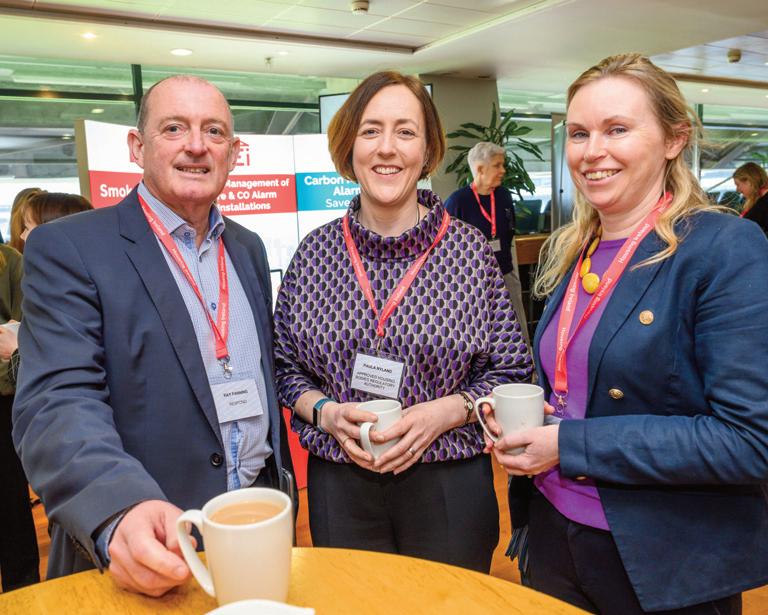




The following is an A-Z list of organisations and individuals involved in the Irish housing sector including government contacts, housing associations and advisors.
Department of Housing, Local Government and Heritage
Custom House, Dublin, D01 W6X0
Tel: 01 888 2000
Web: www.gov.ie/housing
Newtown Road, Wexford, Y35 AP90
Tel: 01 888 2000
Government Offices, Ballina Co Mayo, F26 E8N6 Tel: 01 888 2000
Minister: James Browne TD Tel: 01 888 2403
Email: minister@housing.gov.ie
Minister of State, Local Government and Planning: John Cummins TD Tel: 01 888 2597
Email: ministerofstate@housing.gov.ie
Minister of Nature, Heritage and Biodiversity: Christopher O’Sullivan TD Tel: 01 888 2425
Email: MOS@housing.gov.ie
Minister of Older People and Housing: Kieran O’Donnell TD Tel: 01 888 2373
Email: MoSOffice@housing.gov.ie
Secretary General: Graham Doyle
Assistant Secretary, Local Government: Fiona Quinn
Assistant Secretary, Housing Policy and standards: Caroline Timmons
Assistant Secretary, Heritage Division: Niall Ó Donnchú
Assistant Secretary, Affordable Housing:
Caroline Timmons
Assistant Secretary, Corporate and Business Support: Marguerite Ryan
Assistant Secretary, Water: Fintan Towey
Acting Assistant Secretary, Planning: Paul Hogan
Assistant Secretary, Homelessness, Rental and Social inclusion: David Kelly
Acting Assistant Secretary, Social Housing Delivery: Paul Benson
Joint Committee on Housing, Local Government and Heritage
Leinster House
Kildare Street
Dublin, D02 XR20
Tel: 01 618 3325
Email: jchlgh@oireachtas.ie
Clerk to the Committee: Daniel Hurley
Committee membership
Teachtaí Dála
Micheál Carrigy, Fine Gael
Séamus McGrath, Fianna Fáil
Richard Boyd Barrett, People Before ProfitSolidarity
Paula Butterly, Fine Gael
Joe Cooney, Fine Gael
Thomas Gould, Sinn Féin
Rory Hearne, Social Democrats
Willie O’Dea, Fianna Fáil
Eoin Ó Broin, Sinn Féin
Seanadóirí
Pat Casey, Fianna Fáil
Joe Flaherty, Fianna Fáil
Aubrey McCarthy, Independent
Maria McCormack, Sinn Féin
PJ Murphy, Fine Gael
Government agencies and bodies involved in housing
An Coimisiún Pleanála
64 Marlborough Street, Dublin 1 D01 V902
Tel: 01 858 8100
Email: bord@pleanala.ie
Director of Planning: Ciara Kellett/Erika Casey
Approved Housing Bodies
Regulatory Authority
4th Floor, Grattan House 67-72 Mount Street Lower
Dublin 2 D02 H638
Tel: 01 224 3900
Web: www.ahbregulator.ie
Email: info@ahbregulator.ie
Chair: Eddie Lewis
Chief Executive Officer: Fergal O’Leary
Coillte
Dublin Road
Newtownmountkennedy
Co Wicklow A63 DN25
Web: www.coillte.ie
Email: info@coillte.ie
CEO: Imelda Hurley
Home Building Finance
Ireland
Treasury Dock
North Wall Quay
Dublin 1, D01 A9T8
Tel: 01 238 4600
Email: info@hbfi.ie
CEO: Dara Deering
The Housing Agency
53 Mount Street Upper Dublin 2, D02 KT73
Tel: 01 656 4100
Web: www.housingagency.ie
Email: info@housingagency.ie
Chair: Michael Carey
CEO: Martin Whelan
Director of Insights and Operations: David Silke
Chief Financial Officer: Sinead Dunne
Director of Delivery and Innovation: Jim Baneham
Director of Services and Inclusion: Claire Feeney
Director of Built Environment: Norman Jackson
Director of Remediation: Ronan O’Halloran
Housing Finance Agency
46 St Stephen’s Green
Dublin 2
D02 WK60
Tel: 01 872 5722
Web: www.hfa.ie
Email: cosec@hfa.ie
Chief Executive Officer: Deirdre Collier
Land Development Agency
2nd Floor, Ashford House
Tara Street, Dublin 2
D02 VX67
Tel: 01 910 3400
Web: www.lda.ie
Email: info@lda.ie
Chief Executive: John Coleman
National Construction Training Campus
Mount Lucas
Daingean, Co Offaly
R35 XW10
Tel: 057 936 2508
Email: info@mountlucas.ie
Office of the Planning Regulator
Park House, Grangegorman
191-193A North Circular Road
Dublin 7, D07 EWV4
Tel: 01 854 6700
Web: www.opr.ie
Email: info@opr.ie
Chief Executive and Planning Regulator: Niall Cussen
Uisce Éireann
Colvill House
24–26 Talbot Street
Dublin 1
Tel: 01 707 2828
Web: www.water.ie
Managing Director: Niall Gleeson
Residential Tenancies Board
PO Box 47
Clonakilty
Co Cork
Tel: 0818 303 037
Web: www.rtb.ie
Chair: Owen Keegan
Director: Rosemary Steen
Sustainable Energy Authority of Ireland
3 Park Place
Hatch Street Upper
Dublin 2
Co Dublin
D02 FX65
Tel: 01 808 2100
Web: www.seai.ie
Email: info@seai.ie
Chief Executive: William Walsh
The Further Education and Training Authority
Block 1
Castleforbes House
Castleforbes Road
Dublin 1
D01 A8N0
Tel: + 353 (01) 533 2500
Web: www.solas.ie
Email: info@solas.ie
CEO: Andrew Brownlee
Tailte Éireann
Web: www.tailte.ie
Email: customer.services@tailte.ie
CEO: Liam O’Sullivan
Land Registry Public Office –Tailte Éireann
Chancery Street
Dublin 7, D07 T652
Registry of Deeds
Henrietta Street
Dublin 1, D01 EK82
Valuation Division — Tailte Éireann
Irish Life Centre
Abbey Street Lower Dublin 1, D01 E9X0
Carlow County Council
County Buildings, Athy Road
Carlow, R93 E7R7
Tel: 059 917 0300
Web: www.carlow.ie
Chief Executive: Coilín O’Reilly
Director of Services, Community Development, Recreation, Amenity, Sports, Arts, Culture, Libraries, Museum and Heritage: Michael Brennan
Acting Director of Services: Housing and Ukrainian Humanitarian Response: Fiona O’Neill
Cavan County Council
Cavan Courthouse, Farnham St Abbeyland, Cavan
H12 R6V2
Tel: 049 437 8300
Web: www.cavancoco.ie
Email: housing@cavancoco.ie
Chief Executive: Eoin Doyle
Director of Services, Housing, Libraries and Cultural Services, Human Resources and Corporate Services: Lynda McGavigan
Clare County Council
Áras Contae an Chláir
New Road, Ennis
Co Clare, V95 DXP2
Tel: 065 684 6334 or 065 684 6403
Web: www.clarecoco.ie
Email: housing@clarecoco.ie
Chief Executive: Gordon Daly
Director of Social Development: Jason Murphy
Housing Department, Senior Executive Officer: Padraig MacCormaic
Cork City Council
Housing and Community Directorate
City Hall, Anglesea Street
Cork, T12 T997
Tel: 021 492 4000
Web: www.corkcity.ie
Email: housing@corkcity.ie
Chief Executive: Valerie O’Sullivan
Director of Housing: Alison O’Rourke
Cork County Council
County Hall
Carrigrohane Road
Cork, T12 R2NC
Tel: 021 427 6891
Web: www.corkcoco.ie
Email: housing@corkcoco.ie
Chief Executive: Moira Murrell
Housing Director: Maurice Manning
Donegal County Council
County House, The Diamond Lifford, Co Donegal, F93 Y622
Tel: 074 915 3900
Web: www.donegalcoco.ie
Email: info@donegalcoco.ie
Chief Executive: John McLaughlin
Director of Housing, Corporate and Cultural Services: Patsy Lafferty
Dublin City Council
Housing and Community Department
Block 1, Floor 1
Civic Offices
Wood Quay
Dublin 8, D08 RF3F
Tel: 01 222 2222
Web: www.dublincity.ie
Email: customerservices@dublincity.ie
Chief Executive: Richard Shakespeare
Assistant Chief Executive, Housing: Mick Mulhern
Director of Dublin Regional Homeless
Executive: Mary Hayes
Executive Manager Housing Delivery: Martin Donlon
A/City Architect: Owen O’Doherty
Dún Laoghaire-Rathdown
County Council
County Hall, Marine Road
Dún Laoghaire
Co Dublin, A96 K6C9
Tel: 01 205 4700
Web: www.dlrcoco.ie
Email: housingallocations@dlrcoco.ie
Chief Executive: Frank Curran
Director of Housing: Gerard O’Sullivan
Fingal County Council
County Hall, Main Street
Swords, K67 X8Y2
Tel: 01 890 5994
Web: www.fingal.ie
Email: housing@fingal.ie
Chief Executive: AnnMarie Farrelly
Director Housing and Community Department: Paul Carroll
Senior Executive Officer, Housing Support: Liam Burke
Senior Architect: Carmel Brennan
Galway City Council
City Hall, College Road
Galway
H91 X4K8
Tel: 091 536 400
Web: www.galwaycity.ie
Email: customerservice@galwaycity.ie
Chief Executive: Leonard Cleary
Director of Services Urban Development: Patricia Philbin
Galway County Council
Áras an Chontae
Prospect Hill, Galway
H91 H6KX
Tel: 091 509 300
Web: www.galway.ie
Email: housing@galwaycoco.ie
Chief Executive: Liam Conneally Housing Director: Michael Owens
Kerry County Council
County Buildings
Rathass, Tralee, Kerry V92 H7VT
Tel: 066 7183 862
Web: www.kerrycoco.ie
Email: housing@kerrycoco.ie
Chief Executive: Fearghal Reidy
Acting Director of Housing, Ukraine Response and Water Services: John Kennelly
Kildare County Council
Áras Chill Dara
Devoy Park, Naas
Co Kildare, W91 X77F
Tel: 045 980 200
Web: www.kildarecoco.ie
Email: housingadmin@kildarecoco.ie
Interim Chief Executive: Sonya Kavanagh
Deputy CE/Housing and Regeneration: Annette Aspell
Kilkenny County Council
Housing Office
John’s Green House
John’s Green
Kilkenny, R95 CX92
Tel: 056 779 4900
Web: www.kilkennycoco.ie
Email: housing@kilkennycoco.ie
Chief Executive: Lar Power
Director of Services, Housing & Community:
Ian Gardner
Laois County Council
Áras an Chontae
JFL Avenue, Portlaoise
Co Laois, R32 EHP9
Tel: 057 866 4000
Web: www.laois.ie
Email: housingallocations@laoiscoco.ie
Chief Executive: Michael Rainey
Director of Housing, Corporate Affairs & Information Technology: Donal Brennan
Leitrim County Council
Áras an Chontae
St George’s Terrace
Carrick on Shannon
Co Leitrim, N41 PF67
Tel: 071 9650 426
Web: www.leitrimcoco.ie
Email: housing@leitrimcoco.ie
Chief Executive: Joseph Gilhooly
Director of Services – Housing, Planning, Corporate Services and Transformation: Mary Quinn
Limerick City and County Council
Merchant’s Quay, Limerick
V94 EH90
Tel: 061 556000
Web: www.limerick.ie
Email: customerservices@limerick.ie
Chief Executive: Pat Daly
Director of Housing: Brian Kennedy
Longford County Council
Áras an Chontae
Great Water Street
Longford, N39 NH56
Tel: 043 334 3499
Web: www.longfordcoco.ie
Email: housing@longfordcoco.ie
Chief Executive: Paddy Mahon
Director of Services: Samantha Healy
Louth County Council
County Hall
Millennium Centre
Dundalk, A91 KFW6
Tel: 042 933 5457
Email: housing@louthcoco.ie
Chief Executive: David Conway
Director of Services: Joe McGuinness
Mayo County Council
College House
Station Road, Swinford
Co Mayo, F12 V126
Tel: 094 906 4510
Email: swinfordao@mayococo.ie
Chief Executive: Kevin Kelly
Director of Services: Tom Gilligan
Meath County Council
Buvinda House
Dublin Road, Navan
Co Meath, C15 Y291
Tel: 046 909 7000
Email: customerservice@meathcoco.ie
Chief Executive: Kieran Kehoe
Director of Housing Delivery & Support: Fiona Fallon
Monaghan County Council
Housing Department
County Offices, The Glen
Monaghan, H18 YT50
Tel: 047 30500
Email: housing@monaghancoco.ie
Chief Executive: Robert Burns
Director of Services: Olga McConnon
Offaly County Council
Housing Section
Áras an Chontae
Charleville Road
Tullamore, Co Offaly
R35 F893
Tel: 057 934 6800
Email: housing@offalycoco.ie
Chief Executive: Anna Marie Delaney
A/Director of Housing & Integration: Barry Lennon
Roscommon County Council
Áras an Chontae
Roscommon
Co Roscommon, F42 VR98
Tel: 090 663 7100
Web: www.roscommoncoco.ie
Email: housing@roscommoncoco.ie
Chief Executive: Shane Tiernan
Director of Services: Chris Flynn
Sligo County Council
Housing Section
County Hall
Riverside
Sligo, F91 Y763
Tel: 071 9111 111
Email: info@sligococo.ie
Chief Executive: Martin Lydon
Director of Housing and Corporate: Marie Whelan
South Dublin County Council
County Hall, Tallaght
Dublin 24, D24 A3XC
Tel: 01 414 9000
Web: www.sdcc.ie
Email: info@sdublincoco.ie
Chief Executive: Colm Ward
Director of Housing, Social and Community Development: Elaine Leech
Tipperary County Council
Civic Offices, Clonmel Nenagh, Co Tipperary
Tel: 0818 06 5000
Web: www.tipperarycoco.ie
Chief Executive: Sinead Carr
Director of Services, Housing: Jonathan Cooney
Waterford City and County Council
Housing Department
Bailey’s New Street
Waterford, X91 XH42
Tel: 0818 10 2020
Email: contact@waterfordcouncil.ie
Chief Executive: Seán McKeown
Director of Services, Housing, Community and Emergency Services: Helena Dennehy
Westmeath County Council
Áras an Chontae
Mount Street
Mullingar, N91 FH4N
Tel: 044 933 2119
Email: secretar@westmeathcoco.ie
Chief Executive: Barry Kehoe
Director of Service, Housing: Jackie Finney
Wexford County Council
County Hall, Carricklawn Wexford, Y35 WY93
Tel: 053 919 6000
Web: www.wexfordcoco.ie
Email: customerservice@wexfordcoco.ie
Chief Executive: Eddie Taaffe
Director of Services: Carolyne Godkin
Wicklow County Council
County Buildings, Whitegates
Wicklow Town, A67 FW96
Tel: 0404 20100
Web: www.wicklow.ie
Email:
housingapplications@wicklowcoco.ie
Chief Executive: Emer O’Gorman
Director of Services: Michael Nicholson
Olympic House
Pleasants Street, Dublin 8
Tel: 01 679 1032
Web: www.alone.ie
Email: hello@alone.ie
CEO: Seán Moynihan
Services: Older People
Carbery Housing Association
Ltd
The Wooden House
Rossnagoose
Skibbereen
Co Cork
Tel: 028 21890
Web: www.carberyhousing.eu
Email: office@carberyhousing.eu
Director/Chair: José Ospina Services: General needs
Cheshire Ireland
Unit 23, IFC House
Fashion City, Dublin 24
D24 PD6H
Tel: 01 429 5767
Web: www.cheshire.ie
Email: info@cheshire.ie
Chief Executive: Theresa Anderson Services: People with disabilities
Clúid Housing Association
159-161 Sheriff Street Upper Dublin, D01 R8N0
Tel: 01 707 2088
Web: www.cluid.ie
Email: cluid@cluid.ie
CEO: Brian O’Gorman Services: General needs
Circle VHA
Phoenix House
32-34 Castle Street
Dublin 2
Tel: 01 407 2110
Web: www.circlevha.ie
Email: info@circlevha.ie
Chief Executive: John Hannigan Services: General needs
Clár I.C.H.
Ballyhaunis Road
Clare, Claremorris
Co Mayo
Tel: 094 937 1830
Web: www.clarird.com
Email: clarird1@gmail.com Services: General needs
Co-operative Housing Ireland
11-12 Warrington Place
Dublin, D02 E221
Tel: 01 661 2877
Web: www.cooperativehousing.ie
Email: admin@cooperativehousing.ie
CEO: Kieron Brennan Services: General needs
Cork Mental Health Foundation and Housing Association
Unit 4, Nore House
Bessboro Road
Blackrock, Cork
Tel: 021 451 1100
Email: admin@corkmentalhealth.com
CEO: Brendan McCarthy Services: Mental health
Crosscare
2 Saint Mary’s Place North
Dublin 7, D07 Y768
Tel: 01 836 0011
Web: www.crosscare.ie
Email: info@crosscare.ie
Chief Executive Officer: Conor Hickey Services: General needs
Daisyhouse Housing Association
6 Emor Street, Portobello
Dublin 8, D08 K3VF
Tel: 01 453 6763
Web: www.daisyhouse.org
Email: info@daisyhouse.org
Chairperson: Patricia Heavey Services: Women, Homelessness
Depaul Ireland
18 Nicholas Street
Dublin, D08 VCP7
Tel: 01 453 7111
Web: www.ie.depaulcharity.org
Email: depaul@depaulcharity.net
Chief Executive Officer: David Carroll Services: Homelessness
Focus Ireland
9-12 High Street
Christchurch, Dublin 8
Tel: 01 881 5900
Web: www.focusireland.ie
Email: help@focusireland.ie
Chief Executive: Pat Dennigan
Services: General needs, Homelessness
Fold Housing Association Ireland Ltd
The Crescent Build Northwood Park
Santry, Dublin 9
D09 X8W3
Tel: 01 822 8804
Web: www.foldhousing.ie
Email: enquiries@foldireland.ie
Chief Executive: Kath Cottier
Services: General needs
Hearth and Mind
Riversdale House
Ballyboden Road, Rathfarnham
Dublin, D14 W7DO
Tel: 01 424 1115
Web: www.hearthandmind.ie
Email: info@hearthandmind.ie
Services: Mental health
Home Again
1 Tempe Terrace
Coliemore Road, Dalkey Co Dublin
Tel: 01 235 1486 / 01 285 4494
Web: www.homeagain.ie
Email: info@homeagain.ie
Chair: Stephen O’Leary Services: Youth
Housing Association for Integrated Living (HAIL)
Second Floor, Central Hotel Chambers
7-9 Dame Court, Dublin D02 X452
Tel: 01 671 8444
Web: www.hail.ie
Email: info@hail.ie
Chief Executive Officer: Martina Smith Services: General needs
Housing Alliance
Web: www.housingalliance.ie
Email: info@housingalliance.ie
Chair: John Hannigan
Executive Director: Camille Loftus
Housing Infrastructure Services Company (HISCo)
Glandore, City Quarter, Lapps Quay, Cork, T12 Y3ET
T: +353 21 424 4124
W: www.hisco.ie
E: info@hisco.ie
Chief Executive: Niall Morrissey
Good Shepherd Cork
Bruac, Redemption Road
Cork
Tel: 021 439 1188
Web: www.goodshepherdcork.ie
Email: info@goodshepherdcork.ie
Chair: Brendan Lenihan Services: Homelessness
Horizons – Cope Foundation
1st Floor, 1D - 1F
The Atrium
Blackpool Retail Park
Blackpool, Cork, T23 T2VY
Tel: 021 464 3100
Web: www.horizonscork.ie
Email: headoffice@horizonscork.ie
Chief Executive: Seán Abbott Services: People with disabilities
The Iveagh Trust
Head Office
Bull Alley Street
Dublin, D08 R7DX
Tel: 01 454 2312
Web: www.theiveaghtrust.ie
Chief Executive: Aidan Culhane Services: General needs
Kerry Mental Health Association
Web: www.kerrymentalhealth.ie
Email: info@kerrymentalhealth.ie
General Manager: John Drummey
Services: Mental health
Mental Health Ireland
Second Floor, Marina House
11-13 Clarence Street
Dún Laoghaire
Co Dublin, A96 E289
Tel: 01 284 1166
Web: www.mentalhealthireland.ie
Email: info@mentalhealthireland.ie
CEO: Lisa Cuthbert
Services: Mental health
Merchants Quay Ireland
Head Office, Merchants Court
24 Merchants Quay, Dublin 8
D08 X7YK
Tel: 01 524 0160
Web: www.mqi.ie
Email: info@mqi.ie
CEO: Eddie Mullins Services: Homelessness
Merrick House DAC
Merrick House
Eaton Road, Terenure
Dublin, D6W HP96
Tel: 01 490 9816
Web: www.merrickhouse.ie
Email: info@merrickhouse.ie
Chairperson: Gemma Barrett Services: Elderly
North and East Housing Association
287, Block G
Blanchardstown Corporate Park 2
Dublin, D15 P229
Tel: 01 820 0002
Web: www.northandeast.ie
Email: info@neha.ie
CEO: Vincent Keenan
Services: General needs
87 O’Connell Street
Limerick
Tel: 061 370 325
Web: www.novas.ie
Email: info@novas.ie
CEO: Úna Deasy Services: Homelessness
Ó Cualann Cohousing
Alliance CLG
38 Glenageary Park
Glenageary
Co Dublin, A96 TN9F
Tel: 01 286 9237
Web: www.ocualann.ie
Email: info@ocualann.ie
Chief Executive: Hugh Brennan Services: General needs
Oakfield Trust Ltd
Unit 3 Oakfield, Ninth Lock Road
Clondalkin, Dublin 22, D22 H5H0
Tel: 01 457 0069
Web: www.oakfieldtrust.ie
Email: info@oakfieldtrust.ie
Manager: Gareth Ebbs
Services: General needs
Brunel Building, Heuston South Quarter, Saint John’s Road West, Dublin 8, D08 X01F
Tel: 01 400 2650
Web: www.oaklee.ie
Email: enquiries@oakleehousing.ie
CEO: Sharon Cosgrove
Services: General needs
Block 3, Grove Court
Grove Road, Blanchardstown
Dublin 15
Tel: 01 823 1000
Web: www.paceorganisation.ie
Email: headoffice@paceorganisation.ie
Chair: Gavin Reid
CEO: Maggie Clune
Services: Homelessness
Peter McVerry Trust
27 Sherrard Street Upper Dublin 1, D01 H7K5
Tel: 01 823 0776
Web: www.pmvtrust.ie
Email: info@pmvtrust.ie
CEO: Niall Mulligan
Services: Homelessness
Prosper Fingal Housing Association
Strand Street, Skerries Co Dublin, K34 TD61
Tel: 01 849 3600
Web: www.prosperfingal.ie
Email: info@prosperfingal.ie
Chair: P. Carey
Services: People with disabilities
Head Office
Housing Association
Airmount, Dominick Place
Waterford, X91 A397
Tel: 051 840 200 or 01 808 7700
Web: www.respond.ie
Email: info@respond.ie
CEO: Aoife Watters
Services: General needs
The Salvation Army
UK and Republic of Ireland Headquarters
1 Champion Park London, SE5 8FJ
Tel: +44 (0)20 7367 4500
Web: www.salvationarmy.org.uk/republicof-ireland
Email: info@salvationarmy.org.uk
Services: Homelessness
Saoirse Housing Association
CLG
PO Box 10819
Tallaght, Dublin 24
Tel: 01 463 0400
Web: www.sdvs.ie
Email: admin@sdvs.ie
CEO: Allison Graham Services: Domestic violence
Simon Communities of Ireland
Coleraine House, Coleraine Street
Dublin 7, D07 E8XF
Tel: 01 671 1606
Web: www.simon.ie
Email: hello@dubsimon.ie
Chair: Kathryn Holly
CEO: Catherine Kenny Services: Homelessness
Sligo Social Service Council
Retreat House
Charles Street, Sligo
Tel: 071 914 5682
Web: www.sligosocialservices.ie
Email: info@sligosocialservices.ie
CEO: Christina McTaggart
Services: Homelessness, elderly, general needs
Sonas
5 Aston Quay
Dublin, D02 K504
Tel: 01 671 8092
Web: www.domesticabuse.ie
Email: info@sonasdomesticabuse.ie
CEO: David Hall
Services: Domestic violence, homelessness
Sophia Housing Association
25 Cork Street
Dublin 8, D08 YD91
Tel: 01 473 8300
Web: www.sophia.ie
Email: info@sophia.ie
Chair: Michael McCarthy Services: Homelessness
Threshold
1st Floor
25-28 Strand Street Great Dublin 1, D01 XP04
Tel: 1800 454 454
Web: www.threshold.ie
Email: advice@threshold.ie
Chief Executive: John-Mark McCafferty Services: Homelessness
Tuath Housing
33 Leeson Street Lower Dublin 2, D02 KD68
Tel: 01 676 1602
Web: www.tuathhousing.ie
Email: info@tuathhousing.ie
Chief Executive: Sean O’Connor Services: General needs
WALK
Head Office
1 Longmile Road
Walkinstown, Dublin 12
Tel: 01 465 0388
Web: www.walk.ie
Email: info@walk.ie
CEO: Joe Mason Services: People with disabilities
YMCA Dublin
53 Aungier Street
Dublin, D02 CH96
Tel: 01 478 2607
Web: www.ymca.ie
Email: info.dublin@ymca-ireland.net
CEO: John Peacock Services: Homelessness
Chartered Institute of Housing
Northern Ireland Office
Carnmoney House
Edgewater Office Park
Belfast, BT3 9JQ
Tel: 028 9077 8222
Web: www.cih.org
Email: ni@cih.org
Construction Industry Federation
Head Office
Construction House
Canal Road, Dublin 6
Tel: 01 406 6000
Web: www.cif.ie
Email: info@cif.ie
Director General: Hurbert Fitzpatrick
Irish Council for Social Housing
50 Merrion Square East
Dublin, D02 HP84
Tel: 01 661 8334
Web: www.icsh.ie
Email: info@icsh.ie
CEO: Donal McManus
Director of Policy: Ailbhe McLoughlin
Irish Planning Institute
17 Kildare Street
Dublin 2, D02 P766
Tel: 01 878 8630
Web: www.ipi.ie
Email: info@ipi.ie
President: Gavin Lawlor
Property Industry Ireland (Ibec)
84/86 Lower Baggot Street
Dublin 2
D02 H720
Tel: 01 605 1500
Web: www.ibec.ie
Email: info@ibec.ie
Director: David Howard
Royal Town Planning Institute
Ireland
29 Merrion Square North
Dublin, D02 RW64
Tel: 089 251 5649
Web: www.rtpi.org.uk
Email: contact@rtpiireland.org
Chair: Racel Brown
Vice Chair: Brian Kelly Planning consultants
AOS Planning CAAS Ltd
1st Floor, 24–26 Ormond Quay Upper
Dublin 7, D07 DAV9
Tel: 01 872 1530
Web: www.caas.ie
Email: info@caas.ie
Directors: Paul Fingleton & David L’Estrange
BMA Planning
Taney Hall, Eglinton Terrace
Dundrum, Dublin 14
Tel: 01 676 4522
Web: www.bmaplanning.ie
Email: info@bmaplanning.ie
Principal: Ray Ryan
Coakley O’Neill Town Planning
NSC Campus
Mahon, Cork
Tel: 021 230 7000
Web: www.coakleyoneill.ie
Email: info@coakleyoneill.ie
Contact: Aiden O'Neill
Downey Planning
29 Merrion Square
Dublin 2
D02 RW64
Tel: 01 253 0220
Web: www.dwny.ie
Email: info@dwny.ie
Founder and Principal Planner: John Downey
Armstrong Fenton Associates
13 The Seapoint Building 44-45 Clontarf Road
Dublin 3
D03 A0H3
Tel: 01 479 3140
Web: www.armstrongfenton.com
Managing Director: Tracy Armstrong
Hogan Associates
The Lodge
Proby’s Quay, Cork
T12 X430
Tel: 021 431 1206
Web: www.hoganarchitecture.com
Email: mail@hoganarchitecture.com
Managing Director: Patrick O’Hanlon
HRA Planning
3 Hartstonge Street
Limerick City
Tel: 061 435000
Web: www.hraplanning.ie
Email: info@hraplanning.ie
Directors: Mary Hughes & Gary Rowan
John Spain Associates
39 Fitzwilliam Place
Dublin 2, D02 ND61
Tel: 01 662 5803
Web: www.jsaplanning.ie
Email: info@johnspainassociates.com
Managing Director: John Spain
Manahan Planners
38 Dawson Street
Dublin 2
Tel: 01 679 9094
Web: www.manahanplanners.com
Email: tony@manahanplanners.com
Founder and Principal: Tony Manahan
Marston Planning Consultancy
23 Grange Park Foxrock
Dublin 18
Tel: 086 383 7100
Web: www.marstonplanning.ie
Email: anthony@marstonplanning.ie
Principal: Anthony Marston
McCutcheon Halley
4th Floor
Kreston House
Arran Court
Arran Quay
Dublin 7
D07 K271
Tel: 01 804 4477
Web: www.mhplanning.ie
Email: info@mhplanning.ie
Founding Director: Brian McCutcheon
McGill Planning Ltd
Iconic Offices Number 9
9 Pembroke Street Upper
Dublin 2, D02 KR83
Tel: 01 284 6464
Web: www.mcgplanning.ie
Email: info@mcgplanning.ie
Managing Director: Trevor Sadler
AIB Head Office
10 Molesworth Street
Dublin 2
D02 W260
Tel: 01 660 0311
Web: www.aib.ie
Contact: Donall O’Shea
Email: donall.a.o'shea@aib.ie
An Post
General Post Office, Dublin
O’Connell Street Lower
Dublin 1
D01 F5P2
W: www.anpost.com
Chief Executive: David McRedmond
Bank of Ireland
Group Head Office
Baggot Plaza
27-33 Upper Baggot St.
Dublin, D04 VX58
Tel: 01 661 5933
Web: www.bankofireland.com
One Molesworth Place
Dublin 2
D02 RF29
Tel: 01 618 2600
Web: www.barclays.ie
Deloitte
No. 6 Lapp’s Quay
Cork, T12 TA48
Tel: +353 (21) 490 7000
29 Earlsfort Terrace
Dublin 2, D02 AY28
Tel: +353 (1) 417 2200
Web: www.deloitte.com
Contact: Kate English
Ireland
EY Building, Harcourt Centre
2 Harcourt Street, Dublin 2
Tel: 01 475 0555
Managing Partner: Frank O'Keeffe
HSBC Bank
1 Grand Canal Square
Grand Canal Harbour
Dublin 2
D02 P820
Tel: 01 635 6000
Web: www.hsbc.ie
Email: dublinreception@hsbc.com
KPMG
1 Stokes Place
St Stephen’s Green
Dublin 2
D02 DE03
Tel: 01 410 1000
Contact: Russell Smyth
Permanent TSB
56-59 St Stephen’s Green
Dublin 2
D02 H489
Tel: 0818 502 424
Web: www.ptsb.ie
Ulster Bank
Ulster Bank Head Office
Block B
Central Park
Leopardstown
Dublin 18
D18N153
Tel: 1800 818375
Web: www.ulsterbank.ie
Arthur Cox
Ten Earlsfort Terrace
Dublin 2
D02 T380
Tel: 01 920 1000
Web: www.arthurcox.com
Email: dublin@arthurcox.com
Contact: Geoff Moore
Riverside Two
Sir John Rogerson’s Quay
Dublin, D02 KV60
Tel: 01 418 0600
Web: www.beauchamps.ie
Email: info@beauchamps.ie
Partner: Fidelma McManus
Fieldfisher
45 Mespil Road
Dublin 4
D04 W2F1
Tel: 01 828 0600
Web: www.fieldfisher.com
Email: info.ireland@fieldfisher.com
Partner: Breen Purcell
70 Sir John Rogerson’s Quay
Dublin 2
Tel: 01 232 2000
Web: www.matheson.com
Email: dublin@matheson.com
Partner: Nicola Dunleavy
8 Clare Street, Dublin 2
D02 E021
Tel: 01 676 4488
Web: www.oclegal.ie
Email: mail@oclegal.ie
Partner: Ruth O’Connor
Philip Lee
Connaught House
One Burlington Road
Dublin 4, D04 C5Y6
Tel: 01 237 3700
Web: www.philiplee.ie
Email: info@philiplee.ie
Partner: Angelyn Rowan
BAM Ireland
Head Office
Kill, Co Kildare
W91 KH3E
Tel: 045 886400
Web: www.bamireland.ie
Email: IE_info@bam.com
Contact: Ger Moloney
CLG Group
Lorien, 2 The Mayne
Clonee, Co Meath
D15 Y209
Tel: 01 461 4100
Email: info@clg-group.ie
Coen Steel
Deerpark Industrial Estate
Oranmore
Co Galway
H91 D9P1
Tel: 091 790 044
Web: www.coensteel.ie
Email: sales@coensteel.ie
Managing Director: David Coen
Coffey Group
Moanbaun
Athenry
Co Galway
H65 Y078
Tel: 091 844 356
Web: www.coffeygroup.com
Email: info@coffeygroup.com
Property Director: Mark Coffey
GeoDirectory
General Post Office
O’Connell Street
Dublin 1
D01 F5P2
T: 01 705 7005
W: www.geodirectory.ie
Chief Executive: Dara Keogh
Grant Engineering Ireland ULC
Crinkle
Birr, Co Offaly
R42 D788
Tel: 057 912 0089
Web: www.grant.ie
Email: info@grant.ie
Contact: Barry Gorman
John Paul Construction
The Termini Building
3 Arkle Road, Sandyford
Dublin 18, D18 C9C5
Tel: 01 215 6100
Web: www.johnpaul.ie
Email: info@johnpaul.ie
Sisk
Dublin Head Office
3007 Lake Drive, Citywest
Dublin 24, D24 N2HR
Tel: 01 409 1500
Web: www.sisk.com
CEO: Paul Brown
Bord Gáis Energy
1 Warrington Place
Dublin 2, D02 HH27
Tel: 01 611 01 33
Web: www.bordgaisenergy.ie
Managing Director: Dave Kirwan
Electric Ireland Superhomes
Thurles Chamber Enterprise Centre
TUS Thurles Campus
Thurles, Co Tipperary
E41 T6K5
Tel: 0818 600700
Web: electricirelandsuperhomes.ie
Email: info@electricirelandsuperhomes.ie
Managing Director: Stephen O’Connor
SSE Airtricity Energy Services
Red Oak South
South County Business Park
Leopardstown, Dublin 18 D18 W688
Tel: 0818 81 2220
Web: www.sseairtricity.com
Director: Stuart Hobbs
Sustainable Energy Authority of Ireland
3 Park Place
Hatch Street
Dublin 2
Co Dublin
D02 FX65
Tel: 01 808 2100
Web: www.seai.ie
Email: info@seai.ie
Chief Executive: William Walsh
Cairn Homes
45 Mespil Road
Dublin 4, D04 W2F1
Tel: 01 696 4600
Web: www.cairnhomes.com
Email: info@cairnhomes.com
Chief Executive Officer: Michael Stanley
CBRE Ireland
Connaught House, 3rd Floor
One Burlington Road
Dublin 4, DO4 C5Y6
Tel: 01 618 5500
Web: www.cbre.ie
Email: cbredublin@cbre.com
Managing Director: Myles Clarke
Cork Office
3rd Floor, One Albert Quay
Cork
Tel: 021 491 7255
Managing Director: Brian Edwards
Lisney
St Stephen’s Green House
Earlsfort Terrace
Dublin, D02 PH42
Tel: 01 638 2700
Web: www.lisney.com
Email: dublin@lisney.com
Contact: James Nugent
Hapi Homes
13 Upper Baggot Street, 2nd Floor, Dublin 4, D04 W7K5
Tel: 01 442 8139
Web: www.hapihomes.com
Email: hello@hapihomes.com
Contact: Mary O'Brien
Hooke & MacDonald
118 Lower Baggot Street
Dublin 2, D02 AW89
Tel: 01 661 0100
Web: www.hookemacdonald.ie
Email: info@hmd.ie
Director: Donald MacDonald
Savills Ireland
33 Molesworth Street
Dublin 2
D02 CP04
Tel: 01 618 1300
Web: www.savills.ie
Director: Sean Ryan McCaffrey
Sherry FitzGerald
176 Pembroke Road
Ballsbridge
Dublin 4, D04 EN80
Tel: 01 269 8888
Web: www.sherryfitz.ie
Email: newhomes@sherryfitz.ie
Managing Director: Ivan Gaine
WKN Real Estate Advisors
Digital Office Centre
12 Camden Row
Dublin, D08 R9C
Tel: 01 905 8350
Web: www.wkn.ie
Email: info@wkn.ie
Contact: John McNally
Communications
Property District: Strategic communications
5 Fitzwilliam Square,
Dublin 2, D02 R744
Tel: 01 442 8811
Web: www.propertydistrict.ie
Email: info@propertydistrict.ie
Chief Executive Officer: Carol Tallon
The Housing Commission’s main report is a cohesive, comprehensive and authoritative report that outlines a strategic vision and direction for creating a sustainable and affordable housing system for all our people, writes its former Chair, John O’Connor.
Ensuring access to decent homes that are affordable, alongside the services and infrastructure, is crucial to building strong, resilient communities. The report is a blueprint for creating a sustainable housing system.
The report was developed by a broad group of experts with deep and varied experience and knowledge in housing and related fields. It was informed by extensive research and analysis, as well as wide-ranging public consultation and stakeholder interviews across the housing system.
At its heart is one simple truth: housing must be a national priority.
The Commission’s work was focused on people and the goal of ensuring access to secure, decent homes that are affordable for individuals and families. It examined the meaningful changes required in the housing system to improve the lives of people with diverse needs and circumstances, at every stage of life. This included younger adults in their 20s and 30s striving to buy or rent a home within their means, families for whom housing remains unaffordable, those experiencing homelessness, and, indeed, future generations. The needs of our ageing population were also a key consideration.
Given the complexity of the challenges, achieving consensus on virtually all 83 recommendations and 380 actions was a major achievement.
Let me be clear on one point: we face a serious housing deficit that requires emergency action. We cannot ask a couple in their 30s to wait a decade for a home.
That is why the first recommendation of the report is: “Recognise and prioritise Ireland’s housing deficit and address it through emergency action.”
Coupled with dealing with the housing deficit is the need for a step change increase in the level of housing supply on an ongoing basis. Additionally, there should be a targeted increase in the proportion of social and cost-rental housing to 20 per cent of the national stock, ensuring an appropriate tenure mix. A long-term commitment to stable levels of public financing will also be crucial, supplementing the funding coming from private sources.
History offers us valuable lessons. In the aftermath of the Second World War, countries such as the Netherlands and Denmark faced severe housing emergencies. They overcame them through bold strategies and long-term collaboration across political, public, and private sectors.
Their success was built on consensus and collaboration – and has endured for decades. This shows that an emergency is the opportunity to act with courage and commitment for a long-lasting solution.

The upcoming housing plan and The Housing Commission’s report have the potential to serve as the foundations for a similar, collaborative national effort, built on consensus. One that can guide us out of this housing emergency and deliver fair, effective, and lasting solutions for the people of Ireland.
The housing plan must prioritise people and communities, with a clear timeframe of ten years. Housing delivery targets must be practical, recognising that base delivery can realistically increase by a few thousand homes annually, alongside emergency housing delivery. The plan should also emphasise consistency and certainty to ensure effective implementation. A greater focus on building competency and professionalism in the housing sector is also needed.
This is the moment to lead with unity, urgency, and unwavering resolve. The future of Ireland’s homes and the dignity of our people call for bold, collective, and collaborative action.
The Housing Commission’s Reports and appendices to the reports are available on www.gov.ie/housingcommission


Booking deadline 2 February 2026

Housing Ireland Magazine is published in association with eolas Magazine and distributed extensively to key stakeholders and decision-makers within the housing sector, including central and local government, policy, financing and advisory organisations.
In addition, the magazine will also be circulated with the autumn issue of eolas and receive extra exposure by being distributed at the annual eolas Housing Ireland and Retrofitting conferences and major public service and local government conferences throughout the year.



• Display advertising
• Branded-style advertorial articles
• Front cover profile interview
• Sponsorship of the magazine
• Round table features
For more information or if you would like to book advertising, please contact Sam Tobin on +353 (0)1 661 3755 or sam.tobin@eolasmagazine.ie



